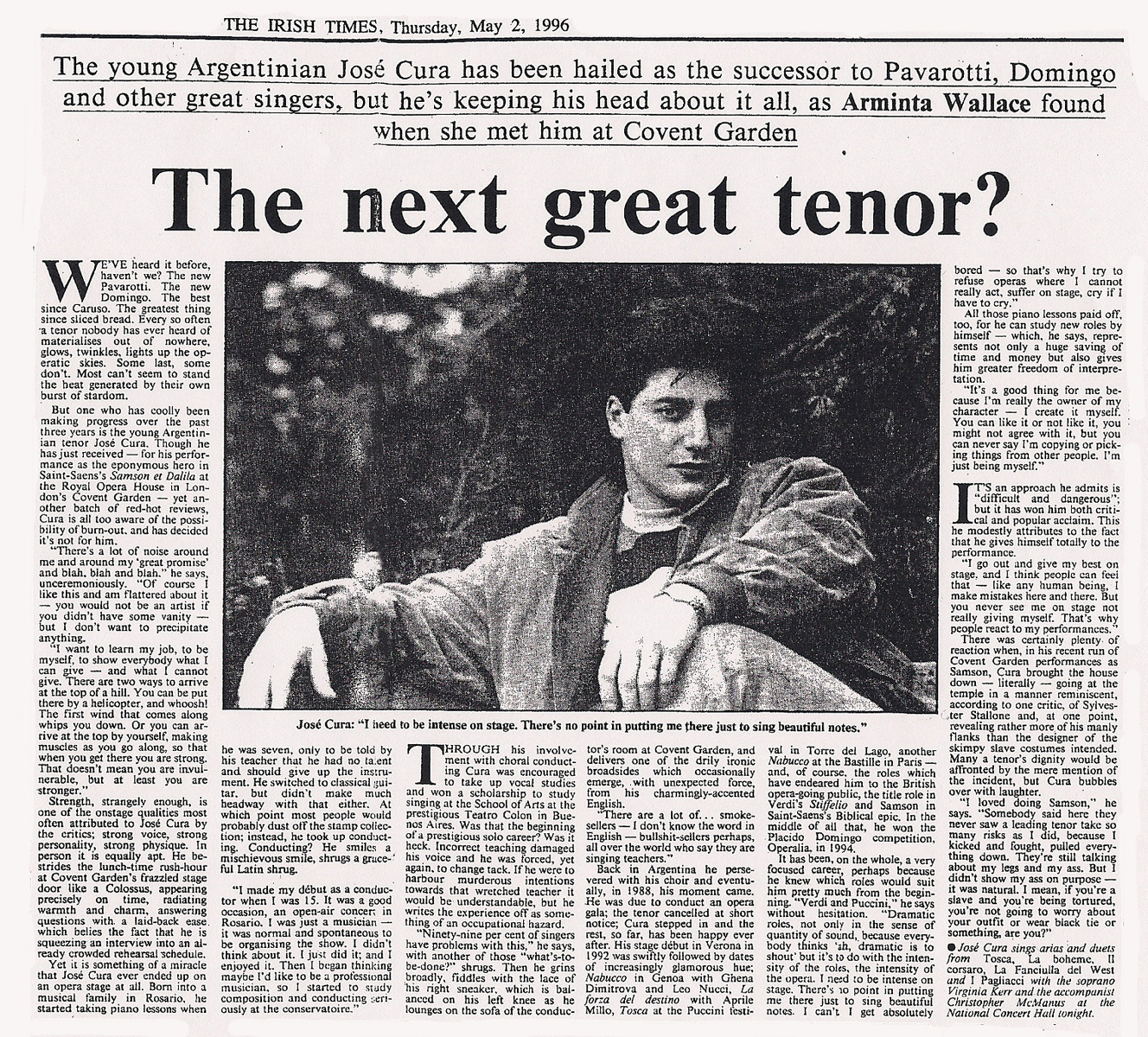Make Room on Olympus Sacred Monsters
(excerpts)
M Gurewitsch
NY Times / 28 May 2000
The epitome of the sacred monster at the moment is
surely the Argentine tenor José Cura, 38. So far, New
Yorkers have seen him just three times, in a single
production, as the Sicilian lothario Turiddu in
Mascagni’s Cavalleria Rusticana, amid the
wreckage of the once picturesque staging by Franco
Zeffirelli, woefully led by Carlo Rizzi and partnered by
the uncongenial Santuzza of Dolora Zajick. Thanks to
Placido Domingo in his capacity as artistic director of
the Washington Opera, audiences in the capital have
taken Mr. Cura’s measure in two of his signature roles:
Saint-Saens’s Samson and Verdi’s Otello.
In the biblical spectacular, he
bore the destiny of the despondent Chosen People on
heroic shoulders, his prophetic song ringing forth with
dark, blazing grandeur. His authority was total. But
his last Washington Otello this spring was an
altogether more daring affair. Of the British stage
idol Edmund Kean, Samuel Coleridge wrote, “To see him
act is like reading Shakespeare by flashes of
lightning,” and so it was with Mr. Cura in Verdi’s
Shakespearean mode.
While still singing in choirs in the
mid-eighties, he devoted himself to composing and
conducting. In 1988, he met maestro Horacio Amauri
who gave him the definitive basis of his singing
technique. José Cura left his native country for Europe
in 1991. He lived in Verona Italy for three years and
then in January 1995, he moved to Paris where he now
resides together with his wife and three children.
Praise or censure? That depends
on your point of view. Between lightning flashes fell
long spells of pitch dark. On prior occasions in
Europe, Mr. Cura had executed the notes with a
scrupulousness that had only boosted his tremendous
conception of the part. This time, rather than sing the
music, he chose to channel the character. Call it
extreme music drama, and sway, if you can, whether it
unfolded through or in spite of the music. Over the
radio or on a recording, it might have sounded
grotesque, but it was hair-raising to be there.
Among those who witnessed Mr.
Cura’s Washington Otello is Barbara cook, the Broadway
star of mid-century who created the roles of Marian the
Librarian in “The Music Man” and Cunegonde in “Candide,”
and continues to wrap audiences around her finger in
cabaret and concert performances. (One prominent London
critic has repeatedly placed her artistry on a par with
that of Callas.)
Unlike critics, whose professional
obligation to endure upward of a hundred evenings of
opera a year many has patently come to regret, Ms. Cook
has the luxury of attending purely as the spirit moves
her. For the last year or so, between engagements of
her own, she has traveled as far a field as Madrid,
Paris and London to keep up with Mr. Cura’s
performances.
Why such devotion? “It’s the
total package,” Ms. Cook said recently. “In any era,
only a very few people are at the pinnacle. I can’t
think of anybody who sings as well, who acts as well,
who moves as well. It’s like watching a great baseball
player who has this terrific masculine grace. Whatever
things might be wrong with José’s performances, he has a
concentration that pulls you right into his world.”
This weekend, viewers in more than
a hundred countries will be tuning in for their Cura fix
in a live telecast of “La Traviata,” spread our over
installments on Saturday and Sunday, and shot in what
are billed as authentic Paris locations. (Cinema verite
meets Masterpiece Theater.) The prima donna is the
hitherto unknown Eteri Gvazava, of Siberia, cast, Mr.
Cura says, after the sort of talent search that produced
Hollywood’s Scarlett O’Hara.
By rights, Verdi’s tragedy of the
fallen woman redeemed by suffering is the soprano’s
opera, but this time it may be the tenor’s. Not that
Alfredo Germont, the romantic but callow bourgeois
papa’s boy who woos Violetta from her life of soulless
pleasure, is the sort of character one associates with
Mr. Cura’s brooding macho presence.
Mr. Cura has admitted as much,
adding: “Alfredo has gotten the greatest courtesan in
Paris to give up everything for him. There must be a
reason.” Americans may decide for themselves in the
fall, when the show is expected to appear on PBS; a
Teldec CD of the soundtrack, conducted by Zubin Mehta,
goes on sale here in July.
To a degree seldom if ever matched
in the annals of opera, Mr. Cura – also a composer and
conductor – marches to his own drum. On “Verismo,” his
latest CD for Erato, he dedicates a whole program to a
style of the late 19th and early 20th
centuries commonly thought vulgar and sensationalistic.
Acting as his own conductor, he sets out to redefine it
as a school of chaste refinement.
In the hit-and-run showstopper,
‘Amor ti vieta,” from Giordano’s dismal “Fedora,” the
delicacy of the phrasing (lines taken in a single breath
alternating with lines of similar length taken in two)
is as unusual as it is natural and discreet. There are
discoveries like this to be made throughout. And
nowhere will you find Mr. Cura clinging, in
self-indulgent spaghetti-tenor fashion, to top notes the
composer actually wrote or did not.
On his very best vocal behavior,
Mr. Cura here gives the lie to those who have said that
he has no technique. What we hear, by contrast, in such
daredevil performances as the Washington “Otello” is a
self-conscious, highly idiosyncratic technique fraught
with peril. How well it will Mr. Cura in the long run
remains to be seen. Self-immolation is not actually
required of sacred monsters, but longevity is not always
their strong suit.
Whatever lies ahead,
Mr. Cura has already earned his place as one of the most
supremely original performers of the age.
'I don't believe that
classical music exists'
Written by Jacek Hawryluk
Translated by Iwona Pomes
'Music can be played in your bathroom as well as in the
opera house.'
Jacek
Hawryluk: In the 90's some famous operatic singers
started to perform in open-air concerts at stadiums.
Mozart, Puccini and Verdi wrote music for opera houses.
Doesn't it contradict each other?
José Cura:
Don't forget that such composers as Mozart, Puccini,
Beethoven or Schubert were treated like today's pop
stars when they lived. Today they are considered to be
inviolable. They wrote music for opera houses for
technical reasons. They didn't know such things as
microphones, screens, etc. If they lived now, they would
write music suitable for open-air concerts.
J. H.: Do
you think they would be happy with these huge stadiums?
J. C.: It
is not a question of satisfaction. Music is everyone's
property. Many people are not able to go to an opera
house. It's just one of the ways of making people
familiar with classical music.
J. H.: Is
there any difference between a theatre and a stadium
when it comes to creating music and an atmosphere?
J. C.: The
atmosphere doesn't have to be different. A charismatic
artist can create it no matter where he or she performs.
J. H.: In
June you played a role in widely televised version of "
Traviata". This year we celebrate 400th
anniversary of opera. Do you think that broadcasting it
on TV will make it more attractive in the XXI century?
J. C.: This
is only one alternative. You can play music in your
bathroom at home as well as in a big opera house. You
can do it for 10 or 10,000 people. This year we
celebrate opera's 400th anniversary. About
50000 of them have been written over the ages, yet how
many operas do we know? Maybe 150 or 250.
J. H.: Do
you know why so many like listening to tenors?
J. C.: Yes,
I do. It's because the romantic roles are always played
by tenors. Baritones are associated with negative
characters; basses- with old persons.
J. H: What
does classical music mean to you?
J. C.: I
don't know why people distinguish popular and classical
music. For me there are only two sorts of music: the
good one and the bad one. Some classical tunes are
awful; some pop songs are wonderful and vice versa. John
Lennon's songs are no worse than those written by
Francis Schubert.
J. H.: Do
you think it's normal that Pavarotti and Domingo sing
together with pop stars?
J. C.:
Everything is all right if we are good. I hate
categorizing. My first photographic album will be
published soon. If you ask me whether it has anything in
common with music, I would say that it does. It's a
music of pictures.
J. H.: Why
do many singers like cooking?
J. C.: We
have creative souls. I hardly know any artist who
doesn't cook. I don't have my own formula. I like
improvisations.
J. H.: What
a pity. You will not give me a recipe.
J. C.: A
good cook can prepare something tasty from anything that
is in his refrigerator.
José Cura
was born in 1962 in Rosario, Argentina. He is a
professional singer, conductor, composer and
photographer. He is considered to be one of the best
young tenors in the world. José Cura and Ewa
Małas-Godlewska have recorded a CD called "Era Of Love".
They gave a concert in the National Opera on November 15th.
The original article was published in "Machina" monthly
magazine in November, 2000.
A Fright at the Opera
Ciara Dwyer
Sunday Independent
2000
A day trip to Italy?
It's well worth the trouble if José Cura is part of the
equation. Confirmed fan Ciara Dwyer had only one grouch
ITALY is a long way to go
for a day, but to see José Cura in an opera it's worth
the trek.
The Argentinian tenor was
singing in Cavalleria Rusticana and Pagliacci.
The minute I heard about the concert I booked my ticket.
I couldn't afford it, but what the hell, didn't I have a
credit card?
I spent hours shouting down
the phone to the box office staff at Florence's Teatro
Communale. Nobody seemed to speak English. I had no
Italian. Still, my Trojan persistence paid off. A day
and a half later, I received a fax confirming that my
ticket was booked.
At first, I didn't tell a
soul that I was going. Too cute to draw the hassle of
real-world finances on myself, I knew that my mother
would taunt me with Preliminary Tax bill reminders. What
cared I for the real world when I was caught up in
over-the-top arias?
Ever since I interviewed
Cura last July, I am a changed woman. BarraO Tuama,
Cura's impresario, thought that I was smitten by José.
And indeed I was. But that was just the tip of the
iceberg. I became opera-mad.
Back in Dublin I bought
every book that exists on opera: Bluff Your Way in
Opera; Opera A Beginner's Guide, complete with cartoons
of Pavarotti. No tome was too heavy or too expensive.
One Sunday afternoon, the sort of day when most couples
are romantically sauntering down Dawson Street, I left
Hodges Figgis on a high. I had just picked up the last
available copy of an encyclopaedia of opera. I looked at
the colour photos, found one of Cura in Cavalleria, and
that was that. I had to go.
But my opera obsession goes
way beyond Cura. Every week I visit the classical
section of HMV and buy CDs complete with the librettos.
I now spend most Saturday nights sitting up on my bed,
headphones on, rocking to the music and reading the
librettos in Italian. It is a tricky process but well
worth it when you hear some of the lines. In Cavalleria,
Turiddu serenades his lover Lola: "If I were to go to
paradise and you were not there, I wouldn't stay." I sit
in my flannel pyjamas longing for the day that a man
will say such things to me.
NOW my life is measured out
in Cura concerts: Il Trovatore in Madrid; Otello in
Covent Garden; Aida in Athens. I plan to go to the lot.
I even joined his fan-club. So of course I was ready to
fly to Florence.
It took two flights to get
to Florence. I got there at midnight on the Saturday
night. The taxi driver from the airport spoke no
English, but it didn't matter. I love Italians. The man
was only driving the taxi and already I was falling for
everything Florentine.
His aftershave wafted
around the taxi. Delicious. I spotted his silver
identity bracelet and smiled. Driving the taxi looked
like something he did in between romancing all those
women. It was just a hunch I had.
On the Sunday morning I
woke early, worse than a kid on Christmas day. I
wondered if Cura was in the country or was he flying in
that morning. The anticipation of seeing him on stage
was almost too much: that self-assured stride of his;
the smile that he flashes at the audience; the muscles
in his voice.
The opera was on that
afternoon. To distract myself during the long wait I
decided to do the tourist trail: Michelangelo's statue
of David; market stalls brimful of Florentine scarves.
Here was my chance to dress like Sophia Loren. Oddly, I
had no interest. My mind was preoccupied. Every 20
minutes I would look at my watch. Would Cura be arriving
at the theatre? Would he be warming up with the
orchestra? Or would he be doing opera-singer things like
gargling with TCP? Florence was wasted on me. I couldn't
wait to get to the opera.
At lunch time I went back
to my hotel to shower and change. Normally I am thrown
together, but this time I had put thought into my
clothes. My plan was to be subtle and classy. I had
chosen a navy velvet dress, a matching coat and
carefully selected earrings. I put my libretto in my bag
and headed off.
At the Teatro, the ticket
queue was full of well-groomed Italians women with pearl
necklaces, men in exquisitely cut suits. I picked up my
ticket and made my way in. I was 40 minutes early. I
checked out my seat. Had a drink at the bar. Then headed
for the loo for the hundredth time that day. The
excitement was too much.
Eventually the lights went
down. The audience were instructed to turn off their
mobiles. The opera was about to begin. The conductor
made his entrance and began the overture.
THE music was so beautiful.
And I was so happy to be there. I knew that I had done
the right thing. I didn't want to be anywhere else in
the world. Nothing moves the soul like music. Seconds
into the overture, I was crying tears of happiness. The
first aria is sung off-stage by Turiddu (Cura's part).
The minute I heard the voice, I felt uneasy. It didn't
sound like Cura. But maybe that was just because it was
coming from off-stage. I dispelled the doubt.
Another few lines and I
still didn't recognise Cura's voice. Where was that
baritonal quality of his? I was a little worried. But, I
told myself, his name was on the poster outside. Of
course it was him. I sat back and relaxed. Turiddu
wasn't to appear on stage until well into the first act.
I knew the opera backwards.
The set was very beautiful.
The chorus were busy going to church and creating a
village life. It was near the time where Turiddu
appears.
On he came. A squat five
foot nothing of a man with a pot belly. As he walked, he
did so in two parts. His stomach went first and minutes
later the rest of his body caught up. He looked like he
enjoyed his grub. I could almost see the stretch marks
through his white shirt. He had widely-set frog eyes. He
looked a little like Ernest Borgnine. He was no José
Cura. If you didn't laugh, you'd cry.
IF you have never seen a
photo of Cura, you will not understand the full extent
of my tragedy. Cura used to be a body builder. When he
walks onto the stage, he owns it. As he sings, Cura is
full of dramatic feeling. The man is magnificent. A
Greek god. So where the hell was he?
The story of Cavalleria
Rusticana is that Turiddu is the love object. Two
women Santuzza and Lola are clamouring for him. With
Cura as the lead, all that would have made sense. But my
fat frog-eyed puddin', tottering around the stage, made
a mockery of the plot. Oh, yeah, and I think he was
balding too.
At the interval, I asked
the usher about Cura. It had dawned on me that he might
have been sick, that maybe I was watching his stand-in.
But to be honest, I was more concerned with my trekking
all the way to Florence for a day. Instead of a handsome
prince I got to see a pudgy frog. The usher explained
that Cura was finished doing the role. I had missed him
by a matter of days.
It was spilt milk. What
could I do? I sat through the second opera sighing at my
folly.
This is not the first time
I have travelled just to see a beautiful man on stage.
Flying to Florence was a long way to see no José. Maybe
next time I'll travel with the fan club.
JOSÉ CURA
4th and
5th of August 2000
(temple of Jupiter)
Singer,
composer and conductor, José Cura is considered as one
of the most complete artists of the new generation.
His
Lebanese origin: his great-grand father, Chalita El
Khouri was born in Knet (north Lebanon) in 1874 and his
great grand mother, Teresa Bou Saada was born in Zgharta
in 1881. They arrived in Argentina in 1900.
Since his
debut in the role of Jan in Bibalo’s Fraulein Julie,
his career has taken him to the highest spheres of
the international operatic circuit and to the acclaim
from critics all over the world.
José Cura
was born in Rosario, Santa Fe, Argentina on December 5,
1962. He began his musical formation as a
guitarist under the guidance of maestro Juan di Lorenzo.
At the age of 15 he debuted as a choral conductor. At
16, still in Rosario, he began studying composition with
maestro Carlos Castro and piano with Zulma Cabrera.
In 1982
José Cura entered the School of Arts of the National
University of Rosario in order to develop his knowledge
of orchestra conducting and composition. The following
year, Cura became the assistant to the choir master of
the National University of the Rosario Choir. It
was the choir master, who was also the head of the
conservatory, who convinced Cura to begin studying vocal
technique.
While still
singing in choirs in the mid-eighties, he devoted
himself to composing and conducting. In 1988, he met
maestro Horacio Amauri who gave him the definitive basis
of his singing technique. José Cura left his native
country for Europe in 1991. He lived in Verona Italy for
three years and then in January 1995, he moved to Paris
where he now resides together with his wife and three
children.
In 1992 in
Milan, he met tenor Vittorio Terranova, who has been his
teacher since then and who helped him to master Italian
operatic style. His first professional appearance took
place in an open air concert in Genoa in 1991. In
February 1992, Cura made his stage debut in Verona as
the Father in Henze’s Pollicino . He subsequently
appeared in Genoa as Remendado in Carmen and
Capitano dei Ballestrieri in Simon Boccanegra.
These are the only two "comprimario" roles of his career
so far. Jan in Faulein Julie in March 1993 in
Trieste, was his first major role. In December 1993 he
came to special attention in Turin in Janacek’s
Makropulos Case. Ismaele in Nabucco in
Genoa in January 1994, was his first role in a standard
repertoire opera. After La Forza del Destino in
Turin in February 1994, he sang Ruggero in the world
première of the third version of Puccini’s La Rondine
and in the summer of the same year sang in Martina
Franca in Le Villi, Puccini’s first, rarely
performed opera.
In
September 1994 José Cura won the International
Operalia Competition.
Soon after, he made his
United States debut in Chicago singing Loris Ipanoff in
Giordano’s Fedora. After a Gala Concert in the
Teatro Colon of Buenos Aires, December 1994, he returned
to Italy to sing Paolo il Bello in Zandonai’s
Fancesca da Rimini in Palermo and Fedora in Trieste.
In June 1995, he made his London debut singing the title
role in Stiffelio for the opening night of the
Verdi Festival at the Royal Opera House, Covent Garden.
In July 1995, he sang his first Cavaradossi in
Tosca at the Puccini Festival of Torre del Lago
and in September of the same year he made his debut at
the Opera Bastille, singing Ismaele in a new production
of Nabucco. After Fedora in London and
Mascagni’s very rarely performed Iris for the
opening night of the season at the Rome Opera in January
1996. On the 30th of the same month he sang
for the first time the role of Samson in Samson et
Dalila at the Royal Opera House, Covent Garden. For
his Los Angeles and San Francisco debuts in 1996, he
added two new roles to his repertory, Pollione in
Norma and Don José in Carmen.
Following
Il Corsaro in Turin and Tosca in
London in May 1996, he performed in Melbourne and Sydney
the show "The Puccini Spectacular": 250 artists on stage
for three hours of music, theatre and fireworks
comprising excerpts from the most popular operas of the
Italian composer and specially created for his debut in
Australia. In December 1996, he recorded the BBC
documentary "Great Composers" co-starring Julia Migenes
and Leontina Vaduva. The first episode, devoted to
Giacomo Puccini, was transmitted in December 1997. On
December 22nd, 1996 the Italian TV RAI
transmitted Liliana Cavani’s stage production of
Cavalleria Rusticana starring Waltraud Meier and
José Cura and conducted by Riccardo Muti. The production
was recorded during his debut in the role of Turiddu at
the 1996 Ravenna Festival. Three days later his debut in
I Pagliacci was transmitted on Eurovision live
from Amsterdam’s Concertgebouw. José Cura made his debut
at the Teatro Alla Scala di Milano with Ponchielli’s
La Gioconda, in January 1997. Following his debut in
the title of Otello with the Berlin Philharmonic
Orchestra under Claudio Abbado in May 1997, the
important national newspaper La Nazione headlined
"José Cura : a new Otello is born" and with this
probably best summarized the unanimous praise for the
Argentinian tenor’s assumption of this most testing
role. In June 1997, José Cura received the
Italian Music Critics’ Abbiati award in Italy in the
Category of male singer for his performances in Iris
in Rome, Cavalleria Rusticana in Ravenna, and
Il Corsaro in Turin.
After an
enormously successful Gala Concert in Dublin for
approximately 5000 people he sang Fedora in Lecce
for the 50th anniversary of Umberto
Giordano’s death. On the 22nd of April 1998
he sang Radames in Aida for the official
re-opening of the legendary Teatro Massimo di Palermo .
Recent debuts are
: Opera de Marseille with Don Alvaro in La Forza del
Destino and Des Grieux in Manon Lascaut at La
Scala di Milano.
During
his last German tour in July, he did not only sang but,
for the first time in the history of modern opera, he
also conducted while singing. His recent appearance in
Amsterdam’s Prinsengracht Concert in-front of
20.000 people has also been a big TV event with an
audience of more than 800.000 following-broadcast the
last 22nd of August.
In
coincidence with the release of his recording of
Saint-Saens’ Samson et Dalila, he has done his debut in
Washington on the 10th of November 1998
singing the title role of that opera and on the 25th
of December he sang Luigi in Il Tabarro in a TV
and radio live broadcast from Amsterdam’s Concertgebouw.
After La Forza del Destino, Milano Teatro alla
Scala, February 1999 and his first Andrea Chenier
Zurich, March 1999, he did his home debut in Buenos
Aires, Teatro Colon, with Otello and his
Metropolitan Opera House debut with Cavalleria
Rusticana for the Last Opening Night of the Century
on the 27th of September.
Last
summer, he opened the Arena di Verona Festival with a
new production of Aida which was live broadcasted
on world TV and, for the first time in the history of
opera and transmitted on Internet.
Last
October he sang Otello for his first time ever in
Spain. In December 99, he opened Palermo’s season, also
with Otello. In March 2000, a great event is
marking his career: Placido Domingo, the last of the
greatest Otello, is conducting him in this Verdi
opera in Washington.
1999
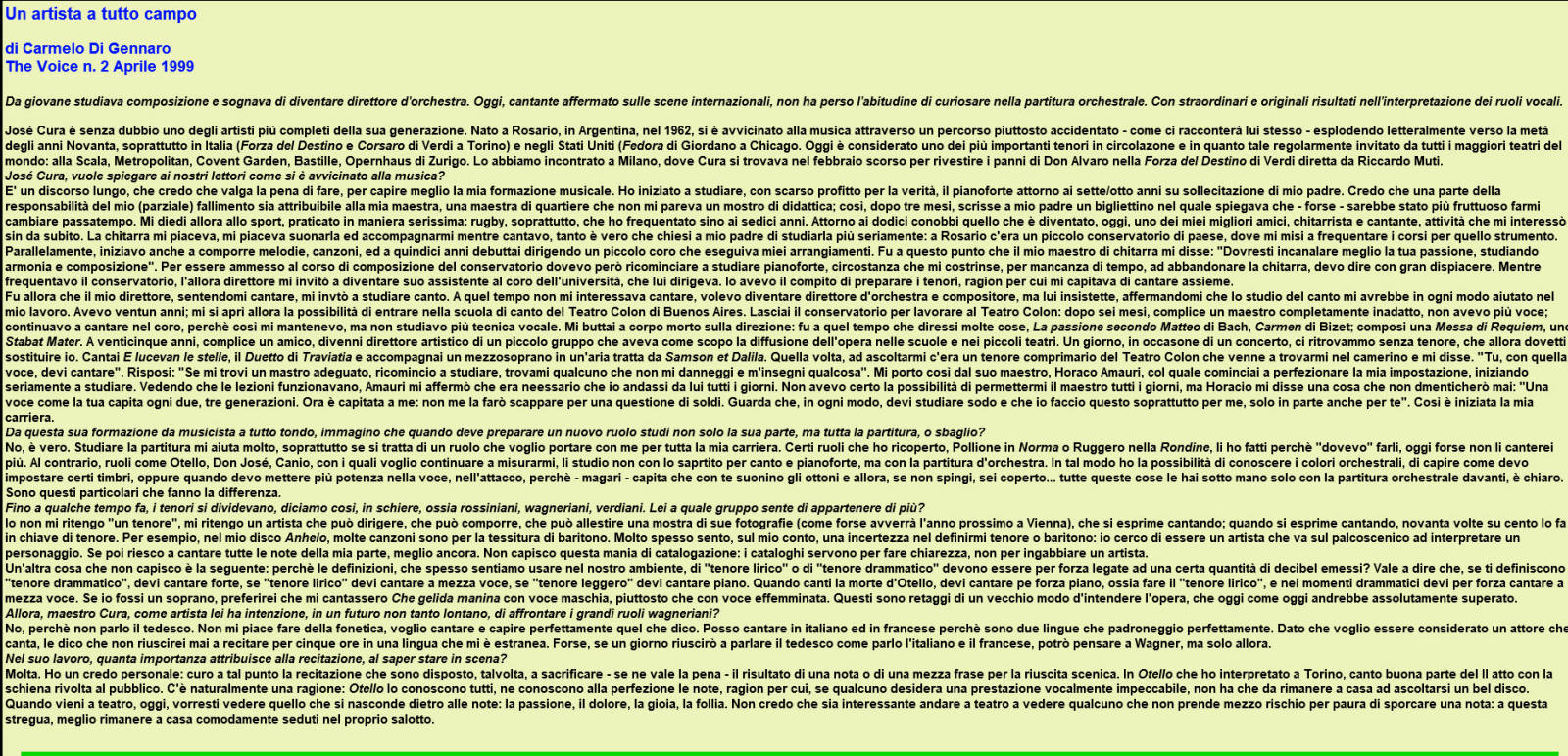
|
Note: This is a machine-based translation. We offer
it only a a general guide but it should not
be considered definitive.
An All-Round Artist
The Voice
Carmelo Di Gennaro
2 April 1999
As
a young man he studied composition and dreamed of becoming a conductor.
Today, an established singer on international stages, he has not
lost the habit of browsing through the orchestral score—with extraordinary
and original results in the interpretation of vocal roles.
José Cura is undoubtedly one of the most complete artists of his
generation. Born in Rosario, Argentina, in 1962, he approached music
through a rather bumpy path—as he himself tells us—literally exploding
in the mid-Nineties, especially in Italy (Verdi’s La forza
del destino and Il Corsaro) and in the
United States (Giordano's Fedora in Chicago).
Today he is considered one of the most important tenors in circulation
and as such is regularly invited by all the major theaters in the
world: La Scala, Metropolitan, Covent Garden, Bastille, Opernhaus
Zurich. We met in Milan, where Cura was in February to play the
role of Don Alvaro in La forza del destino conducted
by Riccardo Muti.
Q: José Cura, would you like to explain to our readers how
you came to music?
It's a long speech, which I think is worth making, to better
understand my musical training. I began to study, in truth with
little profit, the piano around the age of seven or eight at the
urging of my father. I think that part of the responsibility for
my own (partial) failure is attributable to my teacher, a neighborhood
teacher who did not seem a teaching prodigy; so, after three months,
he wrote my father a note in which he explained that—perhaps—it
would be more fruitful for me to change my hobby. I then immersed
myself in sport, practiced in a very serious way, primarily rugby,
which I played until the age of sixteen. Around the age of twelve
I met someone who has become, today, one of my best friends, a guitarist
and singer, activities that interested me from the beginning. I
liked the guitar. I liked to play it and accompany myself while
I sang, so much so that I asked my father to allow me to study it
more seriously. In Rosario there was a small conservatory, where
I started attending classes for that instrument. At the same time,
I also started to compose melodies and songs, and at fifteen I made
my debut conducting a small choir that performed my arrangements.
It was at this point that my guitar teacher said to me, "You
should channel your passion better, studying harmony and composition."
To be admitted to the composition course of the conservatory, however,
I had to start studying piano again, a circumstance that forced
me, for lack of time, to abandon the guitar, I must say with great
regret. While attending the conservatory, the then director invited
me to become his assistant to the University Choir, which he directed.
I was in charge of preparing the tenors, which is why I happened
to be singing with them.
It was then that my director, hearing me sing, invited me to study
singing. At that time I was not interested in singing. I wanted
to become a conductor and composer but he insisted that the study
of singing would in every way help me in my work. I was twenty-one
years old. Then I was given the opportunity to enter the singing
school at Teatro Colón in Buenos Aires. I left the conservatory
to work at Teatro Colón: after six months, thanks to a completely
unsuitable teacher, I had no voice. I kept singing in the choir,
because that was how I supported myself, but I no longer studied
vocal technique. I threw myself into conducting: it was at that
time that I conducted many things, Bach’s St Matthew Passion,
Bizet’s Carmen. I composed a Requiem mass, a Stabat
Mater. At the age of twenty-five, with a friend, I became the artistic
director of a small group that aimed to spread the work in schools
and small theaters. One day, during a concert, we found ourselves
without tenor, which I then had to replace. I sang E lucevan
le stelle, the duet from La traviata, and accompanied
a mezzo-soprano in an aria taken from Samson et Dalila.
At that time, listening to me was a comprimario tenor from Teatro
Colón who came to see me in the dressing room and said to me. "You,
with that voice, must sing." I replied, "If you find me
a suitable teacher, I'll start studying again. Find me someone
who won't hurt me and who will teach me something." So
I went to his teacher, Horacio Amauri, with whom I began to refine
my approach, starting serious study. Seeing that the lessons were
working, Amauri told me that it was necessary for me to come to
him every day. I certainly couldn’t afford to see a teacher so often
but Horacio told me something that I will never forget: "A
voice like yours happens every two, three generations. Now it happened
to me: I won’t let it go for a matter of money. Look, in any case,
you have to study hard and I am doing this especially for me, only
partly for you, too." That’s how my career began.
Q: From your training as an all-round musician, I imagine
that when you have to prepare a new role you study not only his
part, but the whole score. Am I wrong?
No, it's true. Studying the score helps me a lot, especially
if it is a role that I want to carry with me throughout my career.
Certain roles that I’ve performed, Pollione in Norma
or Ruggero in La rondine, I’ve done because "I
had to" do them. Today I might not sing them again. On
the contrary, roles such as Otello, Don José, Canio, those with
whom I want to continue to measure myself, I study them not with
the score for singing and piano, but with the orchestra score. In
this way I have the chance to get to know the orchestral colors,
to understand how I have to set up some timbres, or when I have
to put more power into the voice, into the attack, because—for example—it
happens that the brass sounds with you, and then, if you don't
push, you're covered... all these things you have in hand only
with the orchestral score in front of you, it's clear. It is
these details that make the difference.
Q: Until recently, tenors were divided, so to speak, into
groups such as Rossinians, Wagnerians, Verdians. In which
group do you feel you belong?
I do not consider myself "a tenor." I consider myself
an artist who can conduct, who can compose, who can set up an exhibition
of his photographs (as perhaps will happen next year in Vienna),
who expresses himself singing. When he expresses himself singing,
ninety times out of a hundred he does it in a tenor key. For example,
in my record Anhelo, many songs are in the tessitura
of a baritone. Very often I feel, on my account, an uncertainty
in defining myself as a tenor or baritone: I try to be an artist
who goes on stage to play a character. If I can sing all the notes
of my part, even better. I do not understand this mania for cataloging:
catalogs are for clarity, not for caging an artist.
Another thing I do not understand is the following: why must the
definitions, which we often hear used in our environment, of "lyric
tenor" or "dramatic tenor" necessarily have to be
related to the certain amount of decibels emitted? That is to say,
if they call you "dramatic tenor," you have to sing loudly,
if "lyrical tenor" you have to sing half-voice, if "light
tenor" you have to sing softly. When you sing the death of
Otello, you have to sing softly, that is, to be the "lyrical
tenor," and in dramatic moments you have to sing half-voice.
If I were a soprano, I'd prefer Che gelida manina sung
with a male voice rather than an effeminate one. These are the legacy
of an old way of understanding opera, which today should absolutely
be overcome.
Q: So, Maestro Cura, as an artist do you intend, in the not so distant
future, to face the great Wagnerian roles?
No, because I don't speak German. I don't like doing phonetics,
I want to sing and understand perfectly what I'm saying. I can
sing in Italian and French because they are two languages that I
perfectly mastered. Since I want to be considered an actor who sings,
I can tell you that I would never be able to act for five hours
in a language that is foreign to me. Perhaps, if one day I can speak
German as I speak Italian and French, I will be able to think of
Wagner, but only then.
Q: In your work, how much importance do you attach to acting, to
being on stage?
A lot. I have a personal belief: I care for the acting to the extent
that I am willing, sometimes, to sacrifice—if it is worth it—the
result of a note or a half sentence for the stage success. In the
Otello I performed in Turin, I sing a good part of the second act
with my back to the audience. There is of course a reason: everyone
knows Otello, they know his notes perfectly, so if someone wants
a vocally impeccable performance, he has only to stay at home to
listen to a beautiful record. When you come to the theater today,
you would like to see what is hidden behind the notes: passion,
pain, joy, madness. I don’t think it is interesting to go to the
theater to see someone who does not take half a risk for fear of
soiling a note. At this point, it is better to stay at home
comfortably sitting in your living room.
|
Fistful of Tenors
The
Irish Times
6
March 1999
Arminta Wallace
A fistful of tenors: Who will be the next ‘big three’?
As the Argentinian singer José Cura returns to Ireland
for the third time, Arminta Wallace finds out who’s
making the most noise in the international tenor stakes.
(excerpts)
Saturday night at the Bastille Opera in Paris, and it’s
show time. Inside the concrete foyer the middle classes
mill about, programmes in hand; outside, Japanese
tourists wearing optimistic smiles and hand-written
“Cherche Billets” signs brave the sharp air of late
maximum chic, and the place is packed to the doors. For
a visiting Paddy, the excitement is palpable-on the
opera thermometer, a new production of Carmen at
one of Europe’s major opera houses has to rate somewhere
between “overheated” and “feverish”.
The moment the curtain rises, however, it becomes
apparent that this production is never going to make it
into the annals of theatre history. We peer in dismay as
interminable chorus lines dressed in 40 shades of brown
repeatedly skip back and forth across a dimly-lit stage.
We fidget discreetly to keep ourselves awake, and are
just beginning to long for a few mantillas and a red
flounce or two when, mid-way through the second act, and
miracle occurs. Carmen’s lover Don José, sung by the
Argentinian tenor José Cura, has taken center stage to
sing La Fleur Que Tu M’avais Jetee – which,
thanks to the seamless beauty of its melody and its
extraordinary pianissimo finish, has become a showpiece
aria. The moment he begins to sing, a profound silence
settles on the audience. All fidgeting ceases. By the
time he reaches the final, anguished “je t’aime”,
Carmen’s is probably the only dry eye in the house. It’s
a miracle, all right – the miracle of a top class tenor
in action.
A beautiful, effortlessly powerful voice; a lithe,
panther-like grace on stage; a commitment to the part so
total that when we go backstage to congratulate him on
his performance, Cura -- though he is, as always, the
epitome of hospitality and charm –- appears drained to
the point of exhaustion. This is what it’s like at the
top of the opera ladder. The rewards are great: so are
the pitfalls. For every tenor who makes it to the top
rung, dozens get stuck on the lower reaches, or fall off
altogether.
But has Cura made it to the very top? And if so, is he
alone there, of is there a plethora of pretenders to the
tenor crown? Over the next few years, will we see the
emergence of “a new three tenors” to replace the unholy
trinity of Domingo, Carreras and Pavarotti, mostly
retired from active service after long and stunningly
successful careers – or is the whole idea just an
outdated marketing notion which will be quietly allowed
to drop by a new generation of intelligent, clued-in
singers? Neil Dalrymple, and agent with the London-based
Music International, has no hesitation in placing José
Cura in the first rank of today’s tenors, along with the
Sicilian-born Roberto Alagna and new boy on the block
Marcelo Alvarez. Below those three, he says, there’s a
major jump downwards to the next level, where he picks
out the Americans Jerry Hadley and Richard Leech, a
Canadian helden-tenor by the name of Richard Margison,
and the Hispanic bel canto trio of Raman Vargas, Luis
Lima and Tito Beltran.
[…]
The Latin American countries are also producing
beautiful, well-trained voices. Cesar Hernandez, from
Puerto Rico, looks a bit like Domingo and has that sort
of sound, and Octavio Arevalo, a young Mexican who just
sang Nemorino for us, will probably be singing at the
Met next season.” Another company which has always
prided itself on nurturing young voices is Welsh
National opera. Isabel Murphy, director of opera
planning at WNO, says her top three tenors would be the
British tenor Ian Bostridge, Roberto Alagna and the
Argentinian Marcelo Alvarez, who recorded his debut CD,
Bel Canto, with WNO last year. “There are some very
interesting young British tenors, too – people like Paul
Charles Clarke who also sings at the Met and around
Europe, or the Welsh singer Gwyn Hughes Jones. Another
exciting British tenor to come on the scene is John
Daszak, who is singing Peter Grimes in our new
production, and has also been booked to do the role at
La Scala in the year 2000.” Such is the perspective from
the opera house. But what about when you walk into a
record shop in search of tenors on disc? Alan Blyth, a
specialist opera reviewer with Gramophone magazine, says
José Cura would be his number one, followed by Roberto
Alagna and Marcelo Alvarez.
“Cura is a very good Samson, as good as we’ve had for
many years, and the performances on his Puccini
Arias disc were very fine...”
[Jonathan Peter] Kenny is himself a tenor buff, with a
considerable collection of historical recordings and a
soft spot for Pavarotti. “He really is wonderful. Of
course he’s such a megastar, he can’t really come on in
an opera without playing the part of Pavarotti – But
he’s still a great singer.
“I first went to see José Cura in Stiffelio
at Covent Garden. It was fantastic. I’d never heard of
him, but he reminded me at once of Giacomo Lauri-Volpi –
it was the vibrato, I think, and also the baritonal
sound which suddenly surprises you by being able to
surge upwards. I like his singing very much – I think
it’s very honest and open and from the heart. Even from
his discs he comes across as a very sincere and truthful
performer.”
“There are far more openings for tenors that for any
other voice in the profession,” says Kenny. “There are
fewer tenors around, and so there are lots of great
roles. But it’s a dangerous profession, being a tenor.
You have to sing in big theatres, before huge audiences,
you have to make a big should and project your voice all
the time. You’ve got to produce the top notes. The money
notes, they call them. But you’ve also got to be careful
because if you spend all your money notes at the
beginning of you career . . ."
It’s a sentence which hardly bears finishing.
And he's not a bad singer. . . . .
José Cura's good looks are the latest weapon in the
battle to create the next generation of male opera
stars.
The Independent
Anna Picard
05 September 1999
It all started with a woman, a cello and a
chaise-longue: Ofra Harnoy and her instrument locked in
an embrace so intimate, so satisfied, that only the
post-coital cigarettes were missing. Classical music
took longer than most industries to acknowledge the
pulling power of pheromones, but in 1990 - more than 20
years after Jimi Hendrix's Electric Ladyland - it shed
the white tie and started to run, naked, through the
wild woods of mass marketing. From Anne-Sophie Mutter's
bare shoulders to the panda eyes of the Medieval Baebes,
this was the era of the divas.
But what about the men? We had Kennedy's squiggle-like
name-changes and his spiky hair. Simon Rattle had a kind
of hippie chic with his Jackson Five coiffure. But the
singers were lagging behind in the image race - wide of
girth, stiff of stature and woefully straight of dress.
It took a World Cup and a long top B to launch Mr Big
into mass appeal, but Pavarotti took two of his mates
with him. The Three Tenors were (briefly) the Spice
Girls of opera, but even football couldn't really do it
for the primo uomo and sales started to fall again. So
what was left? Sex. It had worked for the girls, after
all.
Italy gave us Andrea Bocelli, the soft-voiced, blind
romantic, and pretty- boy Alagna; but he's very, very
married (to soprano Angela Georghiu) and not terribly
tall. Both Italians are said to stir up "maternal
feelings"; but where do you find an opera singer with a
six-pack? Argentina. José Cura, tall, dark and handsome,
a youthful 36 years, a body-builder, a Latin smoothie to
challenge even Antonio Banderas, all the usual interests
(likes football), GSOH (gives bitchy soundbites about
his competitors), tenor, conductor and composer. Cura,
strong of voice, talent and looks, is a miracle drug for
the ailing industry and, according to some, he knows it.
Soon, there will be no getting away from Cura. Next
month he is the subject of a South Bank Show, and
Verismo, his third solo album, a collection of
19th-century Italian tenor standards, is set to be
heavily marketed. Cura's press pack comes complete with
a glossy photo, head inclined downwards like the generic
haircut pictures in a thousand provincial barbershops,
designer stubble, a wolfish grin, and more styling gel
than Ross Geller circa 1995.
But is he sexy? This may seem irrelevant. Surely the
question is "Can he sing?" and yes, he can, but a few
calls to people in various areas of the classical music
industry confirmed that I, my female friends, my gay
male friends and probably my mum too may be the target
audience for tenors.
Traditionally the marketing wisdom has been that women
buy books and men buy CDs. The trouble with classical
music is the repetition of core repertoire, which is
usually already covered in its audience's record
collection. How do you persuade even the most die-hard
opera lover to buy yet another recital disc?
Neil Evans, editor of Classic CD, finds the push for a
new three tenors, or even a fourth one, every
interesting. "I think they're trying to look at a new
market," he says. "Whether it's there or not is
debatable but from the interviews I've seen and from how
they're pushing him, they are big on the macho, moody
figure. Bocelli, Alagna and Cura are certainly being
marketed in terms of mass appeal, in a sexual, romantic
way. There's always been the Mario Lanza type, the
popular light tenor - but Cura is more Clint Eastwood.
"The thing with Cura is he's quite able to acquit
himself with serious opera aficionados as well. I'm a
fan, I'm afraid. I don't feel with him that the
marketing is outstripping his abilities, which you do
get with a lot of musicians. At the end of the day,
whether it's classical music or any other market, the
product has to be good. With José Cura you've got a
genuine talent who combines compelling acting skills, a
wonderful voice and just happens to be highly
marketable."
The record companies admit that good looks help. "Who
would you rather have sing to you?" asked Talia Hull of
Warner Brothers, quite reasonably. But Warner Brothers
and EMI (the company of both Alagna and the pale-
and-interesting Ian Bostridge) deny a conscious move to
hype up the sexiness of their tenors - to women or men.
Bostridge, the most heavily promoted of the young
English tenors, is a curious alternative to the more
obvious va-va-voom of the Latin lover. His career is
built principally on Lieder recitals and relatively
little operatic exposure, so Bostridge's profile has had
to be set in a different niche. EMI's response has been
to have Bostridge loitering diffidently in black
turtle-necks, like an academic Hugh Grant. The company's
uncharacteristically cautious comment on this departure
from glitz and glamour was that Bostridge has "quite a
few female fans".
EMI was recently featured in Private Eye over the
homoerotic photographs of scantily clad "pretty young
things" from its press department that it used to
illustrate Szymanowski's King Roger. But
Theo Lap, EMI's head of marketing, says he is
uninterested in chasing the pink pound. "I don't think
it's necessary. The gay audience and the gay population
will already have a natural interest in classical music.
They always have done, so they're even easier to reach
than other groups. It would be money wasted."
So that's that then? Not according to one record
industry executive, who wished to remain nameless but
who reminded me of the high-camp photo- story that
Vanity Fair ran way back in February 1995 to coincide
with Farinelli, the ultimate castration-anxiety movie.
Six male altos (Chance, Asawa, Gall, Ragin, Minter and
Daniels) were presented in full 18th- century
maquillage, draped across crushed velvet, luxuriantly
lit and photographed by Pascal Chevallier, with the (we
hope) tongue-in-cheek title "The High Boys of Opera".
"It's definitely there in the counter-tenor market," my
source told me. "The packaging of Andreas Scholl's
Heroes CD is disgraceful! You don't need this. Decca is
up to something, and I think it will rebound." Aside
from the allegedly camp portraiture of the (happily
married and stolidly butch) Scholl, the executive
believes that ladies of a certain age are the main
target - 36-plus and Italian-American.
"The men are the thing at the moment," he went on. "In
the 1960s it was the sopranos. These days, basses are
out of it, so it's baritones, which means Dmitri
Hvortovorsky who, if you look at his Phillips covers, is
marketed as the yummy side of Russia, Bryn Terfel - your
original Green Man - and tenors. Tenors have always been
sold on their charm, particularly their Latinate charm.
I don't think anyone tried to sell Pavarotti or Domingo
as sex objects; but women melt when they meet them, they
really do. Alagna is interesting because EMI have tried
to market him-plus-Georghiu as love's young dream. I
think there has definitely been a conscious attempt at
that." So Roberto and Angela are the Tom and Nicole of
opera. What about Cura - does he have what it takes? "Oh
absolutely: (a) he's a very good tenor and (b) he's a
really good musician. Of the younger tenors he is by far
the most complete."
Things bode well for Cura. He has been steadily working
for more than 15 years, and his live performances have
consistently been acclaimed. In addition to the high Cs
he is a competent conductor and a rather good
orchestrator and composer. "It's not Hollywood! I wasn't
discovered overnight in a pizza restaurant!" he snapped
once with a none-too-subtle dig at Alagna's starry-eyed
story. Verismo - operatic for "sh-- happens" - will
probably be that rare beast: a popular success that has
critical backing too.
Though Rodney Milnes of Opera magazine says he finds
Cura's vanity astonishing - referring to his alleged
habit of presenting only his left profile to the camera
- he admits he's "a bloody good singer". Milnes is
unconvinced that the phenomenon of the Three Tenors can
or should ever be repeated. "I don't think it's all that
operatic, honestly. The failure of Turandot at Wembley
proved that. They are two different markets. They're
selling records but they're not necessarily doing the
art of opera any good. Cura is the strongest candidate
for the fourth tenor if there has to be one, because
he's a very good singer. If he does have sex appeal,
then you can't blame the record companies for selling
him that way. He knows it." "There is a definite push
with operatic stuff to appeal to people who want to buy
in a bit of culture, the nouveau riche, the women who
want to buy a little bit of culture for their house,"
added the executive.
José Cura makes his debut at the Met this month
Opera
Rhoda
Koenig
1999
Clutching the air, raging, heartbroken, Otello roars,
“Clamori e canti di battaglia, addio!” and the chic
London audience roars back its rapture. When the
concert performance ends, some of them don’t go home.
Worshipful women of three generation, clutching roses
and photographs (one grandmother is wearing a portrait
on a chain around her neck), wait outside the stage door
for José Cura, a prime slice of Argentine beefcake who
has been wowing the ladies whenever he appears. He
sings all right, too. Even if all you know of opera is
Pavarotti’s singing “Nessun dorma,” you can hear the
difference in the first three notes of Cura’s recording
on his CD of Puccini arias. Instead of a stentorian
declaration, his version is a dark-chocolate
anti-lullaby, the R rolled with a promise and a
threat.
Having triumphed at La Scala and Covent Garden, Cura,
36, will make his Metropolitan Opera debut this month in
Cavalleria rusticana. “It’s a story that could
happen even today,” the tenor says of this tale of
guilty love and bloody vengeance. “Samson, for
instance, [a role Cura has performed and recorded to
acclaim] dies, but he has a victory. But for Turiddu,
there is nothing. This is a really tragic opera.”
Unlike the typical penguin statue in a concert opera,
Cura throws himself into the part – and, of course, does
so even more in a full-dress performance. “To be a
player it is very important to have had a difficult
past. Because then when you have to portray these kind
of human disgraces, you know exactly what you are
talking about.”
Cura’s past was cushy to begin with – he was born into a
wealthy family in Rosario – but when he was eleven, he
and his father were badly injured in a car accident.
The political upheavals of the seventies swept away the
family money and security. But Cura was always
determined to pursue a career in music, at first
composing and conducting. (He continues to do both.
“When I sing I love to perform Verdi, Bellini, Puccini,
but when I write I prefer more contrapuntal music, like
Bach, or satire, like Erik Satie.”)
Though Cura has always been a singer, he decided to
concentrate on the vocal aspect of music only at 26.
Two years later he moved to Italy for its greater
opportunities of work and training, and has steadily
moved up the show-business scale. His wife (he married
at 22) and three children help keep him on an even
kneel, especially since she does not work in the opera.
“Thank God. One crazy person in the family is enough.
Anybody who can stand on the stage and pretend he is
someone else must have folly and the heart of a child in
an iron cage.” Well, that’s one way to put it.
Cura, who performed folk songs as well as opera earlier
this year before an ecstatic Argentine crowd of 40,000,
wants his art to be a popular one, but he is
contemptuous of directors who impose an often alien
relevance on the text. “Bohème is a story of
every day – you can do it in jeans. But if I am going
to do Aida, I want a pyramid and an elephant. I
don’t want to do Aida with a tank. This is not
modernism; this is ridiculism. It is not a word, I
know. But it sounds good.”
Though Cura has been highly praised for his voice and
his acting (compared favorably with Domingo and Gigli)
some critics have called his simultaneous singing and
conducting a silly stunt, or said he is too
narcissistic, too flamboyant. He finds these charges
puzzling. “One critic said, ‘Mr. Cura has to decide
whether he wants to be an opera singer or a sex
symbol.’” Surely he couldn’t deny the latter? (If he
did, the promotional photo of him with soulful gaze and
designer stubble would be evidence against.) “No, no,”
José Cura says, looking hurt. “Why can’t I be both?”
Going Solo: José Cura
A Moor for the Millennium
M. Pappenheim
LSO Living Music
1999
In May, José Cura sings the title role in Verdi’s Otello
in three concert performances with the LSO. The
Argentinian tenor tells Mark Papenheim about the
challenges of a part most singers leave until later in
their careers.
Whatever you do, don’t suggest to José Cura that he is
just an opera singer—or that his career has been a
classic case of overnight success. “I don’t consider
myself to be just a tenor,” he insists, “I consider
myself to be an artist who happens to sing, which is
different...an artist who can also conduct and compose
and take wonderful pictures if he wants to. I’ve been
preparing myself to be what I am today since I first
went on stage at the age of 12. That makes 24 years of
hard work. I don’t think anyone can call that too
quick.”
It is true he combines singing with conducting and
composing—his second recital disc, Anhelo, a
soulful collection of Argentinian songs, includes two of
his own. He has also been a semi-pro athlete, rugby
prop-forward, bodybuilder and Kung Fu black belt. But
it still seems little short of miraculous that, at just
36 and only five years after singing his first major
part in a standard repertory work, Cura has already
notched up another 25 starring roles and sung in most of
the world’s leading theatres, from Covent Garden to
Chicago, via Paris, Vienna and Milan. The statistics
sound even more amazing when you consider that Cura had
never seen an opera before he sang in one himself at the
age of 22. The opera was Massenet’s Manon,
performed at the Teatro Colon in Buenos Aries. As one
of two croupiers in the Act 4 gambling scene, all Cura
had to sing was the phrase “Faites vos jeux,
messieurs! Faites vos Jeux!” (“Place your bets,
gentlemen! Place your bets!”) How many of those
present, I wonder, would have bet money on his chances
of returning to the Teatro Colon this April to star as
Verdi’s Otello - - probably the most challenging and
coveted part in the entire heroic tenor repertoire?
Even four years ago, when Cura made his sensational
London debut with the Royal Opera as Verdi’s
Stiffelio—taking over from José Carreras a part he
would later pass on to Plácido Domingo—I felt I was
sticking my neck out as a music critic when I called him
“an Otello in waiting.” Yet so carefully, so
confidently planned was the course of his ‘overnight’
career that, even then, Cure knew would return to London
this May to sing Verdi’s Moor in concert with Sir Colin
Davis and the LSO.
It was to have been his first attempt at the tenorial
Everest, “in concert, nice and cool and easy, with the
score in front of me, without risk.” But, two years
ago, Cura received an offer he simple could not refuse:
to sing his first Otello on stage, with the Berlin
Philharmonic—under Claudio Abbado, no less—for just two
performances in Turin. After much soul-searching he
accepted, but with one condition: that he would sing
just the two performances and not touch the part again
until 1999, “so as to keep on growing, technically, as
an artist and as an actor.” Despite the avalanche of
faxes which arrived the morning after, the worldwide
offers that could have kept him singing nothing but
Otellos for the rest of his days, Cura stuck to his
guns.
Not that the reception was entirely uncritical. The
Italian national daily La Nazion may have headlined its
review “A new Otello is born,” but some aficionados
thought him too young for the part. Yes, the optimum
age for a tenor to sing Otello may be 45-50, but this
way, when he reaches his prime, he will already have
more than 10 years’ experience under his belt. And
anyway, Domingo, Vickers and Vinay all sang their first
Moors in their thirties. As for it being undersung, “I
can be as loud as I want if I have to. But I don’t
think shouting is the solution to performing this role.”
In fact, the review he liked best was the one that
said: “Cura’s Otello owes more to Orson Welles than to
Mario del Monaco.” That sums up what he was trying to
achieve, he says: his ‘modern vision’ of a bel canto
(rather than verismo) Otello—‘based as much on the
Shakespeare play as on the Verdi opera, in terms of
trying to recreate the last 24 hours of somebody who
used to be a hero but is now breaking into pieces.” If
that annoys ‘conservatives,’ so be it. “When you make
art, you break some rules,” he says. “I think that any
artist who makes everybody happy should be very worried,
because that means he’s not original.”
As for being called ‘The Fourth Tenor,’ Cura admits the
title used to upset him. “They are the old generation—a
wonderful old generation—but we are the new. Only time
will tell what number we will be.” In the meantime, the
LSO can take credit for offering him his first bite at
what looks like being the definitive Otello for the
start of the third millennium.
José Cura
Opera
October 1999
John Allison
(excerpts)
Some artists read their reviews, some don’t. Others say
they never do. But few are more ready or able to quote
notices than José Cura. Do you know – or care – who
coined the phrase ‘Fourth Tenor’? According to Cura, it
was Alexander Waugh in the Evening Standard, and
there were many more such citations during our first
meeting in Palermo 18 months ago. The occasion was the
re-opening (after a quarter-century of Mafia-style
delays) of the Sicilian capital’s magnificent Teatro
Massimo. On one hand the 36-year-old Argentinian tenor
believes that openness between artist and critics can
lead only to understanding on both sides, and he is
genuinely interested in what is written about him,
taking note of constructive criticism; on the other he
gives the impression of enjoying all the publicity.
There’s an awful lot of it about this month – not only
the new verismo album from Erato but also a South Bank
Show television profile on October 17. Er, and an
article in OPERA.
There is no point in criticizing the marketing people
for capitalizing on his Latin looks – that’s the way of
the world. Nor is most of the hype unjustified. Cura
is one of the most exciting talents to have emerged in
the ‘90s, especially tenor talents, where the ranks are
not exactly swelling. In the wake of the Three
Pensioners, the main contenders for traditional tenor
stardom also include Roberto Alagna, Marcelo Alvarez and
Ramon Vargas (perhaps the most refined stylist of the
lot, but a Donizettian rather than Verdian). Cura, the
most rounded musician of them all, has never been a
lyric tenor, and is already proving most impressive in
some of the heavier French and Italian repertory; with
his dark-toned spinto voice it is not surprising that he
has been marked out as the inheritor of Domingo’s
mantle, even if he lacks the stylistic finesse the
Spaniard had in his prime.
Some have even suggested that we have another Mario Del
Monaco in the making – though not many of the Italian
critics. Until the recent concert performances at
Otello with the London Symphony that so divided the
British reviewers (Richard Fairman wrote in the
Financial Times that he ‘set the drama alight…living
the role as if on stage, while everybody else was giving
a well-behaved concert performance’, while Rodney Milnes
countered in the Times, ‘The man’s vanity is in
danger of making him the laughing stock of the operatic
world, and in failing to decide whether to pursue a
career as a singer or a sex-object, he is short-changing
fans on both counts’), Cura’s sternest critics were the
Italians, fond of finding technical fault. ‘Maybe
there’s a bit of jealously now that they don’t have a
“first international tenor”,’ he says. ‘Some people
attack me for not being Italian, others recognize that
artists have no nationality, that we are artists first
of all. Some are trying to make the world believe that
Bocelli is the best Italian tenor. It’s a commercial
situation, a desperate attempt to have somebody in the
race.’
[...]
Indeed, Cura is more than ‘just’ a tenor, but that is
one of his strengths as well as a potential Achilles’
heel. Sometimes he seems to have the combined ego of a
tenor and a conductor, but he is also capable of
offering broad, musicianly insights of a kind rare in
singers. In the course of stimulating conversation, it
transpires that even before Cura contemplated a
professional singing career, he was studying composition
and conducting back home in Argentina.
Cura was born in Rosario, Argentina’s second city.
‘It’s a nice place, with a population close to two
million, so there’s lots of music going on, but no
opera. It used to have an important opera house –
Caruso sang there – but the theatre’s been closed to
opera for about 30 years. Earlier this year I did a
concert there, which I hope will have helped to rekindle
an interest in opera. I’d like to give something back
to my city – some of its old traditions’. His own
interest was nurtured at home. ‘My father played the
piano, including quite a lot of Beethoven. Like the
sons of all good families he’d been sent to piano
lessons. But he stopped playing after a car accident –
I think it was an excuse. My mother was always playing
records, the pops of the classics and the classics of
the pops, and I think that helped to make my musical
personality.’
Beginning with ‘small melodies’ at the age of 14 or 15,
Cura took up composition and went to study it at
university. ‘I’m strongly instinctive, and write what I
feel like at a particular moment. My Stabat Mater,
which I wrote about ten years ago, was based on
Gregorian chant but developed into something quite
complicated, not very tonal. My Requiem, which I did at
22, is neo-Romantic. The two songs I wrote for my
recent Argentinian disc are inspired by Neruda texts, so
I composed really clear music – not new, but hopefully
interesting – in service of the texts. I’m different in
every piece I write – as we move into the next century.
I feel strongly that once and for all we have to finish
with these classifications, being this or that but not
this-that. We must all just do what we do, and do it
well or not at all. We’re breaking down the frontiers,
we don’t need passports to go from Germany to Italy, so
why put up barriers between different kinds of music’
Cura’s Requiem was a reflection of the world in which we
grew up. His studies were interrupted by the 198
Malvinas War, though he never had to go into the army.
‘The call-up was a lottery, if you got the wrong number
you went to war. My schoolmates were mobilized but
hadn’t got to the front before the stupid war finished.
None of my personal friends died, but I dedicated my
Requiem to the people of my generation who were killed.
Later, singing for the first time in England was an
interesting situation – the country was still supposed
to be the enemy – but it was as if nothing had happened,
and the reception was warm.’ Still at home, he was
appointed assistant choirmaster to the head of the
Rosario Conservatory, a man who had the foresight to
convince Cura to undertake serious vocal studies. At
first he resisted – his heart was still set on
conducting – but by 1991 he and his wife were on the
plane to Europe, in pursuit of his new career.
They settled initially in Verona, and Cura recalls that
‘it was very tough for the first two or three years.
But that’s how it should be – you become more settled in
your career if you do not get to the top immediately.
It’s like being dropped on the tope of a mountain by a
helicopter – if you don’t suffer the climb up, the first
wind takes you out.’ At the beginning he sang in some
quite obscure operas, not necessarily inspired by his
interest in new music. ‘Well, I’m always looking for
new things, but I can’t deny that I needed the work at
the time. So the proposition of singing strange things
was attractive both to the musician in me and the man
who needed to pay the bills.’ He made his debut at the
Teatro Nuovo in Verona on 1 February 1992, singing the
Father in Henze’s children’s opera Pollicino.
That year he also sang the comprimario parts of
Remendado (Carmen) and Captain of the Crossbowmen
(Simon Boccanegra) at Genoa’s Teatro Carlo
Felice. Concerts and the small role of Mediano in the
premiere of Paolo Arca’s Gattabianca in Verona
saw him through until his first significant engagement,
Jean in Bibalo’s Miss Julie at Trieste in April
1993. It earned him a first mention in OPERA: Giampaolo
de Ferra praised his ‘faultless singing and acting’.
Apart from fulfilling two more Trieste contracts,
Sogno di un valzer (a.k.a. Ein Walzertraum)
and Giuditta, Cura was set firmly on a path to
the major houses. He made his debut at the Regio in
Turin in 1993 (Albert Gregor in The Makropoulos Case),
sang Ismaele (Nabucco) in Genoa in ’94 and
appeared that summer as Roberto in Le Villi at
Martina Franca. Meanwhile, he’d been back to Turin for
a Forza Don Alvaro and to play Ruggero opposite
Nelly Miricioiu in La Rondine, and he ended the
year by returning to the New World; he was one of the
prizewinners (alongside Brian Asawa) in Domingo’s
Operalia competition in Mexico, made his American debut
in a Lyric Opera of Chicago Fedora, and shared
the platform in a vocal concert back at the Teatro Colon
in Buenos Aires. Although Domingo has always been
encouraging – he conducted the younger tenor’s disc of
Puccini arias – Cura is anxious not to be seen as a
protégé. ‘You can’t really be a protégé of someone you
meet only about once a year.’ And he is keen to be
regarded as his own man, certainly not the ‘Fourth
Tenor’. Slipping into laddish analogies, he says ‘Those
three guys were wonderful singers of the last
generation, but you cannot put a Rolls Royce of the ‘60s
with a new Mercedes. Both are nice cars, but a new Merc
is not the fourth Rolls, it’s the new Merc.’
It is certainly the case that Cura has followed in
Domingo’s footsteps, making major appearances in roles
and sometimes even productions associated with him. His
London debut (1995) was in Stiffelio, and he has
returned to Covent Garden for Samson et Dalila.
(He played a part, too, in the now defunct Verdi
Festival, singing in concert performances of the 1857
Simon Boccanegra and Il Corsaro, showing the
best, serious side of his art.) Other important
house-or role-debuts have included Cavaradossi at Torre
del Lago and Ismaele at the Bastille (both 1995), Osaka
in Iris in Rome (1996) and Enzo in La Gioconda
at La Scala (1997). He has returned to Milan for
Manon Lescaut and Forza, and Turin for
Otello, the role he took ‘home’ to the Teatro Colon
earlier this year. He has limited his visits to
Argentina, because ‘if you are going to live somewhere
else you have to make your home, and you can’t keep
running back. My place now is where I live [near Paris]
with my [three] kids and wife.’
Verdi and Puccini are where Cura’s focus is at present,
and he counts Radames (which he had sung on stage only
once, in Tokyo, before stepping into Pavarotti’s shoes
for the re-opening of the Massimo) as his biggest
challenge so far. ‘Radames is one of the toughest of
Verdi parts – not necessarily heavier than Puccini, just
longer! Apart from Manon Lescaut, Puccini’s
operas are short and most of the tenor roles involve not
more than about half an hour’s singing. And Puccini is
special to me, he’s a coherent, theatrical composer who
allows the actor in me to create something really
believable on stage. I feel at ease with him, which is
why he was a good subject for my first recording. I’d
lived with him, and it wasn’t just a piece of plastic
like the recording because apart from one or two roles
I’ve sung them all on stage.’
And what of Otello, its low tessitura and draining
emotions? ‘The difficulty’s not in the tessitura.
Because it’s written in a declamatory way it makes for
extra fatigue on the vocal chords. You have to
articulate more, not just sing legato. And late Verdi
is always heavily orchestrated. Its difficult with less
good orchestras – you’re either up against a big noise
or, in the pianissimo passages, singing without any
sustaining help.’ And what of the opening, going on
cold? ‘The danger’s not vocal! Yes, it’s hard, but the
really hard thing is that Verdi prepares Otello’s
entrance in such an enormous way – when you get there
you are already over-stimulated, and liable to
over-sing. That’s the biggest risk of the “Esultate!” –
you need to keep a cool mind when you hear all the
fanfares. But you also can’t sing it too softly –
otherwise for the listeners, who’ve just been pounded by
chorus and orchestra, it would be like having just seen
a bright light and being blind for a few seconds. And
you have to save yourself for the draining end, which is
tragic. By the end of Samson, even if you die
you’ve won. At the end of Tosca at least you die
heroically. But at the end of Otello you die in
misery, like a worm – you’ve been ruined in the last 24
hours of your life. You’re a victim of racism,
classism, jealousy – but it’s not straightforward
jealousy like in conventional operas. You’ve killed the
person you love the most in the world.’
Cura’s strong stage presence would make him a natural in
most of the verismo parts he has been exploring for his
new recording, but how does he feel about the music
itself? ‘No single piece of verismo is a real
masterpiece from beginning to end. You have to accept
that, in contrast to Otello, where there’s not a
single note out of place, Pagliacci has wonderful
music, but a few pages you’d like to cut. In Fedora,
Giordano wrote some wonderful pages, but there are many
you’d like to burn! The mistake is to take the snobbish
side, saying it’s all rubbish. It was an attempt to get
away from old operatic clichés, and as in all new
movements there were both good and bad things.’
Speaking of rubbish, what about Iris? ‘The
orchestration of Cavalleria is somewhere between
that of a final-year conservatory student and a
first-year composer, but it works because of its good
libretto and satisfying, dramatic plot. Iris is
much better orchestrated, but the third act is weak and
so the good melodies of the first two acts are wasted.’
Cura has been looking at some of the obscure works too,
including Giordano’s Marcella and Franchetti’s
Germania, a choice inspired by Caruso’s recording of
the aria ‘Studenti! Udite’. ‘For Germania, I’ve
got only a copy of the manuscript. I couldn’t find a
published full score, and have been trying to work out
the orchestration from the manuscript, which is hell!
But it’s very tonal, so there’s not too much room for
mistakes.’
Time has come for the tenor to take stock, and apart
from Don Carlos in Zurich in 2001, few new roles
are in the diary. ‘I need a couple of years to think.
I’ve done 25 new roles in three-and-a-half years, so now
I need to decide which to keep and develop for my
career, and which I’ll drop or reserve just for special
occasions. After the pressure of 25 roles, I need to
give myself space to mature – I’ve been prepared as I
can be for my important debuts, but I know that I’m only
beginning with those roles. The ones I really love –
Cavaradossi, Otello, Samson, Radames, Don José, that
kind of thing – I’ll take further, not only vocally, but
to explore their psychology. I think that ultimately
one new role a year would be very healthy, and, having
done most of the obvious French and Italian parts, I’m
looking for something new. Peter Grimes perhaps. I’d
like to dig into rare things, and find out what I could
do with La Juive, for example, or Meyerbeer.
Maybe I’ll do a more dramatic version of Werther – we’re
used to lyric singers like Kraus and Alagna, but I’m
sure another kind of reading is possible. De Reszke
sang it, and he was also an Otello and Samson, so maybe
I’m not too far from Massenet’s ideal.’ De Reszke was
also a Wagnerian; would Cura move in that direction?
‘Never! Well, not for the moment. I don’t speak
German, and because I’m considered a decent actor I
won’t sing in a language I don’t speak. How can you
express feelings phonetically? I’d like to learn
Russian, to do Herman.’
Domingo once said that a star wasn’t born but made by
the public. Cura, ever-sensitive to comparisons with
some colleagues, would rather stress his long-standing
credentials. ‘A career is like an iceberg, most of it
under water. You have to have a solid base, but if you
are lucky enough a big career develops. No good careers
are really sudden. It’s two or three years since the
world has known about José Cura, but there were another
20 before that. I wasn’t invented by the media or my
record company. I’m the result of hard work and that
makes me feel comfortable.’
José Cura
Classic FM
The headline in the newspaper says it all. 'LA LO-CURA!'
it shrieks in big black letters in a deliberate play on
locura (the Spanish word for 'madness') and the surname
of the biggest star to come out of Argentina since
footballer Diego Maradona. José Cura, the tenor, is back
in town, and you'd have to be deaf, blind, and somewhat
unobservant not to notice.
The idea dreamed up by his record company seemed simple
enough: ease him into his debut appearance as Verdi's
Otello at the Teatro Colón, Buenos Aires, by
taking him to his home town of Rosario to give a concert
and spend time with his friends and family. It was meant
to be a low-key affair, but then the media found out
about it.
I join the throng in Buenos Aires and wait to get this
new star's story - his desire to stay in touch with his
roots, his accelerating career and the pressures of
international fame. But from the moment Cura steps off
the plane, a frenzy envelops him. His entourage is
besieged by television crews from around the globe,
including one from The South Bank Show. His gala
concert is then mobbed by 40,000 adoring fans.
Psychologically unprepared for such attention, Cura is
left in a state of exhaustion and, reeling from the
publicity onslaught, cancels all his appointments -
including my interview - for the next 48 hours to
recuperate.
It is hardly a surprise that José Cura's professional
schedule has suddenly gone ballistic. The opera world
has long been waiting for a new young tenor who not only
possesses a voice of heroic proportions but has the
physique to go with it. Cura clearly fits the bill. He
is a superb musician, a fine actor and, crucially in
these days of under-nourished 'studio voices', one of
the very few singers around who can - as opera critic
Rupert Christiansen nicely puts it - "raise the roof".
Cura's arrival on the international scene in the early
1990s sparked off a fiercely contested debate about the
elusive 'fourth tenor' who would succeed the Olympian
but ageing triumvirate of Domingo, Pavarotti and
Carreras - the other pretender to the throne being
Roberto Alagna.
Born into a musical family, Cura showed early promise as
guitarist and pianist, came to opera relatively late, at
21, and a professional career even later, making his
debut at the relatively advanced age of 29. His career,
though short, has been meteoric, helped along by his
success five years ago in Plácido Domingo's Operalia
competition in Mexico - an entrée to the world's great
opera houses. In only a few years Cura has learned more
than 30 different operatic roles, almost all of them
Italian and French because he refuses to sing in a
language he cannot speak fluently.
Meanwhile his image has been bolstered by his life
outside music: a passion for body building, an abandoned
career as a rugby prop forward, and a black belt in kung
fu. He has worked as a stagehand, a lighting man and a
set builder. Seeing him on stage in the summer of 1999
in Verdi's Aida - the opening production of the
Arena di Verona season - brought home to me how crucial
Cura's athleticism is to his art. As Radamès he
displayed the energy of a rock star, running from end to
end of the enormous stage, parading his musculature at
every opportunity and, in the opera's more lyrical
moments, wringing every ounce of character from the
role.
In Buenos Aires, Cura's imminent debut appearance as
Otello at the Teatro Colón is an opportunity for me to
clinch the long-awaited interview. Despite his evident
nerves, and the chaos surrounding the dress-rehearsal,
he turns in a performance that, vocally and
dramatically, more than lives up to expectations -
particularly strong on Otello's tortuous see-sawing
between outward aggression and inward angst.
Hoping to snatch a few words with the tenor after the
rehearsal, I wait amid a gaggle of admirers at the stage
door. Here I met Jane Austin, founder of the
internet-based club International José Cura ConneXion.
Jane has been smitten with the man ever since she saw
him sing the title role in Stiffelio in London in
1995. Indeed, she knows more about Cura than anyone -
perhaps even more than the tenor himself: she tells me
that, on the video he made of Otello in Turin, he leaves
a smudge of brown make-up on Desdemona's forehead when
he kisses her.
She also knows that, when José - it is always "José" to
her - emerges from the stage door, wherever in the world
it happens to be, he always finds time for a few words
with her. Grabbing my arm as the crowd presses forward,
Jane pulls me towards a tall, swarthy figure in an
expensive-looking designer coat. He shakes my hand, says
"Nice to meet you" in a strong Spanish accent while
looking over my shoulder, then moves on to give a big
bear-hug to an old friend.
The following morning, just as I think my chances of an
interview have slipped away, the phone rings. Señor Cura
will give me 25 minutes, but it's now or never. I find
him in his hotel room, sinking low in an armchair in
jeans and T-shirt while his wife, Silvia, attends to the
phone - by the sound of it, fending off more requests
for interviews.
"It's a crazy time, you know," the tired tenor said with
the weariest of apologetic smiles. "When you are
'missing' for five years and all of a sudden you return
to Argentina as a 'somebody' everybody wants to be
there, everybody wants you in their newspaper, on their
TV, in their magazine." Close up, I can see why we all
want him. With his athletic, muscular build, high
forehead and noble Roman nose bisecting a pair of dark,
angry eyes, he corresponds perfectly to the romantic
notion of what a young operatic tenor ought to look
like.
In a recent review, The Times opera critic Rodney
Milnes wrote that Cura should decide once and for all
whether he wants to be a singer or a sex-symbol,
apparently sending the singer into a fuming rage. The
Independent on Sunday labelled him "an opera singer
with a six-pack". To Cura, the physical nature of his
work is just as important as the drama and music. "For
me the body is essential. If you're an actor, which I
am, the body is the instrument of your interpretation.
The better you are physically, the better you will
sound. Today if you are good-looking people think you
are stupid, and if you are a genius you are ugly, dirty
and wear glasses. Why can't we combine good looks with
intelligence?"
Cura prides himself on his physique and has a personal
gym at his Madrid home, although he admits that the
demands of fame and the passing of the years are
beginning to interfere more than he would like. "I'm not
as fit as I was when I was a semi-professional athlete
and weighed 20kg less than I do now. I try to live in a
more or less balanced way, but when you are invited
every day to a cocktail party or a dinner, and to this
and that, then it becomes very complicated. Especially
now that I'm close to my forties. The body changes, the
bones change, and I'm losing my hair like everybody
else!"
The question of age is an inevitable one for Cura, not
least because in singing terms he was a late starter.
But while his peers spent their twenties in the
relentless pursuit of vocal perfection, Cura was doing
other things. Singing, yes, but singing Beatles songs,
Palestrina, spirituals, jazz - everything and anything,
except opera. "The first time I opened my mouth to sing
something that was more or less opera, I was 21. I
didn't like it, so I gave it up. I didn't start again
until I was 26."
Cura feels his unusual vocal education has helped him
become the well-rounded, mature musician he is today.
"It was a normal development, a normal way of arriving
at my actual situation. I'm happy that I started my
singing career at 26, and the big career at 31. Because
at that age you are still young enough to justify all
the investment and the hype, but you are old enough to
be able to control it."
He has, it seems, got it all under control. Everything
he did before the career kicked in, from sport to stage
management, turns out to have had its raison d'être.
Having worked as a lighting man, he knows where to
position himself under the spotlight for maximum
dramatic effect. Being an experienced conductor, he
understands what conductors require of him. "If you want
to be a complete artist these days," he reasons, "you
have to master at least three or four different
disciplines. Then you can be much more at ease in what
you do."
Of all the other strings to Cura's broad bow, the one
that interests him most is conducting. He has already
started scaling down his vocal commitments so that by
2003, if all goes according to plan, he will be spending
half his time singing, and half in front of an
orchestra. He tells me this with a pensive seriousness,
which suggests perhaps the decision is partly a response
to the extraordinary pressures he has recently been
facing as a tenor. "My schedule is booked up until 2005.
But I am clearing out periods for myself for composition
and for conducting. I have already conducted on
Anhelo, my CD of Argentinian songs, and now I am
starting to receive proposals from orchestras. Next year
I want to do a symphonic record."
Any idea yet of the content? "Yes, but I'd prefer not to
say. It might spoil the surprise," he says, his earnest
demeanour immediately melting into a lighthearted smile.
In Cura's current situation, it can't always be easy to
keep seriousness at bay. But his life seems rich and
varied enough to stop him losing touch entirely with
reality. He also has a secret weapon that keeps him
grounded. His family. He and his wife now have three
young children - José Ben, Yasmine and Nicólas.
Gesturing across the hotel room to where Silvia, her
long brown hair hanging down to her waist, stands beside
the window clutching a clipboard and a mobile phone, he
says, as much to himself as to me: "The family base is
so important. It's the only way to keep yourself sane as
a human being. I mean, this life is very - no, it's
absolutely - crazy. When you come off from a performance
where there's a standing ovation and the crowd shouting
'Cu-ra! Cu-ra! Cu-ra!', and then you go home and have to
change the baby's nappies, you learn to say, 'OK, the
opera was fine, but this is fine, too'. That helps me
keep my feet on the ground."
The Rise of the Big Voice
Musicality,
looks, charisma - and marketing. It's going to be hard
to ignore José Cura.
The Independent
15 October 1999
There was an extraordinary scene at the end of the
Puccini gala in Torre del Lago, the small Tuscan town on
the edge of Lake Massaciuccoli. In the 3,000-seat
open-air theatre, just metres from Puccini's summer
villa, a scrum was going on. Hordes of middle-aged
ladies were rushing to the stage, elbowing one another
out the way and gasping to get a closer look at opera's
latest pin-up.
The object of their excitement, the 6ft-tall former body
builder, Kung Fu black belt and tenor José Cura, was
pacing up and down like an oversexed tomcat, just
centimetres out of their reach.
The man does exude a rare charisma. Throughout the
concert he ambled around the stage as if he were
rehearsing in his own living room and, at one point, he
stopped to talk to a member of the audience. By the end
there were shouts from all over as his admirers tried to
engage him in conversation. And, more in keeping with
cabaret artists than opera singers, he changed his
jacket three times. In celebrity terms, this man is a
natural.
Fortunately, he can also sing. His rich voice and
impassioned acting style have broken hearts all over the
world. Journalists have been unable to resist building
him up as the successor to the
Pavarotti-Domingo-Carreras triumvirate, baptising him
"the fourth tenor", though Cura is resistant to such
wanton comparisons. "They don't deserve to be compared
with someone who is just starting to work and it's not
fair for me to be put in a group of people who have been
there for 30 years," he tells me. "If my profile is as
high at 36 as Domingo's when he was 50 is not because I
am doing three times as much work, but because whatever
I do is automatically on the radio or the television.
The media is constantly on the look-out for new talent."
But despite the praise heaped upon his singing, Cura
feels that he is often unjustly attacked. Indeed, it is
hard to get him off the subject of critics, particularly
British ones. "They act like we are still living in the
19th century," he splutters. "They are conditioned by
the idea that a tenor in a recital should be dressed
like a penguin and standing close to the conductor at
all times. When you break those rules you are committing
blasphemy."
Some critics have also expressed a dislike for Cura's
vanity, with particular reference to his alleged
tendency to present only his left side to the camera.
"It's so cheap!" he explodes. "I don't understand why to
be an opera singer you have to be ugly and why to be a
sex symbol you have to be an idiot. Why can't you look
good and be an artist and an intellectual? Maybe it is
because some of the people who write these things aren't
very good looking."
Cura's marketing team have certainly seized upon his
aesthetic qualities, recognising an opportunity to
thrust opera in the faces of a wider audience. In the
media he has been portrayed as the consummate Latin
lover, complete with big biceps, puppy dog-eyes and a
fiery temper. And, rather than the standard performance
stills, his album sleeves depict him close up, his eyes
all dewy and his head tilted forwards as if advertising
some hair-rebuilding treatment.
Back at the concert, as the third jacket goes on, there
are murmurings from the marketing executives that there
is still work to be done on his wardrobe. "Yes, but
we've managed to put an end to all the cardi's and
ties," sighed one.
In his native Argentina, Cura studied classical guitar
before training as a conductor. It was not until he
started working as the music director for an opera group
that he started to take his voice seriously. "Singing
was just a hobby for me until then," he explains.
"Everybody told me I was not good enough."
Then Cura won Plácido Domingo's singing competition in
1994. Now, at 36 - an infant in operatic terms - Cura's
has already tackled Verdi's Otello and his
first solo recital disc, a collection of Puccini arias
conducted by Domingo, shifted 150,000 copies.
Now he is ready to go global. There are wall-to-wall
Cura concerts for the next six months, his third solo
album Verismo is out this week and, on
Sunday, he features on the South Bank Show .
It took the 1990 World Cup to bring Pavarotti to the
masses, but Cura has no plans for a sporting soundtrack.
But there is an appearance on the National Lottery show
planned, and he doesn't seem daunted by the prospect of
climbing on the media merry-go-round.
"There is this enormous belief around the world that
classical music is dead and I am trying to keep it
alive," he says.
So how far will he go? Richard And Judy ? Blankety Blank
? "I will go up to the limit of quality. From the point
where I feel that that starts to suffer, I will stop."
But despite his obvious desire to become the world's
greatest tenor, Cura insists he remains a conductor at
heart. "Technically," he says "I'm a composer and a
conductor who has taken time out to sing. I will,
hopefully, return to what is my real vocation."
Such humble interludes don't really wash for José Cura.
The man is at his most interesting when singing his own
praises and damning those detractors. Vain? Quite
possibly. Charming? Utterly. But modesty would never
have suited him.
José Cura's album 'Verismo' is out on Erato Disques.
Rising Tenor Cura stars on Met Opening Night
Mary Campbell, Associated Press writer
NEW YORK -- In 1903, Enrico Caruso made his Metropolitan
Opera debut on opening night, as the Duke in
Rigoletto. He went on to have a record 17 opening
nights.
This year, José Cura will become the first tenor since
Caruso to make his Met debut on opening night when he
sings the part of Turiddu in Cavalleria rusticana.
Plácido Domingo will sing in Pagliacci, the opera
paired with Cavalleria rusticana at the Met's
opening Monday night. This breaks Caruso's record, which
Domingo tied last year.
"Sharing this opening night with Domingo is a pleasure
and satisfaction, a heavy responsibility, of course,"
Cura says. "Hopefully, if God gives us good health, it's
going to be a very remarkable evening."
Some in the opera world expect Cura to become the next
tenor superstar.
But he gets stiff competition from a few others.
Returning to the Met this season are two tenors who have
recently emerged to thrill audiences -- lyric tenor
Roberto Alagna in The Elixir of Love and
heldentenor Ben Heppner in Tristan and Isolde.
Meanwhile, the New York City Opera, which was Domingo's
first house here, is enthusiastic about three young
tenors: Matthew Polenzani, Alfredo Portilla and Gordon
Gietz.
Cura, at 36, is between Alagna and Heppner in voice
type. He sings the hefty dramatic roles that Domingo
sings, but not the German roles. He's from Argentina and
his career has been mainly in Europe. His American debut
was at the Lyric Opera of Chicago opposite Mirella Freni
in Fedora in 1994, the same year he was one of
five unranked winners of the Domingo-organized Operalia
competition. He sang in Los Angeles and San Francisco in
1996, adding Pollione in Norma and Don José in
Carmen to his repertoire. He has sung Samson and
Delilah in Washington, D.C.
Cura (pronounced COOR-a) is surprised to be thought an
overnight arrival. He has been on the stage since he was
12. He's also a little disconcerted when he's called a
hunk. But at 6-feet 1-inch, in T-shirt, slacks and
running shoes, with the athletic look of a rugby player,
which he has been, he isn't one of the short tenors who
are the despair of tall sopranos.
"The fact I know martial arts means I'm in control of
the balance of my body, which makes a lot of difference
when you're on stage," Cura says. He keeps fit but isn't
able to work out every day.
He has sung in Pagliacci -- and just recorded it
-- as well as Cavalleria and says that he feels
more at ease singing the music of Pagliacci, but
it's easier to portray Turiddu in Cavalleria.
He'll sing only the first three performances of
Cavalleria Rusticana.
In Pagliacci, where Canio is an older man whose
wife strays with a young man, Cura plays Canio as a
violent husband. "One of the best compliments I had in
my life was after my first Pagliacci, in Zurich,
when people said I was disgusting. It means the
portrayal was believable," Cura says.
"The message I try to give as Turiddu is that he's that
kind of mixture that only a teen-ager can have. All of a
sudden you feel king of the world, macho of the macho.
When real danger comes, you call your mama. He's just
come back from military service. He's 18 or 19. Now,
you're close to being a man. At the beginning of the
century, you were a kid."
When he sang Cavalleria in Italy, Cura's Turiddu
called weakly for his mother when he realizes he'll die.
That seemed logical to some critics; others thought he
lost his voice.
Critical opinion often has been divided about Cura's
interpretations. "I'm not out there trying to provoke
people. I'm trying to go to the last consequence," the
tenor says. "In Samson, in the first act, I'm a
roaring beast. In the third act, I sing almost without
voice. He is weak, blind, tortured, almost surely
castrated. His soul is talking with God."
A critic who heard him sing Fedora at the Chicago
Lyric slashed his performance. The bad notice crushed
him, he says, but the Chicago audience lifted him again.
After his second performance, he received the first
standing ovation of his career. "I'll never forget it."
Cura sang his first Otello, that endurance test
for dramatic tenors, at 34, in Turin, Italy.
"I knew I was maybe the youngest Otello ever," he
says. "I knew because of that I was not going to be able
to be extremely strong and loud. The only way for my
voice to survive was to play a man who suffers with
interior pain. Half the critics said I didn't have voice
enough for the role and half said it was a nice new
version of the role, which is what we need.
"I did my first Otello on live radio and TV and
there's a video of it. Whatever stories say about me,
they won't be able to say I have no guts."
He's the only tenor to have a video of his very first
Otello.
Cura was born in Rosario, Argentina, into a wealthy
family. His father, who owned a metals conglomerate,
lost everything when the military came to power. Cura
was 14. He was able to stay in school and study music --
six instruments, conducting and composing as well as
voice -- but, he says, he quickly woke up to economic
reality.
For five years, he taught bodybuilding in a gym, sang in
the opera chorus evenings and worked in a hardware store
Saturdays. His wife, Silvia, worked also, singing as a
mezzo-soprano. They bought cheap diapers for the first
baby.
In 1991, they moved to Verona, Italy, where he studied
with tenor Vittorio Terranova. This year the family, now
including offspring José, Jasmine and Nicolas, moved
from Paris to Madrid, because it feels something like
Argentina.
Cura has made three CDs for Erato. For the newest,
Verismo, he conducts the Philharmonia Orchestra of
London while singing. Two of the arias are from
Cavalleria Rusticana.
"Sharing this opening night with Domingo is a pleasure
and satisfaction, a heavy responsibility, of course,"
José Cura says. "Hopefully, if God gives us good health,
it's going to be a very remarkable evening."
Cura will become the first tenor since Enrico Caruso to
make his Met debut on opening night when he sings the
part of Turridu in Cavalleria rusticana Monday.
The Place that Changed Me
Argentina's charismatic tenor finally finds public
acceptance after a sell-out concert back home in Rosario
by José Cura
Independent
17 October 1999
My home town, Rosario in Argentina, is the place that
changed me the most, but not in the way that you might
imagine. It was when I returned to my city to give a
concert for the first time, after being away for many,
many years. Last April I had the chance to sing in my
city for the first time in my life.
This was something remarkable, not least because we
exceeded our audience expectation of five to ten
thousand and ended up with an audience of more than
40,000. The open-air concert was the largest ever held
in my city and though we were expecting a "classical
impact" we gained more attention than a pop concert.
When you leave your city because your people are not
recognising who you are and what you are doing, to
return years later as a success is the most emotional
experience you can have. It gave me a sense that my
roots are forever in Rosario and even though I had left
I had not been forgotten.
If there's a moment, a place, an event or situation that
put my life into a proper dimension again, it was this
re-encounter with my home city.
I had left my Rosario back in 1983. I was 20 at the time
and - as every young human being does - I was looking
out to see what the hell I was going to do with my life.
I moved to Buenos Aires and did all those "life-
changing" things: I got married and had my first son.
These are all enormously important but artistically
speaking nothing happened until I went to Europe in
1991. After touring there for a few years my
international career was starting to be big enough and
important enough to make my fellow countrymen wake up.
Only then could I go home again.
On returning I felt an immense sense of honour and
anticipation rather than nerves. It was like being a
chef who is asked to cook for their family. You're
always happy to show eminent strangers and even friends
how good you are in the kitchen, but when it comes to
cooking for your mother it's another thing. It doesn't
mean that you're not a good cook or that when you're in
the kitchen you are nervous. It just means that when you
have to demonstrate to your own people - to your family,
to the people you love, to the people of your own
country - that you are as good as everyone says, it's a
critical moment. These are the people who know you, this
is the guy that used to sell you your socks and your old
family doctor or music teacher. Everybody knows your
life from the very beginning and they know exactly who
you are.
Just like your mother has the authority to tell you that
"José, this piece of meat is no good", I felt that my
countrymen could do the same when I returned to sing for
them.
The applause at the hands of your family and your
brothers is doubly important. It's not a question of
artistic levels or hype anymore; it's a human question
of being able to pass the test out in front of the
people who knew you when you were nobody.
It was a very long month and in the run-up to the
concert I visited my old school. My old teachers were
still there and they suddenly treated me as if I were
one of them.
I saw the pupils who were doing today what I used to do
years ago and there was a real sense of completion. And
then the surprise in the middle of the meeting to see
five or six of my oldest school friends - people who I
hadn't seen for 25 years. They all had their own story
and when I asked after one man called Hector I was told
that he'd died five years ago. I could suddenly see
that, even being so young, life is passing and 25 years
make a lot of difference.
When I played the concert in Rosario I invited all my
old teachers onto the stage with me, because if I am
what I am now it's as much to do with them as it is to
do with myself.
José Cura (and his trip home to Rosario) was taped by
British television for the Southbank show and appears
regularly on arts networks around the world.
More Than a Tenor . . . .
J
Pound
December 1999
“José Cura is arguably the most controversial of the
up-and-coming generation of tenors. Since his
well-received debut disc of Puccini arias in 1997,
he has been keen to emphasize that his talents do
not stop him from singing and acting. In Verismo,
his latest disc on Erato, he conducts the
Philharmonia Orchestra himself, just as he did in a
concert with the same orchestra in a concert at the
Festival Hall in March. “And why not?” you may
ask. However, some critics have been less
open-minded. . .
JP:
Have you received criticism for conducting as well as
singing?
JC:
Yes, but that is one of the risks you have to take. I
know that there are people out there who are shaking
their heads and saying “He’s not just singing!” But I am
a composer and conductor as well and so I have to ask
them “If I am able to do other things, and have the
opportunity to do them, why shouldn’t I do them?”
Is the Classical Music world too narrow-minded, then?
I think we have to start allowing people to do whatever
they think they can do, and then analysing the results
afterwards. If not, there are always going to be too
many preconceptions.
I hate the word ‘tenor’ – O.K, so I know that is
probably going to make a good headline for your article!
I don’t hate being a tenor, but what I don’t like is
that ‘tenor’ puts a trademark on you, from which you
cannot move. You know how it goes: “$10,000 reward! If
you find this man, kill him! He dared to move from
tenor!” It has become so commonplace in the last 20 or
so years to attach labels to everything so that people
can feel safe. We must stop doing that.
When I was conducting the Philharmonia at the Festival
Hall, one of the greatest compliments I have ever had
came when the leader of the orchestra came up to me and
said “I have been leading for 25 years and I think this
is one of the concerts in which I led the least because
of you gestures, your ideas and your authority are so
clear.” That means I must have been doing something,
rather than just waving my hands to stop the flies from
coming close to my face. But it was easier for the
journalists there to say “The orchestra sounded good
because the Philharmonia is always good, whoever is in
front of it” rather than “The orchestra sounded good and
that is because maybe Cura is not that bad after all.”
Seeing someone sing and conduct at the same time was
probably strange for most people, and some might not
have liked it. But please don’t say that the result was
what it was purely because the orchestra is good and no
more!
What do you make of the other young tenors around?
Maybe saying this will cost me a lot of friends in the
future, but I think the problem with my generation is
that, in every sense and every generation, there is an
enormous lack of charisma. It’s one thing to put a lot
of meat on the market, but it’s another thing to put
meat on the market which has a different taste, with
that touch of pepper that is not the same as the other
recipes. You do feel charisma, or lack of it – it is
completely independent from the quality of the voice,
the singing.
Does charisma also include providing the unexpected?
The moment you do what people expect of you, you are in
trouble, because you are probably not being honest with
yourself. After a couple of years you will look at
yourself in the mirror and say, “O.K, I’m satisfying
everyone else, but not giving myself what I want!” I
think that the people who really like you and follow
what you’re doing will prefer you to be the way you are,
even if you’re taking a few risks.
Well-rounded Tenor
Scoop
1999
Kevin Gregory
Being a smart tenor can be a mixed blessing. The opera
world is used to seeing prime examples of this thrilling
vocal type arrive at the top, barely able to read music
and with roles half-learned. For his part, Argentinean
tenor José Cura has contributed to a crossover album
(see his collaboration with Sarah Brightman on Time
to say Goodbye), but also once memorized the leading
tenor role in La Forza del Destino overnight.
Moreover, he’s a conductor and composer. So you can
just imagine how he takes to some of the dopier roles in
the obligatory repertoire for rising tenors. For
example, don’t talk to him about Giordano’s Andrea
Chénier if you love the opera (because he doesn’t).
“You have great pages of inspiration and then, for a
half hour, you have nothing. Nothing! You wonder what
is going on! So you have to give it charisma and lots
of stage action. And Fedora (Giordano’s other
opera), apart from the moments everybody knows, depends
entirely on the charisma of the singers onstage,” the
35-year-old tenor said one afternoon in his hotel room
at the Watergate Hotel in Washington, D.C. “I’ve sung
Fedora a lot in the past. In the beginning, I
was asked to ‘cover’ José Carreras in Covent Garden.
Then I sang it in Chicago in ’94. People have said ‘You
are Loris! [the leading tenor character].’ They
feel the character suits me. But it’s a difficult pill
to swallow.”
Cura is too much a good sport, not to mention shrewd
career builder, to give up the role just yet. After
all, he has opera pundits wondering aloud (and in print)
if he might be a candidate for tenor superstardom now
that the famous threesome (José Carreras, Luciano
Pavarotti, and Plácido Domingo) are edging toward vocal
retirement. Like Domingo, Cura is solidly trained, even
going so far as to conduct, arrange, and compose some of
the music on his current solo disc, Anhelo. He’s
the antithesis of the so-called “fire-plug tenor”; in
fact, Cura is a statuesque bodybuilding and kung fu
expert. He’s known for imaginative touches in his
characterizations. But can he sing?
Put it this way: After some early doubts among critics,
none other than Domingo conducted Cura’s debut disc of
Puccini Aria as well as his Washington Opera
debut in the fall of 1998 as the hero in Samson et
Dalila (see Cura’s Erato recording of the opera).
The two tenors will also share opening night of the 1999
season at the Metropolitan Opera: Cura sings
Cavalleria Rusticana, while Domingo sings
Pagliacci in the traditional double bill. Might the
two of them conduct for each other as well? Cura would
love to do it, “but I think the conductor is engaged
already and wouldn’t want to be replaced.”
The kind of nerve it takes to even consider making a
dual Met debut (i.e., singing and conducting) is a key
ingredient in maintaining operatic stardom, and Cura
clearly has it. While many star singers cling to their
teachers for years into their careers, Cura has been
circling the glove over the past four years, solving his
own vocal problems as they arise. But an important
aspect of his psyche is his ability to forgive himself
if things don’t always work. “When you’re doing a film,
you can always have a retake. If you’re a painter, you
can always do it over. When you’re a singer, there’s no
second chance,” he says. “That’s an enormous point of
stress. We do make mistakes onstage. In soccer, you
can be in front of the goal and miss it. You can be in
front of a high note and have a problem. You have to
accept it. When I go onstage, it’s like, ‘Listen guys,
this is what I can do today.’ There’s only one way to
cope: to be as well prepared as you can. People used to
say that I’m arrogant. But arrogance is the mask of
people who aren’t prepared.”
And Cura points out – in contrast to his image as an
overnight sensation – that he has several years of
training in Argentina that led up to his spectacular
past four years, in the opera world. He also has
certain career controls build into his life. With a
wife and three children based in Paris, his U.S. visits
aren’t likely to be terribly frequent. All of his
European contracts allow him to go home every three or
four days. “Not everybody is happy with that, but I’ve
turned down a lot of things over that. Even the
Salzburg Festival. They wanted me to rehearse Simon
Boccanegra for a couple of months,” he says.
“That’s why I don’t sing much in Germany; they rehearse
a lot.”
One easy answer might be for Cura to establish himself
in opera and then bolt to the concert world. That
appears to be happening with Roberto Alagna, a tenor
whom Cura admires without reservation. But Cura’s
commitment to opera runs very deep: “If you have a race
horse, you use it many ways. But the moment you put it
in a track for a race, he’ll be happy. I can do
whatever you want – sing concerts, pop music, do a
movie, whatever. But the animal in me only feels
complete, satisfied, and fulfilled when I’m onstage.”
"The best compliment is that I have no technique"
El Mundo
Rafael Banús
31/10/1999
[Excerpts]
One of the titles from the Teatro Real opera season that
has raised great expectations is Verdi’s Otello, the
role in which the Argentine José Cura, who won the 1994
Operalia contest and has since become one of the most
popular of modern day tenors, will debut in Spain.
Q. Why is Otello (the first) opera you would have
chosen to perform in Spain?
JC: I wanted to do an opera whose title was that of the
main character. There were three options: Otello,
Samson et Dalila, which was discarded because
Plácido did it just a few months ago, and Andrea
Chénier, which is planned in just a few years. And
Otello is an opera, although obviously in need of
greater maturity and development, with which I want to
identify my career.
Q. You performed your first Otello with Abbado
and the Berlin Philharmonic.
JC: Yes. It was in 1997 in Turin and I have not sung
it again until this year in Buenos Aires and London. I
wanted to prove I could do Otello, to defend my idea of
the character. Now I need to examine it, to mature as
an artist. But I wanted to go slowly in developing the
role in addition to developing a conception of the
character that is completely mine. Many people have
admired and appreciated that I have created one that is
more intimate, more painful, more pathetic than
dramatic, more tragic than heroic, though there are
other people who have a different view and criticize me
for not singing more loudly. Obviously, there are three
or four times when you have to put all eggs in one
basket but there are those other, more intimate times,
such as the love duet or all of the first part of the
second act. Often, when analyzing what I have done, the
critics say, “Cura does not come alive in Otello
until the second Act” but that is Verdi as well. So the
evolution is totally needed.
I do it because I like it and because at my age it would
be unwise to take a different approach to the role. When
people say “You cannot do Otello until you are fifty
years old,” I say, no, wait, it cannot be done in a
certain way. If you have the voice, the material, the
dramatic understanding of the character, you can do it,
but you must do a young Otello, you cannot try to
imitate the sound of a Vickers or Del Monaco because
that is where you burn yourself. The Otello that
seduces me the most (and I think this does not just
happen just to me) is that of Vinay in the famous record
with Toscanini, with that beautiful ugliness in his
voice that makes him so tortured, so special….
Q. Otello, Samson, Radames….Are these not dangerous
roles?
JC: Yes, probably, but with my kind of voice, being so
dark, it would probably be just as dangerous to sing the
repertoire I did when I was younger (Lucia,
Bohème, and even Il Matrimonio Segreto that I
sang when I was twenty years old), also out of style.
And, again, if I did these works and left the larynx on
stage every time I sang them, it would burn me up. But
it is possible to create a credible character without
sacrificing vocal health. Anyway, there is both
folklore and truth in this, for as many people who have
burned out in these roles there have been others who
have continued singing until the good Lord took them.
Break through
Q: Is it difficult to open a way for young singers?
JC: No, everything depends on the quality of the
product you offer. If you are a serious professional,
qualitatively good, and humanly honest (and this is more
important that the other two things), I mean that if you
do not give any more or less than you know you can give,
and if you do not invent a persona that you cannot
support—by this I mean being yourself with the mass
communication media—it costs a bit but it is not
impossible. You have to go through the rite of
passage. I’m slowly and fortunately finishing that
stage, when they write about you, “Yes, but not as…” and
being able to say, “It is what we expected of him,” “We
are interested in his characters,” or “You see in the
youth, eager to do things, the germ of what in five of
six years will be the full and mature artist.” We all
know where the shoe pinches. The secret of the artist
is not to be infallible, because that is impossible, but
when he reaches his limits, known only himself, to have
enough skill to show virtue and hide defects.
Q: Since you won the Operalia in 1994, you have been
closely linked with Plácido Domingo.
JC: I’ve always been very close to him for [a couple of
] reasons: the first, the most normal, is the
admiration of someone who might be a son to a legend and
the second, the respect and enthusiasm of this legend
for a young person whom he sees with talent, with the
first and the desires he had when he was like me, and
third, the personal pride in having won his contest.
This creates a healthy relationship that goes far beyond
the idea that I’m here because Plácido called the
theaters and had them hire me. That would have been
necessary if I had been very bad, but luckily I am not,
and in this I’m not trying to be arrogant but
objective. I don’t think I’m the world’s greatest
singer but a decent professional who is where I am now
because of the work I have done.
Q. You have sung with some historic names.
JC: That is a luxury that I was able to have by
arriving on the stage at a time when I could still enjoy
the last years of many of the greats from the previous
generation, starting with Kabaivanska, who was the
first, and Freni, with whom I debuted in Fedora,
whose breathing technique impressed me. It was a great
lesson, especially in 1994 when I was like any other
young person struggling to find security. I even had
the pleasure of singing, in 1992, a scene from
Cavalleria with Cossotto. I also have at home a
picture taken three years ago of a concert in tribute to
Corelli, in which I sang with Gedda. I have sung with
Pons, with Nucci, and I have now to sing with the great
Bruson, which is a wonderful experience. He is a person
who at 65 still sings brilliantly and, above all,
retains a youthful enthusiasm. We were both trying
things out in the second act, creating and inventing
things, something that is incredible in someone like him
who has already done more than four hundred performances
of Otello.
Q: How can you combine technique with expression?
JC: I am not going to say anything new. Technique is
important until you arrive at the point when it is no
longer seen and you can begin to create true art. One
of the greatest compliments I receive is when the
critics say “Cura has no technique.” Because if anyone
who withstands the work I do without dying it is
because, leaving aside everything that needs to be
learned, something is going right, because if not I
would have fallen to pieces long ago. Apparently, the
way in which I appear on stage makes the technical
effort not so obvious, which ideal as an artist.
Especially today when, for better or worse, each time
the artists of the new generation do something there are
photographers and television taking pictures practically
to the color of your tooth. The fewer veins that pop
out when you sing, the more enjoyable it is to watch.
Publicity and opera
Q: Do you think there is too much publicity today in
opera?
JC: Some people say, “The generation of Cura, Terfel,
Bartoli is doing more than necessary.” That is not
true. I sing 60 performances a year, which is a pretty
healthy number, but if you compare it with the 100 of
Plácido in his heyday it is almost half. But for better
or worse the media is so developed now that whatever we
do the world knows. When I did Aida in Verona
for the opening of the season, it was broadcast live on
television and also online. We are experience already
what the generation of Domingo, Pavarotti and Carreras
enjoyed in the last five or six years of their careers.
If you get on this boat you have to navigate in it and
you cannot get off halfway.
Q: A book entitled the Daring Tenor has been
published.
JC: It’s quite complimentary and the chronology is
true, but to be clear I did not order it, because among
other things it only goes to the year 1996. As for the
title, if you understand that to mean you throw yourself
into a pool without knowing how to swim, I disagree.
But if it refers to trying to stay under water just a
bit beyond your strength, then yes. For my type of
singing, I always risk a lot.
Leading Man
Poised as opera's leading man Tenor José Cura sounds
like a star; it can't hurt that he looks like one
USA Today
12/11/1998
David Patrick Stearns
WASHINGTON -- Long ago, opera fans resigned themselves
to having the brilliant, heroic tenor voice encased in
the dumpiest of bodies and deployed by the dimmest of
intellects. Then along comes tall, smart, handsome José
Cura.
So is it any wonder that this 36-year-old Argentine is
being mentioned in the same breath as the hugely
successful Three Tenors? Perhaps the ultimate
endorsement comes from one of the three, Plácido
Domingo, who acted as conductor on Cura's Puccini
Arias disc as well as for his just-concluded run in
Samson et Dalila at the Washington Opera. The two
also will share the Metropolitan Opera opening night in
September 1999. In a double bill, Cura will sing
Cavalleria Rusticana, Domingo Pagliacci.
Cura wears Domingo's mantle casually. It's simply a
collaboration between friends. ''People tend to think
that everybody hates everybody in the opera world, but
often it's the contrary,'' he says over lunch at the
Watergate Hotel.
No doubt Cura is maintaining his sanity amid such heady
life changes by not dwelling on the large picture. Cura
recently tantalized the opera world with an acclaimed
performance of Otello, the summit of Italian tenor
roles. He'll record it in a few years -- details of the
project are top-secret -- which should allow him to
write his own career ticket.
Whether or not he has vocal longevity, he has strength
of character. A trained conductor, composer and man of
many opinions, he's been called arrogant. Cura thinks
not: ''I think the word 'secure' was canceled from the
dictionary.''
Security is essential in the seesawing, backbiting opera
world. In Cura's case, it comes from having so many
skills other than singing. He orchestrated and composed
parts of his new solo album of Argentine songs,
Anhelo. He's also a body builder and kung-fu expert.
And with a wife and three children waiting for him at
home in Paris, his priorities ensure that any given
performance is hardly a do-or-die experience.
''I've never had a big disaster onstage. And if I make a
mistake, I feel terrible. In soccer, you can be in front
of the goal and miss it. You can be in front of a high
note and have a problem. The more developed your
technique, the better your health, the better your
chances are'' of avoiding disaster.
From the way he talks, it all seems rather easy.
Granted, he's had years of training in Argentina, but
he's still learned 30 roles in the past four years,
including the leading tenor role in La forza del
destino in one day. But he's careful not to fall
back on his own facility: ''Getting the notes in the
throat, that takes time. You can't even estimate that.''
That can be particularly difficult with the creaky
dramaturgy that often comes with the great music of
opera. In fact, Cura's run in Samson was the
first time he'd been heard in the USA in something he
likes. In Chicago, he sang Fedora, an opera he
calls ''a bitter pill,'' and in Los Angeles, it was
Norma, in which ''you feel like you're in the middle
of nonsense.''
That, combined with the opera world's penchant for
making egotistical monsters out of the nicest of people,
makes one fear that he might follow in the footsteps of
the also-young tenor Roberto Alagna, who is walking out
on major opera companies but enjoying a booming
recording career.
Cura defends Alagna while stressing that he has his own
career route: ''He's a human being and has the right to
choose how he wants to make his life. But I'm like a
racing animal. You can use it to do many things, but the
moment it's in the track, it's happy. I can sing
concerts, pop music, do a movie, whatever. But the
animal in me feels complete, satisfied and fulfilled
onstage.''
Former Argentine Body-builder is Opera’s New Star
Anthony Boadle
Dec 1998
Washington – Watch out Pavarotti, move over Domingo and
Carreras, there’s a new voice on the block.
José Cura, a former body-building instructor from
Rosario, Argentina, is set to be one of the opera
world’s reigning tenors in the tradition of today’s
triumvirate, Luciano Pavarotti, Plácido Domingo and José
Carreras.
His powerful tenor voice with its baritonal timbre, his
smoldering good looks and a natural acting ability have
captivated opera audiences seeking a passionate new male
singer to idolize. Some already call him the “fourth
tenor.”
In April, when health problems forced Pavarotti to
cancel an appearance in Palermo, Sicily, the 35-year-old
Cura stepped into his place to sing Radames in Verdi’s
Aida. In June, he won praise from the demanding
audience of Milan’s La Scala Theatre, singing Puccini.
He made his U.S. East Coast debut on Nov. 10 in the
Washington Opera’s production of Samson et Dalila
opposite mezzo-soprano Denyce Graves and conducted by
Domingo himself.
In April, Cura will return to his homeland to sing
Verdi’s Otello at the Colon Theatre in Buenos
Aires. And next fall he will sing on opening night at
the Met, New York’s Metropolitan Opera. He is heavily
booked for the next five years.
The New Domingo?
Critics have heralded Cura as the new Domingo, the
world’s leading dramatic tenor today, who is also
artistic director of the Washington Opera and about to
take on the same role with the Los Angeles Opera. But
the Argentine singer refuses to be labeled as Domingo’s
heir-apparent.
“Great artists like Plácido have no heirs,” Cura told
Reuters in an interview as he took a shower after three
grueling hours playing Samson. “Whoever follows wants
to have the same said of him 30 years down the road.
It’s a natural development, like Maradona succeeded Pele
and Ronaldo succeeded Maradona,” he added, referring to
the soccer legends.
Cura’s commanding, athletic presence on the stage allows
him to give vitality and realism to characters that too
often have been played as static figures. In the last
act of Samson et Dalila, Cura in chains struggles
on a treadmill and finally topples the pillars of the
temple over a Philistine orgy
“This kind of acting it essential to ensure the future
of opera and draw new generations of audiences to what
many people consider a boring old art form,” the tenor
said.
After a 1976 military coup in Argentina ruined the
family business, Cura worked as a body-building
instructor and a grocery store clerk to pay for his
music studies and supplement his small wages as a chorus
singer at the Colon Theatre. When doors closed on the
budding singer, he left for Italy in 1991 to further his
career.
Difficult Early Years Paid Off.
But those difficult early years have paid off.
“All that physical activity and muscle-building allow me
today to put on a spectacle like the third act of
Samson et Dalila that few singers can do,” he said.
Cura says his Otello owes more to Orson Welles
and Laurence Olivier on the movie screen and the stage
than to earlier tenors.
“If you see Otello as a warrior and hero, you might as
well strut about the stage singing like crazy at the top
of your voice, which is easier to do and people like,”
he said. But he sees Otello as more than just a jealous
husband – as a mercenary who was used by society, a
victim of racism, a fallen hero who comes apart and
kills his wife, then commits suicide.
His exceptional tenor voice, which has a deep, almost
baritone registry, had led critics to see Cura as an
Otello in waiting. Then in May of last year he
lived up to those expectations in a widely acclaimed
performance in Turin that was telecast throughout
Europe.
With his commitment to acting, Cura is drawn to Puccini
by the humanism of his characters. He recorded
Puccini’s 21 arias in London in July, conducted by
Plácido Domingo, and his Puccini Arias won
favourable reviews for a singer who has risen mainly on
the strength of his live performances.
“Puccini is a composer that allows me to be a real actor
on the stage, through characters that express real
sentiments and who could have easily existed in real
life,” Cura said.
He points to Cavaradossi, the artist and lover in
Puccini’s Tosca who is jailed and executed for
political reasons by the secret police, and the
characters in La bohème, a penniless writer and a
seamstress, both young people who fight to survive as
best they can.
“In real life,” he said, “one of these characters might
even have been a bodybuilding instructor.”
Classic Net Interview with José Cura
ClassicNet
J. Pound
1998
José
Cura appears to hate tags. The Argentinean tenor –
whose recent performances have attracted the praise of
critics, the public and none other than Plácido Domingo
– winces as he reads the headline “Chailly signed as
Solti’s heir” and sighs “Why must we always attach
titles to everyone?”. But here is the great paradox: if
any musician is destined for a commercial epithet, it is
he. Along with Latin American good looks, he also
possesses the most sellable instrument of them all: one
of the finest tenor voices around. But the
soundbite-mongers would be well advised to avoid
launching themselves into the trite “Is this the fourth
tenor?” routine. Cura has more than enough charisma,
intelligence and self-belief to create his own persona.
And besides, you don’t want to cross this man: he is
also a body-builder and a black belt at kung fu.
In fact, all references to Cura as ‘fourth tenor’ or
‘super tenor’ tell less than half the story, anyway. He
is an actor, and adamant that people don’t forget the
fact. “I am an actor who sings”, he insists, “not a
singer who pretends to act. If I have to choose, I
prefer the roles that I can act and where the plot is
believable – of course, opera is never believable! – or
something close to reality. Cavaradossi, for instance,
is a political prisoner and could be just as possible
today as it was yesterday; because political expression
is something we have everyday. This is my priority when
I have to choose a role. Of course, when the role has
wonderful music it’s better. However, I don’t enjoy,
even if I sometimes sing, parts like Calaf or Radames
where the music is wonderful, but the roles are so
one-dimensional that it is very difficult to make a
believable character out of them.”
There can be no doubt that Cura is a ‘stage animal’ –
his words – and his theatrical confidence sometimes
inspires him to take operatic roles into unknown
territory, such as the occasion when he performed
“Nessun dorma” from Turandot lying down.
Adlibbing comes as second nature it seems. “There’s the
joke I did in Fedora in Vienna”, he recalls. “In
the third act, Loris and Fedora are playing on the table
and are joking about an old guy, singing that small aria
of the bicycle – it’s stupid! I had a newspaper on the
table and, while she was singing, I folded the paper and
made a small plane. When she finished the aria I threw
the plane across the stage and it hit her on the chest.
Because the mood on stage was not tragic at the time,
but charming, it was a nice touch; particularly when she
got the plane, made a ball out of it and dropped it, to
everyone’s laughter. It was a nice spontaneous moment.”
He’s lucky that the moment was so well received, as all
those who have tried the same prank at school, only to
find themselves placed in detention, will testify. But
Cura, one feels, would get away with most things and, he
insists, his antics are never played at the risk of his
fellow performers. It’s all done for the sake of
excitement: “One of the challenges of trying to keep
opera alive is to make it thrilling: you’re taking
dangers, you’re taking risks, you’re making efforts to
be different. Nothing is more frustrating for an
audience than having a singer standing open-legged in
the middle of the stage, trying to make sure that every
note is in exactly the same place. It’s boring.”
That comment offers an explanation as to why Cura has
been slow to come to the recording studio. After all,
how could he possibly transmit his acting skills on to
Compact Disc? “It is frustrating in a way”, he admits,
“and was the reason that blocked me for several years
from starting doing recordings.” However, he was
finally enticed by Erato, but only on his condition that
the first disc should be Puccini Arias: “He’s
the composer I really know and I also have experience of
what the characters suffer and feel on stage” he says.
“Even the most fervent imagination will never reach the
same conclusion before the stage as after it.” To
create a substitute for hi accustomed audience, he
insisted in the recording studio that he should perform
facing the orchestra and interacting with them, as
opposed to the normal practice of singing with one’s
back to the accompaniment. Pre-take rehearsals would
also find Cura wandering through the orchestra while
singing. “It worked”, he beams, “because, after the
first recording session where everyone was trying to
work out what the hell was going on, next six were
wonderful as we were making music together. This is why
the recording sounds so close to life.”
It really does appear to have worked, too, as the
reviews of the disc, conducted by Domingo, have been
glowing and the disc has headed straight for the top of
the charts. Similar success is hoped for when his next
recorded projects on Erato – a disc of Argentinian songs
and Saint-Saëns’ Samson et Dalila – are released
later in the year. The former sees Cura at his most
versatile, as he not only sings but also conducts his
own arrangements for the songs. This is by no means an
ego-trip: “it just made sense to have an Argentinian
conducting and composing to provide authenticity and,
seeing as I am used to doing both, I saw no reason why I
shouldn’t do it myself,” he says. Such talk of
Argentinian songs leads to a misguided national
stereotypes question. Does he follow football? Of
course he does, when possible, and rugby as well. Only
the day before, he had been reminding an Australian
journalist about the Argentinian rugby team’s recent
victory over the poor hack’s own national side. In
fact, he says, at 20 he even considered rugby as well as
music as a career. There are only so many hours in a
day . . .
By now, you might just have got the idea that this man
is rather multi-talented. Perhaps it will be this that
saves him from the ‘Fourth Tenor’ or
Gheorghiu-and-Alagna’ type labels. How, after all, do
you encapsulate so much in a two-word sound bite?
Inevitably, though, the marketing boys will some up with
something. Enjoy the name by itself while you can.
It’s José Cura.
For the Record. . .
The Singer
June / July 1998
A. Couling
Tenor José Cura is just about to release a CD of
Argentine songs. He gives Antonia Couling his thought
on the differences between live and recorded performance
José Cura’s latest CD might seem like an unexpected
move. Rather than building up some more operatic
recordings (The Puccini Arias is the only recital
CD under his belt so far), he has chosen to bring out a
collection of songs by Argentine composers. But then,
he has never been one to do things by the book, ‘What am
I supposed to do, sing “O sole mio” again?’ he asks,
with the exasperation of a man who is clearly dedicated
to change. ‘In a market of music where everything has
already been recorded, nothing is obvious any more, so
you should do what you feel you can do well at a given
point in your career.’
In 1994, he was sent a pack of scores by Argentina’s
main music publishing company, in the hope that he might
one day do something with them. The compositions are
not all new, but are described by Cura as ‘songs which
are for the Argentine repertoire what Schubert Lieder
are for the Germans,’ and he is quick to highlight the
seriousness of the project by dispelling the idea that
they are ‘folk’ songs, ‘They are high-quality
compositions, good tunes, with some folkloric
colours. When I say folk, I don’t mean in a pejorative
sense, but in terms of composers using the colours of
the music of their country. When you listen to the
songs of Respighi or Faure, they have the flavour of
their country. Most of the music on the CD is not known
internationally and I think that as I am probably the
best-known Argentinean singer at the moment, I have a
historical obligation to show the music of my country.’
And Cura’s involvement in the CD goes far beyond
‘merely’ singing, for he also orchestrated the songs
from their original piano settings, wrote the last two
numbers himself and conducted the orchestra. ‘It is not
a studio recording in any sense because I had a
microphone in front of me and I conducted and sang at
the same time.’ Oh yes, and he designed the cover,
wrote the introduction and learned how to edit along the
way! Understandably, Cura is prepared for the fact that
if the CD should come under any attack, it is likely to
be for the ‘pretentiousness of conducting, singing,
composing and arranging – they will definitely not be
able to attack the beauty of the music.’ And he managed
to do all this around his performances at the Bastille
earlier this year. ‘I was editing in the morning,
rehearsing in the afternoon and singing in the evening
and then continuing in the studio afterwards. Trying
not to sacrifice the stage work to the studio meant an
exhausting and terrible month, but in the end I got my
recording and the people got their singer on stage too.’
Surely a man in his position could afford to take things
a little easier and spend more time in the relative
comfort of the studio, rather than dashing about the
world from stage to stage? But Cura counters me with a
statement that reveals the essence of what drives him,
‘When you are a stage animal, you need to be on stage.
It’s a physical necessity. It’s like being a mariner –
you need to be on your boat. And even if you can buy
the most sophisticated computer, to enable you to ‘sail’
without moving from your house, it’s not like being on
the sea – the smell is different! You know, today a lot
of things are very easy and we forget the essence, the
sense of things. It’s very easy today to say, “I am an
opera singer” and to only be on the stage a couple of
months in the year. I am not a kind of singer who can
live in the studio, like some of my colleagues. I am a
tenor, who from time to time has a week to do a
recording and not one who lives in the studio and from
time to time risks a couple of productions a year. I am
not trying to be the first tenor in the world. Maybe
that’s why I am just a good tenor – just that – a good,
honest musician who does his work.’
It would also seem to make sense that the singer is more
in touch with the reality of what their voice is capable
of if it is constantly put to the test on stage, rather
than the artificiality of the studio. ‘In a studio
anything is possible. It was possible for me to do
Rinuccio’s aria from Gianni Schicchi, which is
not in my repertoire, on the Puccini CD, just as someone
else might sing the death of Otello on a recording, for
the pleasure and challenge of doing it. If you do it
well, that’s ok, but it’s another thing to perform it,
because the result is completely different. On stage,
it is a physical thing. If I had to make a cheap
comparison, I could say that it is one thing to make
love with the woman you love, body to body, and another
to make love with a virtual video game. You might have
an orgasm at the end of the day, but it won’t be the
same.’ But the adrenalin can flow in the studio as
well, I argue. However, Cura points out the pitfalls of
being lured by the vanity of trying to produce
perfection, ‘You might get the adrenalin,’ he says, ‘but
you are alone. It’s like masturbation. When you are on
stage, you are interacting with the audience. You are
giving and receiving – and risking your balls.’
And Cura also tries to carry the raw emotion of the
stage for which he is so well liked over into his
recordings. ‘When I did the Puccini recording, with
quite a few imperfect notes, a couple of imperfect
phrases, I did it in four recording sessions – 21 songs
– that means four songs a session. That means it is
almost live. And when the engineer started editing it,
at a certain point I said, OK, now we stop. Leave it
like that. “But we can correct it,” he said, and I
said, no, don’t touch it any more, because it is alive
like this. Mistakes are part of being human and if you
are good enough, that’s OK, but if you are perfect, you
run the risk of being disgusting, because everybody
knows that perfection doesn’t exist. So, if you have
perfection, something is wrong.’ And if this sounds
like self-defense, you only have to look at the
following that this tenor has, not to mention the strict
self-criticism he applies to himself, and the very
evident desire he has to be true to himself and his
audience, ‘It’s one thing to be compared with others and
another to be compared with yourself. If they say Cura
is not as good as Corelli, that's fine, because it’s
true, but if they Cura on stage is not as good as Cura
on CD, then I am in extreme danger. One of the best
compliments I had recently was when someone said, “You
know, the CD only reflects 50% of how wonderful your
voice is.” Some critics said that I shouldn’t have
sobbed because I have done these roles on stage and I
know the pain that the character is feeling. I mean, in
Manon Lescaut, you have her dying in your arms –
I mean, what the hell are you supposes to do, if not
sob? Come on! I don’t understand how some people can
record music without the emotions, the feelings. In a
way I admire them because they don’t get involved, they
don’t suffer the emotions, they don’t go home and go
without sleep for three days. Maybe I will end my
career before them and be “old” before them, but I
consider my art to be a mixture of joy and love and
sufferance – that’s life.’
A Vigorous Late Bloomer Fascinates
If the topic has to do with the new international
stars of song, then naturally the name of José Cura
comes up today, too. In Graz, where in 1992 he had
taken part in a singing competition as a then still
relatively unknown artist, the Argentinean tenor
will be singing arias and songs this Sunday.
Der Standard
January 9/10, 1998
Wolfgang Schaufler
Graz:
“Perhaps it was a disaster, artistically speaking”, says
José Cura about his opera debut in Rosario, Argentina’s
second largest city, where he, then nineteen-year-old,
sang an aria. “But I was very successful in spite of it.
Probably because of my physical presence, my
temperament.” In the meantime, these indisputable assets
complement a very well trained, mature voice. It is
therefore no accident, when in today’s search for new
dramatic tenors, the name of the Argentine is mentioned
alongside Roberto Alagna time and again.
Alagna and Cura are both in their mid thirties. That an
aura of unspent, youthful freshness still surrounds
Cura, has to do primarily with the fact that his career
is at least five years younger. In other ways, too,
those two, onto whom all hopes are pinned, differ from
each other fundamentally. Cura matches the prototype of
a Latin-American macho. His body shows all the signs of
regular fitness training. And too, he hasn’t exactly
inherited obligingly courteous friendliness.
Robust Trumpet
Cura is intelligent enough to know that everybody has
just been waiting for someone like him. His trumpet-like
(vocal) height corresponds as far as substance is
concerned to his giant-like appearance. It is robust,
but also has the necessary flexibility at its disposal.
Every now and then, his timbre sounds slightly metallic.
But one can also term this to be effective, penetrating
power.
Add to it, that for the most part, Cura, who even
composes or takes up the baton from time to time,
conceives of his arias in their musical completeness.
Thus, he doesn’t celebrate them as never-ending bits and
pieces of love-sick yearning, but rather integrates them
organically into the dramaturgical arc, the dramatic
structure, of an act. It was this musicality, no less,
which guaranteed a ‘carte blanche’ for the artist at the
Vienna State Opera. Whenever he wants to sing there, he
is going to be welcome. On the 27th of
January, 2001, the 100th anniversary of
Giuseppe Verdi’s death, he is engaged to present
‘Otello’ in that very place.
One cannot help but have the image in one’s mind of the
easy-going, happy-go-lucky stage beau, to whom
everything (including the adoration of any number of
groupies) comes easily and with sheer effortlessness.
But that is only half of the truth. Behind the success
are bone dry work and full-blown crises overcome.
At the age of 22, his voice was “completely out of
control”, tells Cura, “I was like a hot-tempered race
horse, always nervous, jumpy, never still. I gave up on
myself; my performances and achievements didn’t please
me. And it is very difficult to find a good teacher who
is sensitive to your individual needs.”
But there was also something good about the delayed
start of his career. “It takes”, so Cura, “at least ten
years, until a pianist or singer has developed into
something half way interesting. The big difference in me
and my colleagues is that I was very well prepared, when
I stuck my nose into the international business.”
After the first successes in Buenos Aires, Cura
initially went to Italy for three years, where Vittorio
Terranova (“the Italian Alfredo Kraus”) put on the
ultimate finishing touches. Then he just about exploded
onto the music scene, whose limitations were too
confining for him right from the start. “My solo
performances are more what you would call ‘shows’, not
the usual recitals. If I feel like it, I accompany
myself on the guitar, sing a Beatles song. It’s amazing,
how well the audience reacts to it.”
With his career established so close to the popular
field, the step to an ensemble succeeding the ‘Three
Tenors’ would then not be a big one? Cura signals his
refusal: “Only yesterday, managers were here. You cannot
imagine what sums they offered me. But I am not going to
do that. I want to go my own way and do my thing.” He
does not want to tell, which colleagues were also under
consideration.
That he does not refuse to give himself to modern music
also speaks for Cura’s seriousness. One can have a very
detailed conversation with him about Penderecki, and
should things on the other hand digress to Bach’s
Fugues, he proves himself equally firm in the saddle
there.
Cura’s weak point is the still relatively small
repertoire. Even though he indicates that he has thirty
roles at his disposal, he has indeed won his triumphs
with a handful of parts (Chenier, Radames, Don José,
Chevalier). His musical intelligence will surely let him
make up this deficiency very soon.
When Cura presents his evening of arias and songs on
Sunday at the Stepaniensaal in Graz, it will by the way
be a rendezvous with his past. In 1992, the then still
unknown Cura took part in the Tagliavini-Competition in
that very location. Now, he returns as an international
star.
Lift-off
G. Hall
June 1998
José Cura’s swift rise to fame has invited comparisons
with Placido Domingo, who gave him his first break. But
he remains very much his own man, even though his
insistence on creating flesh-and-blood characters out of
clichéd roles has drawn howls from the gallery
For tenors in the Italian repertoire one of the supreme
challenges is the title role of Verdi’s Otello, a
part that vocally and dramatically requires huge
reserves of stamina, power and conviction. The
Argentinian tenor José Cura took up the gauntlet last
year in Turin, under the direction of Claudio Abbado,
and was instantly deluged with requests to sing the role
here, there and everywhere. ‘The day after, even the
hour after, I had proposals to sing Otello all over the
place. If I wanted, I could sing this role the rest of
my life.’ But typically, given the care and
consideration Cura has employed in building his career
to its present position, he has decided to put the role
on hold. At 35, he has reached a point where he can
afford to pick and choose.
While he confirms that the role and the success of his
interpretation marked and important step in his career,
Cura’s firm grasp of the nature of his instrument allows
him to assess the part’s requirements dispassionately.
‘Otello is not a problem for the voice if you have the
technique. It’s not actually more difficult than Don
Alvaro in La forza del destino. But I was
pleased that I was able to create a character. Everyone
was saying that it was a new Otello, not hysterical but
suffering. The opera shows the last 24 hours of a human
being who is going to pieces.’ One possibility is that
he will return to Otello for his stage debut at
the Teatro Colon in Buenos Aires, where he once sang as
a member of the chorus before moving to Europe in 1991
to further his vocal studies.
Cura’s progress has been steady, sure and fast – in a
handful or years, he has notched up more than 25 roles.
And although, as Cura points out, his generation of
singers is trained more thoroughly than its
predecessors, the range and depth of his musical skills
are rare even so. In addition to being a star tenor, he
is a conductor and a composer with a fairly substantial
catalogue of works to his credit.
He began serious musical studies as a teenager in his
native city Rosario. Later, he was appointed assistant
choirmaster to the head of the Rosario Conservatory and
it was he who persuaded Cura to study vocal technique
seriously. For a while composition predominated, and he
still looks forward to completing a large-scale choral
work on the last days of Christ. When I met him, he had
been working on the arrangements for his next disc for
Erato, an album of Argentinian songs.
A musician, then, to his proverbial fingertips, Cura’s
approach to a new operatic role nevertheless begins
elsewhere. ‘Normally I approach a role through the
drama. I study the libretto, analyzing the character,
and then I look at the music, trying to discover why the
composer has used for instance, a particular chord.
Then I put it all together. Thanks to my training I am
able to analyse and evaluate what some others do only by
instinct.’
Serious musicianship suggests a parallel with another
great Latin tenor, Placido Domingo, who took the baton
for last year’s well-received CD of Puccini arias on
which Cura and 21 arias from 11 operas. Cura had won
Domingos’ international Operalia competition in 1994 and
the ongoing interesting that Domingo has shown him has
lead some to describe him Domingo’s protégé, an
appellation the Argentinian is quick to down-play. ‘I
don’t know how you can be a protégé of someone you only
see three times in four years. It’s really just a kind
of marketing thing because he’s a great tenor of the
senior generation, and a musician too. But of course if
Domingo says that Cura is a good singer. . .’ In any
event, for Domingo to conduct the CD is, tenor to tenor,
and enormous compliment.
By now the rising arc of Cura’s career has taken him to
many of the world’s leading opera houses. He began in
Italy, where he lived for three years, with roles at
Verona, Genoa, Turin and Trieste, as well as festival
performances as Roberto in Puccini’s rarely performed
early opera Le Villi at Martina Franca and as
Cavaradossi in Tosca at Torre del Lago. The
latter exists as a video that demonstrates, as do other
Cura performances – his memorable Loris in Giordano’s
Fedora at Covent Garden in 1995 comes instantly to
mind – the powerfully emotional charge he brings to his
stage roles. They reveal an exciting combination of
high-powered vocalism and committed acting. His other
appearances with London’s Royal Opera have included
Cavaradossi, Samson in Saint-Saen’s Samson et Dalila
(a role he is due to record for Erato, the title role in
Verdi’s recently rediscovered Stiffelio and, in
concert, the idealistic poet-hero of Giordano’s
Andrea Chenier, a favourite part of many great
tenors.
Cura’s repertoire now encompasses such staples as Don
José in Carmen, which he sings in London in July,
Pollione in Norma. Turridu in Cavalleria
Rusticana (his first encounter with Riccardo Muti)
and Canio in Pagliacci. But it also takes in
such worthwhile rarities as Osaka in Mascagni’s Iris
in the opening production of the 1996-97 seasons at
the Rome Opera (a live recording was released on CD) and
Paolo il Bello in Zandonai’s exotically perfumed Francesca
da Rimini in Palermo. Other major operatic
centres to have acclaimed him so far include Bologna,
Paris, Marseille, Vienna, Zurich, Los Angeles, San
Francisco and Chicago, and he made a notable
contribution to the Puccini programme in BBC
Television’s Great Composers series. He arrives
at the New York Met in 1999 in Cavalleria Rusticana.
But for any artist making it in the big league, a debut
at La Scala is inevitably a defining moment. For Cura,
the occasion, in January of last year, was a baptism of
fire that he was able to turn into triumph. For the
tenor charged with the heavy responsibilities of the
role of Enzo in Ponchielli’s La Gioconda, the
lyrical high point of the evening is the aria ‘Cielo e
mar,” sung by the lovelorn romantic hero as he awaits
the arrival of his beloved Laura. But Cura, ever the
one to think in an original way about his roles, doesn’t
see it merely as a show-stopper. ‘To me this aria is a
kind of sexual fantasy, so that’s how I sang it, alone
on stage, lying on a rock, touching myself with a rope.
At the end, I hit the top B flat, and the theatre booed
me! Admittedly, others were applauding, trying to drown
out the boos and it was good to feel that atmosphere of
friendly support. Nevertheless, imagine how that feels,
when you take that kind of technical risk, lying down on
a rock, with your head down, delivering a B flat, trying
to bring something new to the conception.’
It was simply the novel and upfront conception of the
aria that had offended some traditionalists. Cura had
his own way of winning them over at the next
performance. ‘I listened to a recording of the first
night and I thought, I know what you want! You want the
tenor to stand there with his legs apart; his arms wide
open and hold the top B flat. So at the next
performance I stood there, legs apart, arms wide open,
and I hit the B flat and held it. When the conductor
[Roberto Abbado] was going to cut the final chord, I
pointed at him as if to say, “No! stay with me!”. And I
held the note for 10 seconds.’ This time, he received
an ovation. His next La Scala role (June 1998) is his
first Des Grieux in Puccini’s Manon Lescaut,
under Muti (the opera is a first for him, too), another
testing vocal assignment.
Purely from a vocal point of view, Cura’s performances
are notable for a high degree of stylistic assurance.
He seems certain artistically of what he wants to
achieve, and occasionally listens to the work of great
predecessors such as Corelli, Del Monaco, Maratineli and
Bjorling ‘for the wonderful technique. Though I prefer
to listen to other tenors doing something different from
the role I am working on so as not to be infected!’ In
any case, as he explains, ‘If you’re in the job ten or
12 hours a day, when you go home you want to do anything
but opera.’ Home is near Paris, where Cura has lived
since 1995 with his wife and three children.
New challenges beckon. This year has seen Cura’s first
Radames in Aida, though he felt beforehand that
the character was relatively limited from a dramatic
point of view. He has similar reservations about Calaf
in Turandot, though the tenderness of his
phrasing of ‘Nessun Dorma’ on his recital disc suggests
that he might create a more subtle interpretation than
we are used to. He talks of ‘opening the character up’
and developing the human side. What is certain is that
by the time these roles have reached the stage, Cura
will have worked out his own in-depth interpretation,
combining musical and dramatic insights into a complex
whole, which is likely to prove highly rewarding. He
agrees that he is a natural stage animal. ‘I really
love what I’m doing. It’s not just a cliché. If you
are on stage, really giving love to an audience,
creating a character, the energy is tremendous.’
Cura speaks articulately about his work and
realistically about his profession. Even the pressure,
which at his level is fearsome, doesn’t daunt him: ‘I
will never allow someone else to put more pressure on me
that I can cope with.’ Given the discipline and
judgment that have marked his career choices so far,
admirers of tenor singing on the grand scale can look
forward to many ears of his individual, artistically
ambitious work.
Palermo, you won’t miss Pavarotti
José
Cura is ready for the challenge of Aida at the Massimo
Originally published in Republic
1998
“I hope to satisfy the expectation of the citizens of
Palermo: I know the wait is long and I also know that
some are disappointed by Pavarotti’s absence. But
perhaps these people will be glad I came to Palermo.”
José Cura, the Argentine tenor called to substitute for
Pavarotti in Aida at the reopening of the
theatre, has clear ideas: he knows he is one of the few
singers in the current market able to bear the vocal
marathon of Radames and prevent people from regretting
the absence of Pavarotti. The thought of substituting
for Pavarotti doesn’t worry him.
“The changing generations is something we have to tackle
sooner or later," Cura, the 35-year-old Argentine with
Piedmont grandmother and rising star of the
international opera scene, said. "I am proud to be the
one chosen to substitute for such a great artist. The
reopening of the Massimo is one the most important
cultural events at the end of the century in Italy, and
perhaps in the entire world. That the honour of
reopening the opera house should belong to an Italian
tenor is natural. But we know that Pavarotti, even if
his voice is in wonderful condition, has the physical
problems associated with a man nearly 65 years old.
Radames requires a big physical effort and so here is a
moment when the generations change. To come to Palermo
meant I had to change my calendar completely. It’s a
miracle that I managed it.”
Anyway, you are used to excellent “substitutions”...
José Cura:
Yes, the Pavarotti one is the third I've done. This
year I’ve already substituted for Placido Domingo in
Otello and José Carreras in Carmen. Now I’m
substituting Pavarotti. I leave the conclusions to
other people.
Once
upon a time there were three tenors. Is there only José
Cura now?
J. C.:
There are very great colleagues on the market, but I’m
the only one, or almost the only one, suited to sing the
heroic repertory, at least in the new generation.
Let’s
talk about Radames now that you have already performed
in Tokyo with Zeffirelli as director: What are the vocal
difficulties of this role?
J. C.:
When I performed Otello everyone told me: be
careful, it’s a massacre. And I answered that they had
no idea of how hard Radames was, that it is vocally much
more difficult. The “keeping” of this character in the
four acts of the opera is one of the hardest one of the
Verdi’s repertoire. Immediately, as the curtain rises,
the tenor must perform “Celeste Aida” and that's
a big test. I think I’ve found a personal way of
performing this aria and I hope I’ll do well with it in
Palermo.
What
do you like most in Aida?
J. C.:
The great music of Aida begins in the third act.
It’s the more modern part, the more theatrical one while
the first two acts are cliché. Aida has become
the opera that can satisfy the masses who want to see
the great spectacle but also appeal to those who want to
listen to the revolutionary Verdi found in the third and
fourth acts.
How important has been the experience of the Otello
conducted by Abbado?
J. C.:
It has been a turning point of my career. I
demonstrated that Otello could be done in a different
way. Many people appreciated my modern reading, while
other people criticized me. But that’s normal. It’s a
risk I had to take to grow as an artist.
You are arriving to Palermo on April 14, a few more than
a week before the debut. Isn’t the time too short for
the rehearsal?
J. C.:
It's a miracle [with my calendar] that I am able to
come at all.
Italian Interview 1998
Tenor José Cura: I Am Proud To Sing In Palermo.
Interview with José Cura by Antonella Filippi
Besides being a jealous Otello, José Cura is above all
a very good and gentle father. And like Radamès, the
protagonist in ‘Aida’, whom he will portray in Palermo,
he, too, loves a woman passionately; she is certainly
not a slave- but his wife. He speaks Italian extremely
well and with a pleasant Spanish cadence. In
conversation, he gives the impression that at 35 he is
already at an age where he is not playing himself; he
is himself. As far as his life is concerned,
naturally. In his job, on the other hand, performances
follow each other in theaters around the globe.
You
had already come to Palermo, to the Politeama, in ’95
for ‘Francesca da Rimini’. What do you remember about
the city and the public?
I want to smile if I think that, sitting in a bar in
front of the Massimo, I was wondering how it was
possible to keep one of the most beautiful theaters in
Europe closed for so many years. It’s incredible: the
moment is here; and with it the task of reopening it.
How do you judge a city that has permitted its theater
to remain closed for such a long time without a hint of
rebellion? Behavior unthinkable in Milan or Vienna……
That’s true. In the face of these events, certain
stereotypes about Sicily and Sicilians come back to
mind, which I, frankly, do not want to believe. It is
difficult to judge since I live so far away. I can only
say that as far as I’m concerned, it will be a unique
emotional experience for me.
What does ‘Aida’ mean to a performer?
A big test. For years, I have sought to avoid the
character of Radamès; it used to overwhelm me to deal
with him. It was Zeffirelli who convinced me, telling me
that he would have accepted the directing of ‘Aida’ only
if I was going also. Now, I am pleased with the result.
Without Zeffirelli, the Radamès of the Massimo will be
different from the Japanese one?
Now, the planning, the setting up of the character stays
forever like that, perhaps evolved over time and
improved from the vocal point of view. At Palermo, I
will have to fit into a different group: I am not the
fool, who says upon arrival: “Either things are done
just as I say, or I’m getting out.” This kind of
behavior isn’t a part of me, and it is of no help, not
even when it’s all artists of great depth.
Your debut…..
My career is a bit complicated to tell about. I’m going
to attempt it. I had a leading role for the first time
in Trieste in ’93, singing in a contemporary opera. The
following year, I interpreted ‘La forza del destino’
without cuts, which constituted the actual international
launch. Since the beginning, my relationship with music
has been one of love-hate: at 12 years of age, I started
to play the guitar and to sing; at 15, I conducted
choral performances; at 17, I began to study composition
and conducting; around 19, I devoted myself to singing.
Unfortunately, I had the wrong teachers, as often
happens, and ended up around 22 with a damaged voice and
improper, false technique. I was suffering more than was
good for me. I told myself: If singing is like this, it
would be better to stop. And that’s what I did, until I
was 26. Then I resumed my studies, and this time, I
landed with the correct technique. Whether it can be
enjoyed or not--but that’s another subject.
What does it mean to sing? When does it make you forget
everything…….
To the contrary, I remember everything. When I’m on
stage, it is as if the past and the present were coming
together at that very moment: none of my performances is
the result of an accident, but rather the result of a
lot of experience bundled together. To stand on stage is
the happiest time of my life, like when I’m at home
among my family. I feel safe, far away from people who
can or want to cause me harm.
So, you aren’t afraid then? In what frame of mind do you
go on stage?
I look forward to having people in front of me; I am a
kind of caged animal, a shark vis-à-vis blood. When I
see the set, when I smell the dust of the stage, I am
compelled to enter.
When did fame start for you?
A clarification: fame is something different from
greatness. The secret is to have both, the one and the
other, run on parallel tracks. Today more than ever, one
can be famous without being great. Thanks to the power
of the mass media, the Spice Girls are famous but not
great. Every artist ought to be very clear about this
difference. The big preoccupation of my life is to
really try to make fame and greatness coexist well, that
is to say: to deserve the first because it results from
the second, which is the real goal and which ought not
to be overshadowed by popularity.
How do you feel at the end of an opera?
Physically exhausted, like a marathon runner after the
race, and yet full of energy. It’s like when you make
love to the woman you love; you give your utmost, and
when you finish, you are exhausted but full of joy.
Is it easier to emerge, to be up-and-coming, or to
persist, to hold on?
I suggest to you a change in wording: is it less
difficult to be up-and-coming or to hold on? The answer
is: to be up-and-coming, to rise. A plant that has the
right soil and sufficient water grows. But, to keep its
head up against the wind once it’s big, that’s
altogether a different story.
What do you see when you close your eyes?
It depends on the day. Normally, when I close my eyes, I
see my family; I feel this separation to which my job
forces me. My wife and my three kids, age 10, 5 and 2,
live in Paris. I do manage to see them every week; today
I am in a position that allows me to propose certain
clauses to the theatres. But it’s dreadful to hear them
every day on the telephone and to find out about their
progress only across the telephone line. The littlest
one is now beginning to talk and that very moment in
time, that of his first word, has been lost to me. Just
like I will never forgive myself that I wasn’t present
at the First Communion of my oldest. It was the day of
the dress rehearsal for ‘Otello’ in Turin. He did
understand, however…. I close my eyes, and I see moments
that are beautiful and those that are unpleasant, ugly.
I clearly see the people who wish me well and those who
do not, and I don’t understand why. I am someone who
does not do harm to his fellow man. I do my job well and
some can’t handle it.
The first commandment of a tenor is….
As a tenor, I don’t have rules; as a man, I do, but they
are my own. I try to live my life in the most normal way
possible. If it gives me pleasure to go out barefoot in
the snow, I do it. Just think, my wife is keeping a
video she shot, in which I work with a hoe in our garden
seven days from the debut of ‘Otello’. In the rain. She
said: “Look, what that crazy guy is doing….No one will
believe us.”
Which tenor has been revolutionary?
Undeniably Ramon Vinay because with a less than
beautiful voice he combined the pathos and suffering of
pure theater, of the word, of opera made into theater, a
far cry from this vain pursuit that is based on the
beauty of sound for its own sake and without message.
That’s a superficial, empty thing which I detest. It’s
like a woman beautifully made up for effect only. If you
throw a bucket of water in her face, nothing more
remains.
Luciano Pavarotti decided not to do the “Aida” in
Palermo. What are your thoughts about what the Maestro
from Modena is going through?
It’s the same circumstance I will be going through 30
years down the road; the same that the predecessors of
Luciano went through 60 years ago. After a long career,
Pavarotti finds himself with a voice that’s still
youthful, of polished sound thanks to a marvelous
larynx; inside a body suffering from leg and knee pain
and no longer able to stand intense work. It must be
hard to be in his position with a body that is not up to
par with the freshness of the voice.
Your contribution to Argentina, your homeland…..
I adore it, but for me the Latin saying “No one is a
prophet in his own country” is also valid. Many of my
countrymen have not been proud of my success.
Nevertheless, something is changing, and I’m happy to
open the next season of the Teatro Colón with ‘Otello’.
What has Placido Domingo been for you?
A great friend; a musician with whom I have worked.
There is a false belief going around that he is my
“godfather”; that I sing thanks to him. But that is not
true. I met him in ’94, when I won the Domingo
competition. At that time, I already had two years of an
international career under my belt. I saw him again in
’96, on the occasion of an opera which he conducted and
I sang in; then we made a CD together. Stop. We might
both be speaking Spanish, might both be facing a similar
repertoire, but journalists at times construct distorted
images: I have also worked well with Muti and with
Abbado. Are all these my “godfathers”? You know what a
disaster…..
If I told you that your voice is vaguely reminiscent of
Mario del Monaco, how would you respond to that?
One does not question the great Mario, but I can say
with all due respect that I have this wild way of
“biting into the sound” that he had and that had not
been heard any more for about 30 years. Some appreciate
this quality of mine; others say that I am
old-fashioned; still others maintain that finally
someone has come out who sings the way they used to once
upon a time.
What do critics mean to you?
A stimulus, if they are constructive. I do not like to
put up with those that aim only to destroy. And I would
have something to tell about them……
Which operas do you prefer? How do you select your
characters?
From the libretto. I like dramatic coherence in
characters. The roles, which I perform, represent human
beings who suffer, who laugh and cry: for this reason, I
love ‘Otello’, ‘Samson’ or ‘Tosca’, where the words are
not put there solely in service to the music. Then there
are operas like ‘La forza del destino’ or ‘Trovatore’,
which don’t fit these characteristics, but they are such
marvelous music that they are going to be sung just the
same.
Your next professional challenge, what is it going to
be?
Palermo is not a challenge from the point of view of
Radamès, the character I am going to portray,
because I have done this role in Tokyo recently. At
the Massimo, the challenge consists above all in
replacing Pavarotti. I understand that, because of his
worth as an artist and because of national pride, you
guys would have liked to have Luciano. Well, I want to
be worthy of the trust, confidence and affection which
the authorities and the public have shown me. To me it’s
a big responsibility and an honor—a personal rather than
professional honor--to participate at the most important
fin de siecle reopening of an Italian theater. This is
the message I am sending to the people of Palermo. In a
few months, “Manon” is going to await me at LaScala.
Another difficult engagement, no doubt about it.
Which theater puts the most chills on you, makes you
shudder the most?
Not a one. For me, theaters are places of joy and
delight where my ‘joie de vivre’ comes out. It is the
performing of the masterpieces that gives me the chills.
God has given me the opportunity to be on stage,
enjoying what I’m doing and even earning a living. There
I forget the unpleasant things that are around us when
the curtain falls.
Do you believe that you are at the peak of your career?
Absolutely not.
Where do you want to get to?
If I were already at my best, I would be dead. There is
an Argentinean saying with respect to a famous tango
singer that goes: he sings better every day. And yet,
he’s been dead, gone to a better life, for nearly
seventy years.
HOT OPERA
Irish Times
Sat, Feb 28, 1998, 00:00
Paris in the spring is not, I muse - as I crunch my way
carefully up the frozen-solid steps of the Bastille
metro station, along the side of the opera house and
around the intermittently slippy place to the offices of
Erato records on the rue des Tournelles - quite what you
might expect. Behind the somewhat grim, stone facade of
Numero 50, however, all is sweetness and bright-green
minimalist steel-and-glass light. And when Erato's
superstar tenor materialises in the foyer at the
appointed hour, a warm Latin whirlwind dissolves the
last, lingering hints of ice from the morning. "My God,"
exclaims Jose Cura, surveying The Irish Times's
ankle-length overcoat and fur hat before clasping the
whole lot to his bosom in an embrace worthy of the last
act of La Boheme, "you're very black . . . "
Ok, OK, I just put that bit in to make you all jealous.
Because with a best-selling CD in the classical charts,
his name on the cast list of some of the most
prestigious shows around and his face on the cover of
just about every music magazine you pick up, Cura is one
of the hottest properties on the contemporary opera
scene. He has been thrice blessed: with a voice that is
both powerful and heartstoppingly beautiful; with
Hollywood heart-throb looks allied to a sure instinct
for the dramatic; with - and this, ultimately, is the
most telling - a keen musical intelligence rooted in a
solid training as a conductor and composer. No doubt
about it. On a tenor scale of one to 10, Jose Cura is
the full monty.
He is, at 35, approaching the pinnacle of his vocal
powers. But he is also approaching the fearsome chasm
that exists between "promising young singer" and
"successful mature artist" - which is where the
intelligence comes in. Take the make-or-break role of
Otello in Verdi's setting of the Shakespeare tragedy,
for instance. All aspiring dramatic tenors are expected
to master it, yet it is commonly regarded as a killer
for the voice, turning crooners into croakers faster
than you can say "Hey, Desdemona . . . " Cura sang his
first Otello with Claudio Abbado and the Berlin
Philharmonic last year, to considerable acclaim, but he
shrugs off the suggestion that it's a dangerous role.
"That's a cliche," he says. "A cliche that was born
during and after the creation of Otello by Mario del
Monaco. He created that character in verismo style, a
Pagliacci and Cavalleria style - OK, that was his
Otello, but it doesn't mean Otello is like that. And if
you forget del Monaco and go to the singers who sang the
role before him, you'll understand that the del Monaco
interpretation is an item in the middle of the story,
but is not the only possibility. Otello is bel canto -
it's Verdi, not Leoncavallo. Dramatic bel canto, of
course, but still bel canto.
"And if you read the character in the Shakespeare key,
then you realise that the drama shows him not as he used
to be - a warrior, a hero - but in the last 24 hours of
his life, as he is going to pieces. Then Otello is no
longer a shouting role. If you interpret Otello in the
key of Laurence Olivier or Orson Welles and you put that
reading together with music, then you have a new Otello
and the role is no longer dangerous. It's difficult, but
not dangerous. After having sung Aida, or Forza Del
Destino, or Samson And Delilah, I must say that Otello
is not - vocally speaking - more or less difficult for
me than those operas. "Dramatically, though - well, if
you take the role of Radames in Aida, if you just stand
there and sing Radames nobody will be upset: it's OK;
it's enough. But with Otello you have to create a
character; so the difficulty of Otello is to be mature
enough, or intelligent enough, or good enough, put it
whatever way you want, to create that character. And
usually this ability is associated with 20 or 25 years
of career. Nobody thinks that you can have this maturity
or capacity for analysis when you are young."
Both Cura's penchant for doing the unexpected and his
ability to think himself right inside a character are
shown to perfection on his debut CD, a comprehensive
collection of Puccini arias. It was a courageous
departure from the usual tenor debut - a dash of this, a
sprinkling of that and a few lollipops to finish - and
it has been wildly successful, winning ecstatic reviews
and selling in excess of 90,000 copies worldwide, an
unprecedented number for a first album from a relatively
untried artist. He agrees, gleefully, that it was an
ambitious and potentially suicidal idea. "If you put 21
pieces by the same composer on the same recording, it
can get boring after the second or third piece. And
everybody was worried about it, I must say, because it
was also the first time in the history of recording that
the same tenor recorded all the Puccini songs at once."
So was it difficult to persuade the record company to
take it on? "No. It was simple. I said: `There's a lot
of material in the record market, and I don't want to
put another piece of meat in the fridge'. So they took
the risk. And now everybody is happy."
Including himself? He laughs, happily. "When you listen
to my recording, it's not like a computer singing - I
mean, when I listen to my recording, again and again and
again, I hear mistakes here and mistakes there, and I
think if I had to do that recording again tomorrow I'd
do it completely different.
"But there's one thing that makes me happy all the time,
and that's that it's alive - and that each character is
comparable only to itself and not to the others. So
Nessun Dorma is heroic, in a way; but it's also sad
because the character is not heroic all the time. But
anyway it's completely different to E Lucevan Le Stelle
and that's completely different to Butterfly."
While we're on the subject of "and now for something
completely different", how did he end up belting out a
couple of duets with Sarah Brightman on her last album,
Time To Say Goodbye? Far from having the grace to look
abashed, he grins widely and offers the excuse that,
coming a month before his Puccini recording, it gave him
a chance to polish up his microphone technique. "No, the
real background is that East-West Records saw one of my
videos - a behind-the-scenes video made by the BBC while
I was recording the programme for the Great Composers
series. And they saw that I was wearing jeans and a
T-shirt, and they said `this opera singer is cool - why
don't we call him, to do this recording?' Because
although they wanted a tenor, a `name', they couldn't
have an old-style tenor singing an opera aria. "So they
called me, and I asked them to send me the music and the
arrangement, because I wanted to see if it was
high-quality or not. I don't care whether it's classical
music or pop music, if it's good. And I really enjoyed
it. I love pop music. You know, when I was on the trip
from my house to here this morning I was listening to a
whole Sinatra recital and I was jumping and dancing in
the car because the guy was just incredible. And I was
just thinking, it's a pity I will never be able to
listen to him live . . . anyway, I'd do a pop recording
again tomorrow, as long as I could keep the high quality
and not end up sounding cheap."
Recordings are a bit of a red herring, though, because
Jose Cura is primarily a stage animal, and having just
returned from a triumphant Aida in Tokyo, he is about to
get his teeth into Carmen at the Bastille Opera. Later
in the year he has Manon Lescaut at La Scala, Milan and
Samson Et Dalila in Washington. And in the middle of all
this, he comes to Dublin to sing in a gala concert with
the National Symphony Orchestra, conducted by Alexander
Anissimov, at the RDS on March 14th. This will be his
third visit to Dublin. How on earth does he manage to
fit Ireland into his glittering schedule - more to the
point, why does he? "When I was finishing my studies in
1991, 1992," he says, "my old teacher said to me, `OK,
you have to have the theatres in the big cities where
you're going to work almost exclusively. But never
forget you have to have those places where you go for
the pleasure of singing, because that is the only thing
that will keep you humanly alive'. And that's why I keep
returning to Ireland - because I love the feeling of
singing in Ireland. You're singing for people who know
that you love what you're doing. No matter if you're
famous or not famous, if you sing well you will have
your success in Ireland."
The programme for Dublin consists partly of numbers he
has sung in Ireland before ("I was asked to sing them
again so that people can hear them with orchestra") and
partly of arias he has never performed in Ireland, such
as the aria from La Forza Del Destino ("which, by the
way, I haven't sung for four years, so you'll get the
premiere of my `new' version of it!"); the overall aim,
he says, is to keep the show moving. Which, as anyone
who has seen Cura in concert before will readily attest,
is something of an understatement, for his is the very
antithesis of a "stand-and-deliver" delivery.
"Yes," he agrees, "it will be the old-style Cura show.
Because my primary aim in opera, always, is to create
theatre. Now at the end of the century you have cinema,
you have video, you have computer images: and you have
audiences who won't put up with some guy standing there"
- he puts his hand on his heart, mock-tenor style -
"singing".
Jose Cura will sing with the NSO, conducted by Alexander
Anissimov, at the RDS on Saturday, March 14th. Tickets
from HMV and usual outlets. He will sign autographs at
HMV Grafton Street on Sunday, March 15th from 12.30-2
p.m.
Prowling Colossus Straddles the World
Independent
22 Feb 1998
Brighid McLauglin
Brighid McLaughlin is glad to find her ‘special
friend’, operatic tenor José Cura, unspoiled by fame
“It won’t take us long to get to Paris, you know I have
a sixth sense,” said opera impresario Barra O Tuama.
“Don’t worry. I’m grand.” I replied in a tone of voice
that implied I was anything but.
We were on a bus from Beauvais airport, 70km north of
Paris, on our way to meet the world’s greatest tenor,
José Cura. Normally Barra could organize two flies going
up a wall: this time I wasn’t so sure. Paris seemed
hours away.
For the next hour I sat trapped between Barra and
gentleman Declan Hassett of the Examiner as the
coach weaved through the flat, fog-covered landscape
impaled with pylons.
Suddenly O Tuama started singing vigorously, his face
taking on a pink tinge, his eyes swimming with emotion.
It was ‘Happy Moments’ from Maritana. Emboldened by
Barra’s efforts, Declan joined in. Yes, spirits were
high.
As they sang, I thought of José. It was Barra who had
introduced me to him three years ago in Turin and I’ve
been grateful to him ever since.
I’ll never forget meeting José: he is one of the most
remarkable people I have ever encountered. With his huge
stature and brown eyes, he looks like a Greek god and
often seems as omniscient as one.
Apart from being the world’s greatest tenor, bringing
passion and sexuality to opera on a grand scale, he is
an actor, conductor, gardener, photographer and
body-builder, and holds a black belt in Kung Fu.
Born on December 5, 1962, in Santa Fe, Argentina, he was
schooled by the Christian Brothers and fed a diet of
Irish black pudding. He studied first as a guitarist
under Juan di Maestro. At 15 he debuted as a choral
conductor, and at 16 he started studying composition
with Carlos Castrop and piano with Zulma Cabrera.
In 1982, having entered the School of Arts of the
National University of Rosario, he was persuaded to
learn the vocal technique by the choirmaster there. His
first major influence was Horaciuo Amaun, who laid the
foundations for Cura’s singing technique in 1988.
Since 1992, Vittorio Terranova has been his teacher.
José has performed in every major opera house in the
world, his unique voice and earthy brand of humour
delighting everyone he meets. He has just finished
working on a disc of Argentinian songs to be released by
Erato later this year. The reviews of his Puccini Arias
conducted by Placido Domingo have been superb and the
disc has gone to the top of the charts. His voice scales
the greatest heights of emotion.
Yes, José is a special friend. A tall, powerful young
man with dark black hair and taut eyebrows, who stares
with intense concentration before suddenly bursting into
laughter. Meeting him is always a special occasion for
me.
I hadn’t seen him for quite a while and, since our last
meeting in Dublin’s Trocadero, he had become a hero of
opera, straddling the world stages like a prowling
Colossus.
In the meantime, we arrived in central Paris and it was
time to eat. Outside the Brasserie European on Rue de
Diderot, fish caught before dawn lay in mountainous
display, gleaming silver. Inside, the talk was of José.
“He’s the best,” said Barra, spreading out his hands
expansively. “The best in the world. I made my way to
Covent Garden to hear him sing. I never heard a voice
like it in the flesh. I thought it was the medication
that I was on,” said Barra, tucking into a rum baba
fiery with liquor.
“He is now considered by international critics to be
sitting on top of the world on his own. His schedule is
hectic. This year he’ll be in Sydney, Dublin and Tokyo.
It must be the Clonakilty pudding I brought him that is
giving him the energy!”
That night I devoured a book on Puccini page by page,
until - to my disappointment - I had reached the end.
In the morning, I walked to the offices of Erato on Rue
de Tournelles just off the Bastille. On that bright and
beautiful morning, Paris seemed deserted. In comparison,
the Erato office was a bustle of activity. An English
journalist sipped tea: Ronan, the Breton receptionist,
shuffled through piles of paper; Barra wandered around
in a dedicated but aimless way: there was lots of
chatter and laughter.
Declan was interviewing José upstairs. I awaited my
turn. Suddenly there was a great sound of scuffling and
José appeared. Although I had ceased to marvel at his
height, I was again aware of it. He grabbed me by the
waist and beamed. “You crazy woman.” Then he fixed me
with laughing eyes and we went upstairs.
“All this fame, will it change you?” I laughed. José
gently shook his head. “I am who I am Brighid. I am
where I am, but everyone behind me is also part of the
big machine. I give the same amount of attention to
every small human being because that is my nature and I
cannot make human difference.
“Somebody called God decided to give me all these gifts,
it is my obligation to use them. It is just a way of
earning my life. It is not my life. My profession has
plenty of pressure but I know that it is not my life. If
everything finished tomorrow I wouldn’t die.”
Like Puccini, José is a down-to-earth person, a real
flesh man. “I feel close to Puccini the man. He was
someone who knew that his job was just his job and
nothing else. In the middle of a composition, he’d go
into the middle of a lake to feel the water. I’ve been
there. I performed there.”
At the back of his mind other fires are smoldering. We
talk of life, the changes that have happened to us both,
the way the human soul survives and God. José has not
lost touch with the real things in life. He is the best
kind of man: humble, flamboyant, earnest, born with a
steely spirit and a soft soul.
“I believe in God the way I know you believe in God. I
have a Catholic principle but I am no longer Catholic
administrated. I had a good Christian education but it
was not fanatical.” José says.
He joins his hands and talks of the new recoding of
Argentinian songs. “The Argentinian songs are very
important to me. This album is absolutely different from
everything in the market. I do all the orchestral
arrangements. The music is wonderful. Each single piece
is a pearl in itself. It is a disc that will hopefully
liaise with the pop market.”
As he talks of his garden, his photographs, you can see
he has a generous, independent spirit. There are things
in his life besides opera.
“My new hobby is photography. I love to do carpentry, to
try everything. I love life and people. One thing I
discovered this year is a new book called Flying
Instructions for Eagles and Chickens by Antony de
Mello. It is a final objective vision of spirituality.
One man thinking in a loud voice and writing what he
thinks and feels. He asks is it necessary to ask
forgiveness of God every time a mistake is made? God is
omnipresent. Every time you make a mistake, he has
forgiven you already. There is no rancor in God. That
gives you such enormous relief.”
I cannot explain in simple words the astonishing
character of this man. You must see for yourself. On
March 14, José will be joined in the RDS Main Hall by
the National Symphony Orchestra, conducted by Alexander
Anissimov and a combined choir of 200 for an “Opera
Extravaganza”. A night not to be missed.
“Don’t forget,” said Barra o Tuama, as we left Rue de
Tournelles, “instead of signing autographs after the
performance in Dublin, José will be signing autographs
in HMV on Grafton Street the following day from 12:30 to
2. As for me, I’ll sign autographs in Heaven - after
all, I’m not asked to sign them on earth!”
Then he burst into a song by William Wallace, the 19th-century
Irish composer. The words were apt. “In happy moments
day by day, the sands of life may pass. In swift but
tranquil tides away on this unerring past, brighter eyes
will beam and smile, remembrance will recall the pure
and unfaded beam that is dearer than them all, is dearer
than them all.”
Yes. José is remarkable. Three years later, I am still
of the same opinion. The morning is already far off in
the past, yet I’ll always think of José walking
magnificently erect through the streets of Paris,
shoulders thrown back, chest out, his smile broad,
somewhat protective, as he submits to this testing world
again.
|
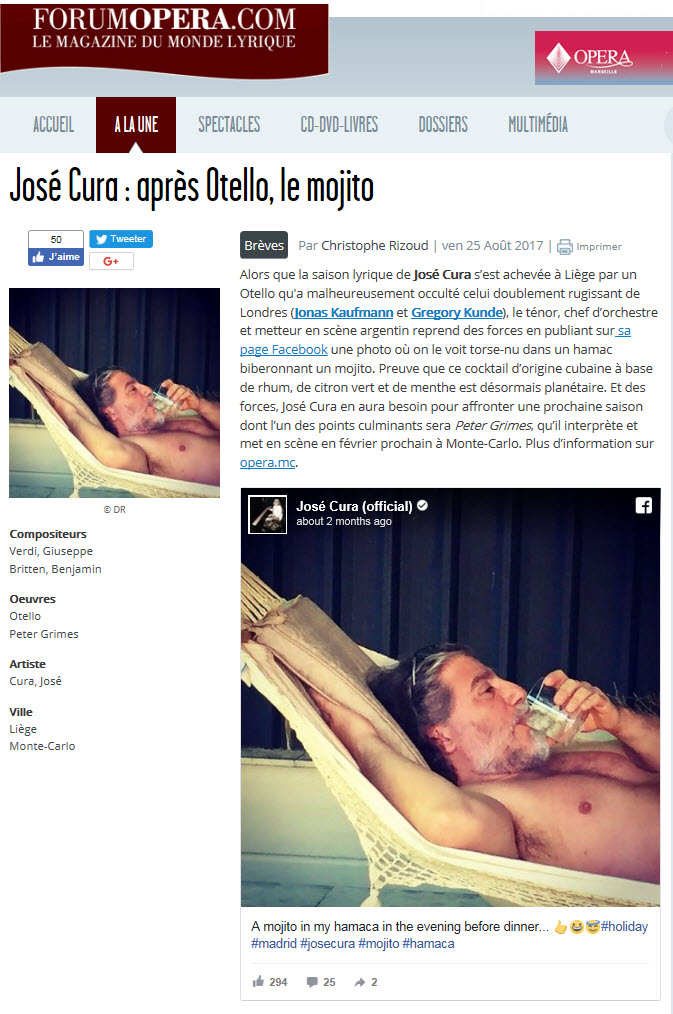

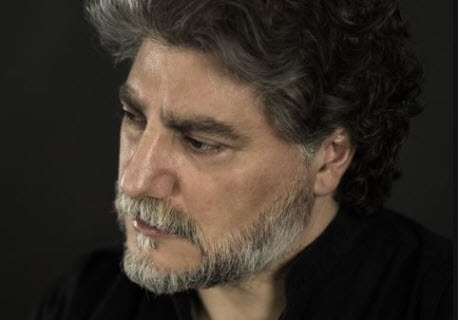
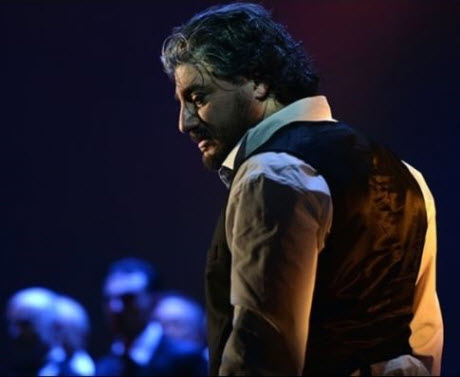
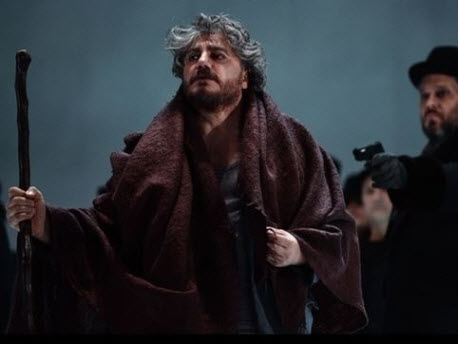
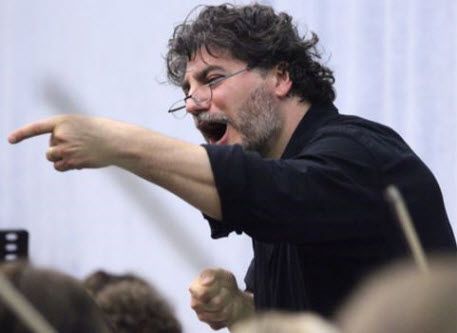
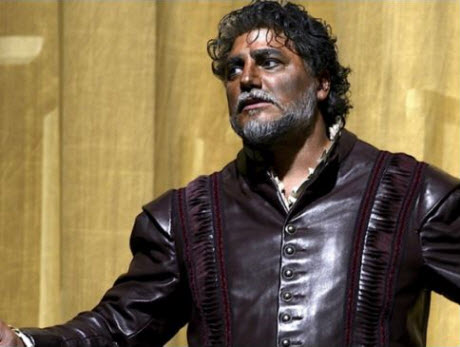
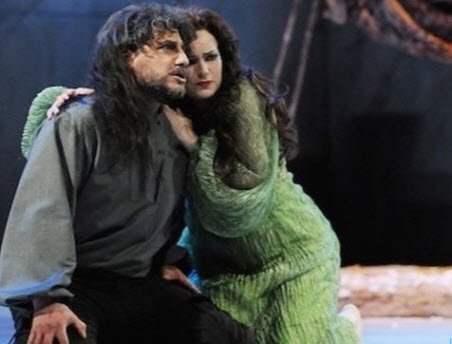

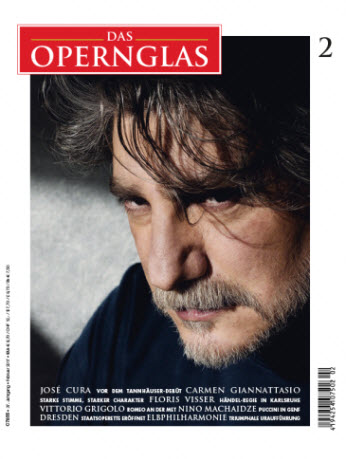 Q:
This season offers two eagerly anticipated role debuts:
Tannhäuser and Peter Grimes. Starting with the
Wagner opera, which comes out in February at Opéra de
Monte-Carlo: As they are doing the French version, the
language actually should not be the problem; so what is the
main challenge for you?
Q:
This season offers two eagerly anticipated role debuts:
Tannhäuser and Peter Grimes. Starting with the
Wagner opera, which comes out in February at Opéra de
Monte-Carlo: As they are doing the French version, the
language actually should not be the problem; so what is the
main challenge for you?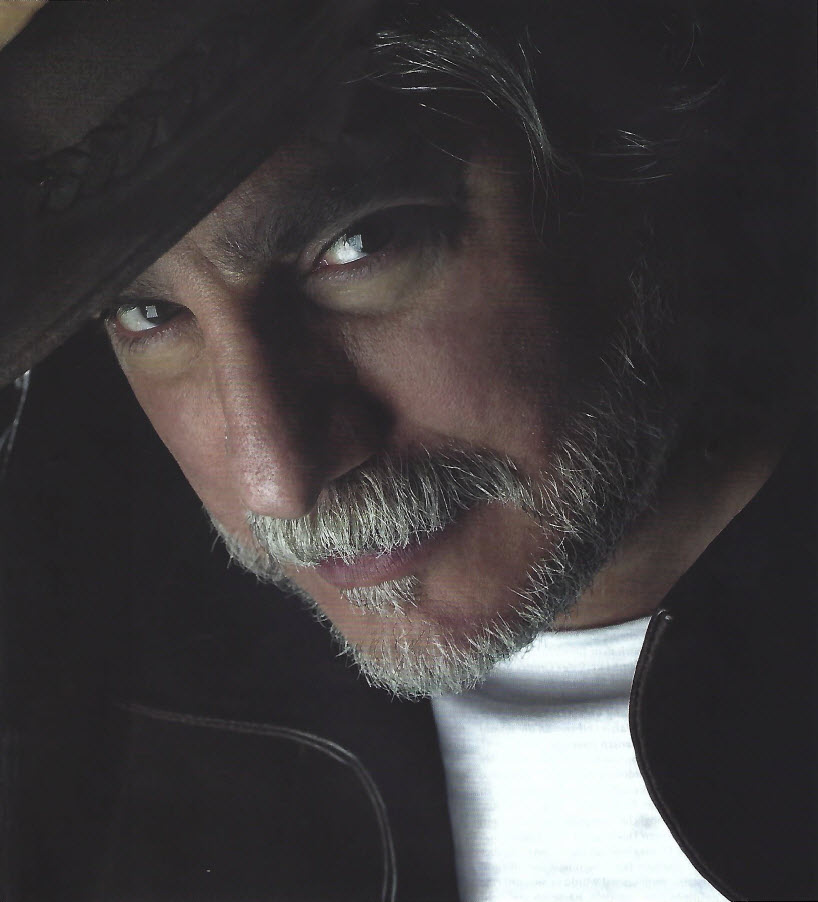
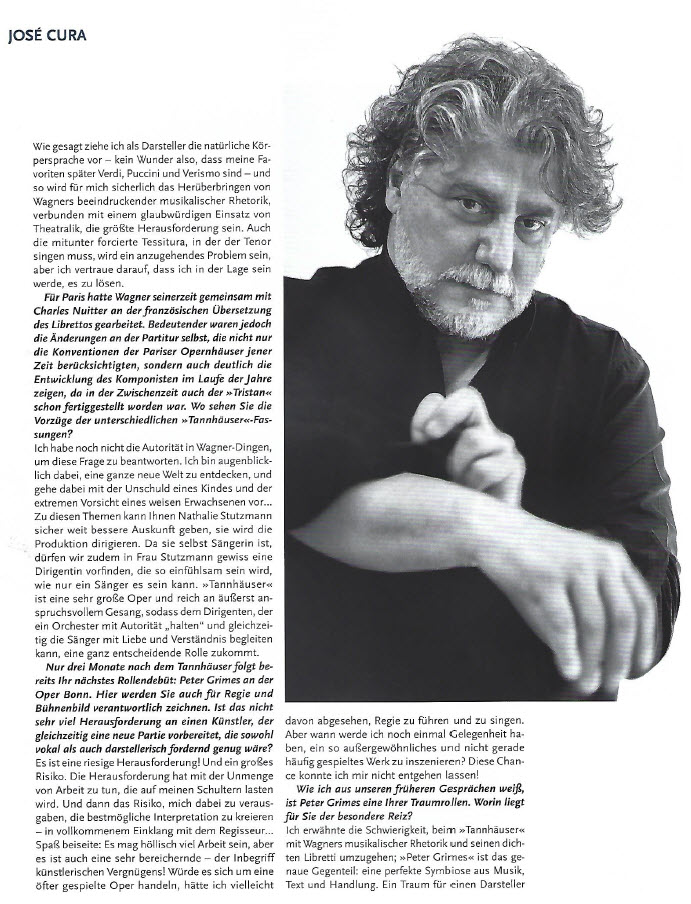
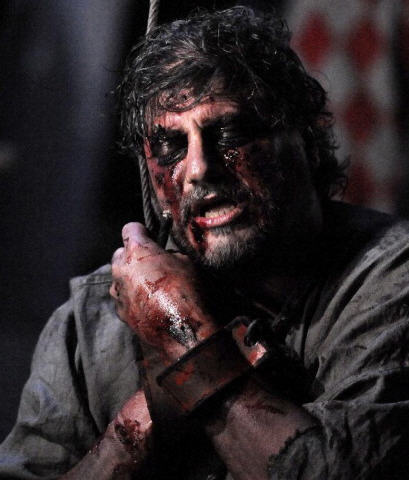
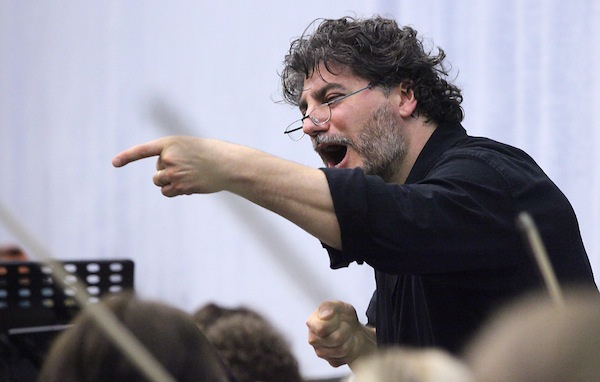
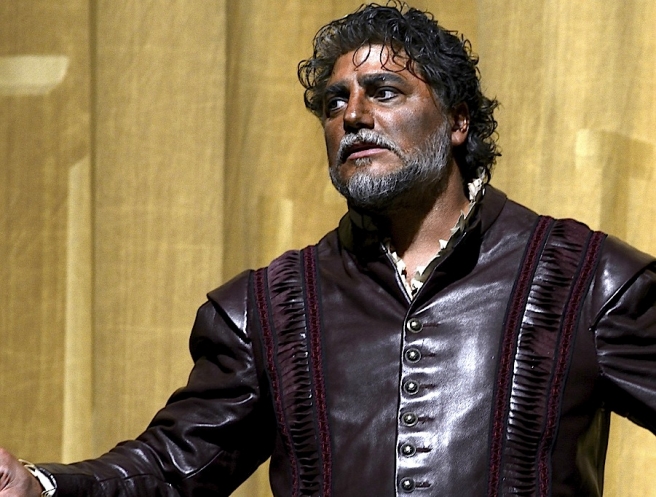 Cura:
I have only performed a couple of times in Croatia,
but enough to feel the enormous professionalism of
the Croatian musicians and the great energy of its
public. I have never been in Dubrovnik, but I cannot
wait to get there because it is well known how
beautiful the city is. The program has been done
upon the requests of the Festival and the wish of
Mo. Tarbuk to dedicate part of the concert to the
Spanish repertoire.
Cura:
I have only performed a couple of times in Croatia,
but enough to feel the enormous professionalism of
the Croatian musicians and the great energy of its
public. I have never been in Dubrovnik, but I cannot
wait to get there because it is well known how
beautiful the city is. The program has been done
upon the requests of the Festival and the wish of
Mo. Tarbuk to dedicate part of the concert to the
Spanish repertoire.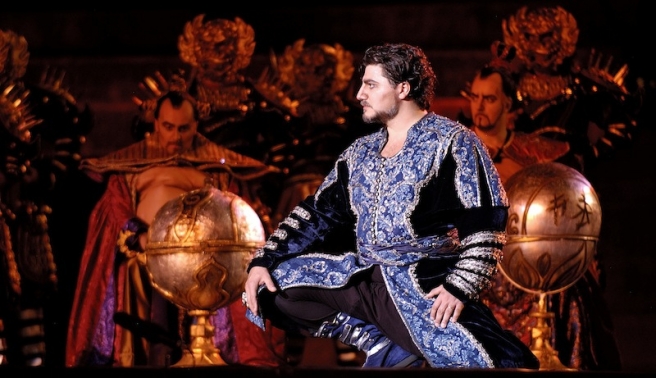
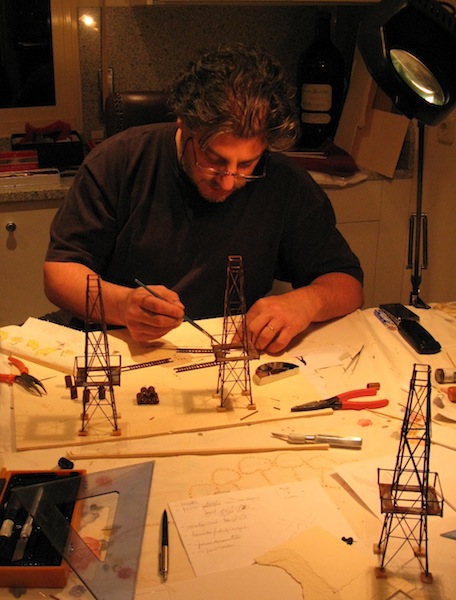 Telegram:
How important were Horacio Amauri and Vittorio
Terranova for the moulding of your vocal skill?
Telegram:
How important were Horacio Amauri and Vittorio
Terranova for the moulding of your vocal skill?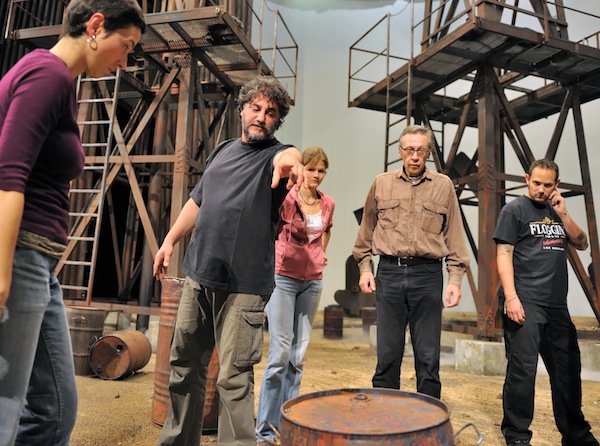
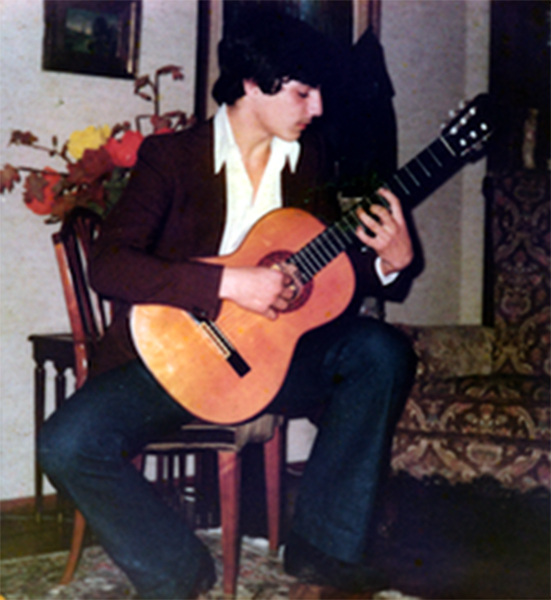

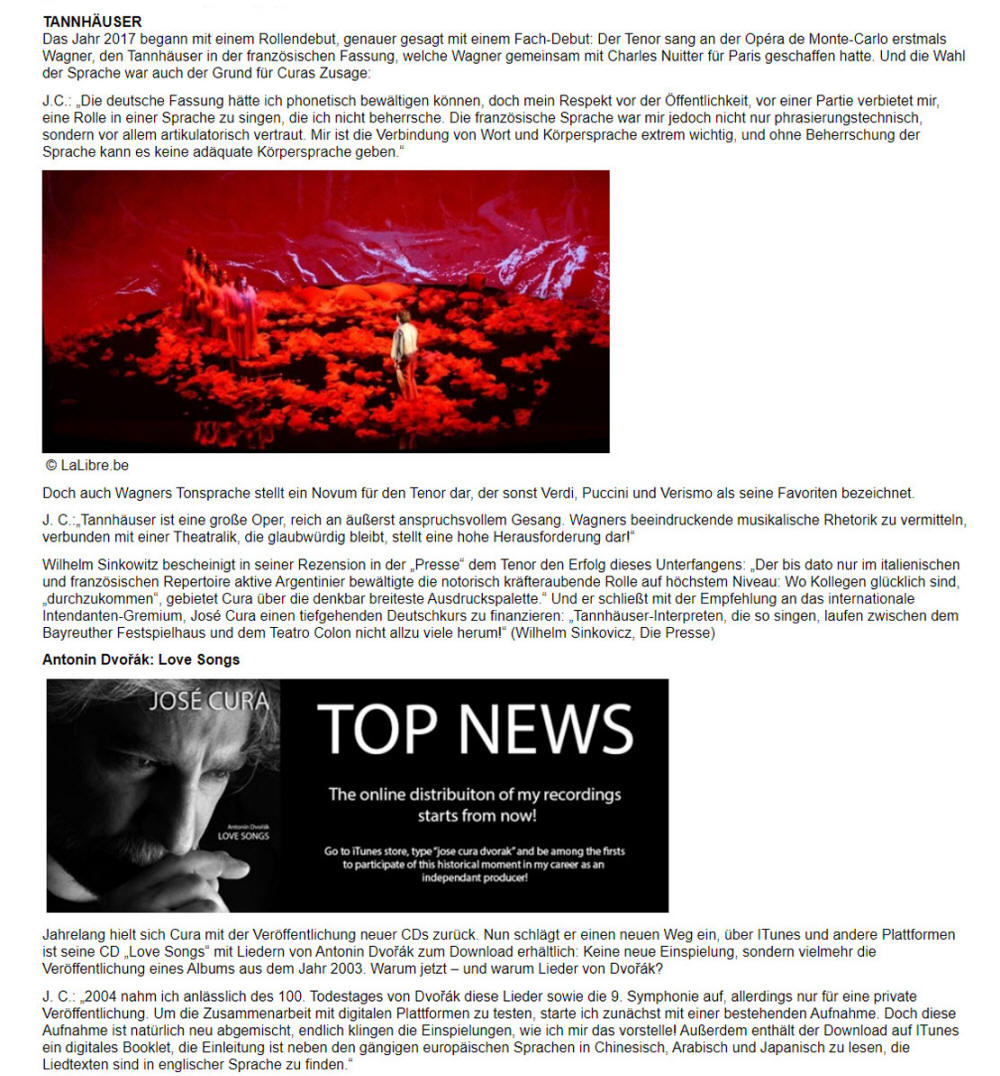
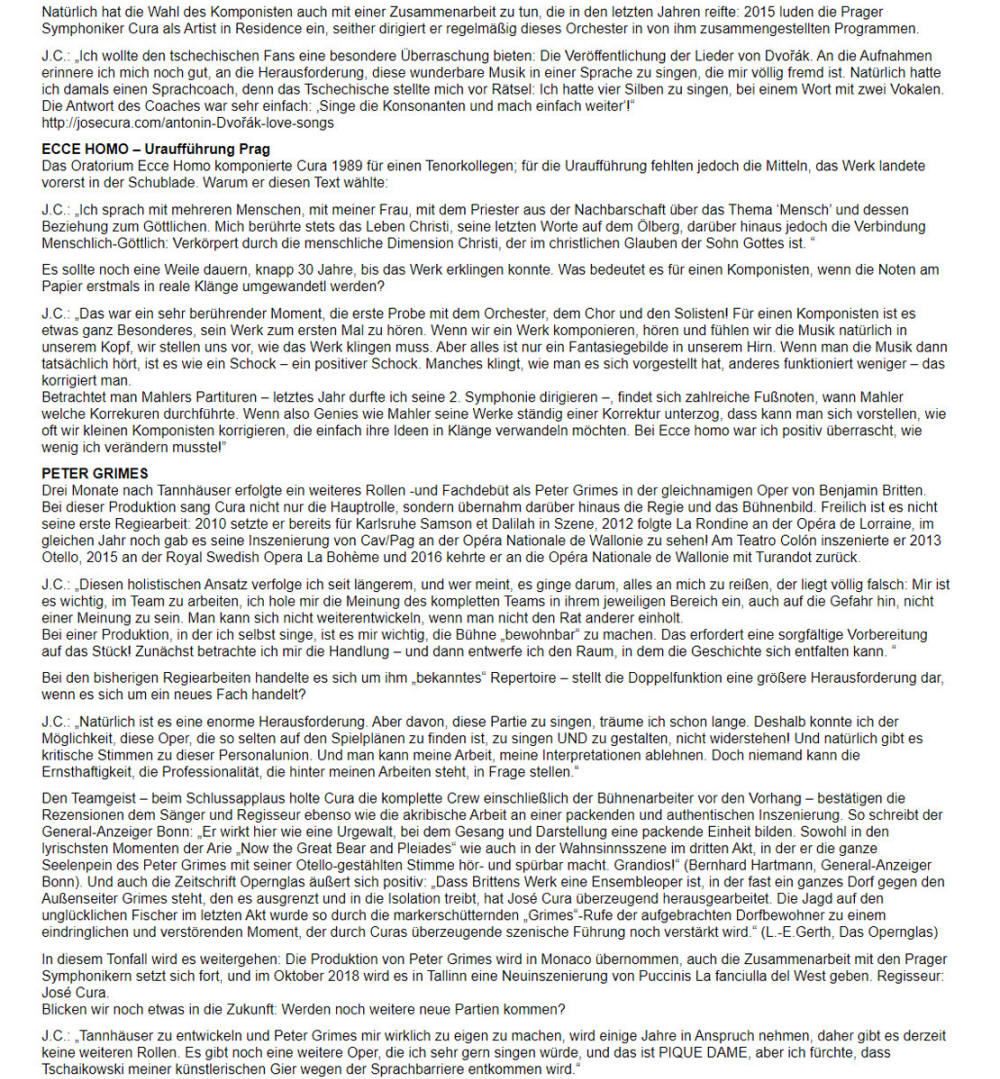
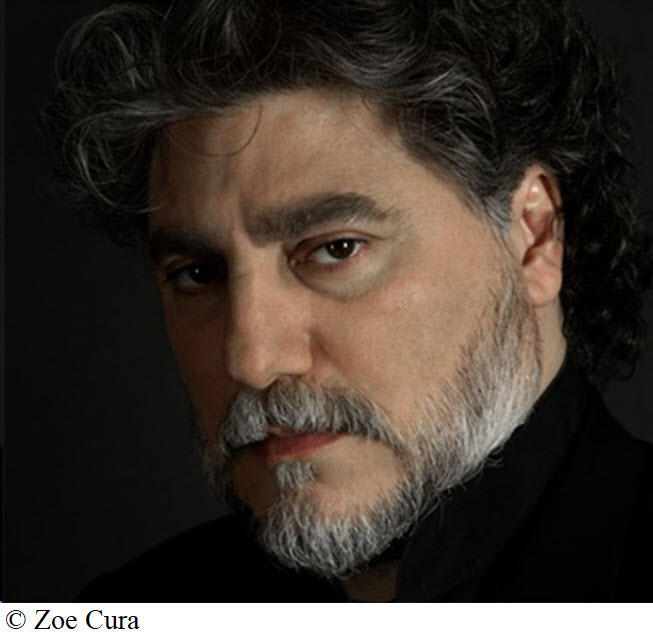
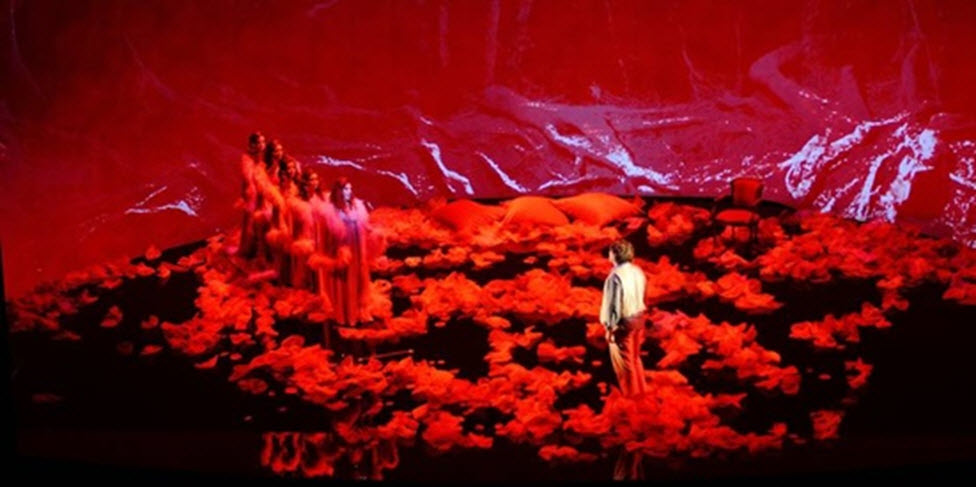

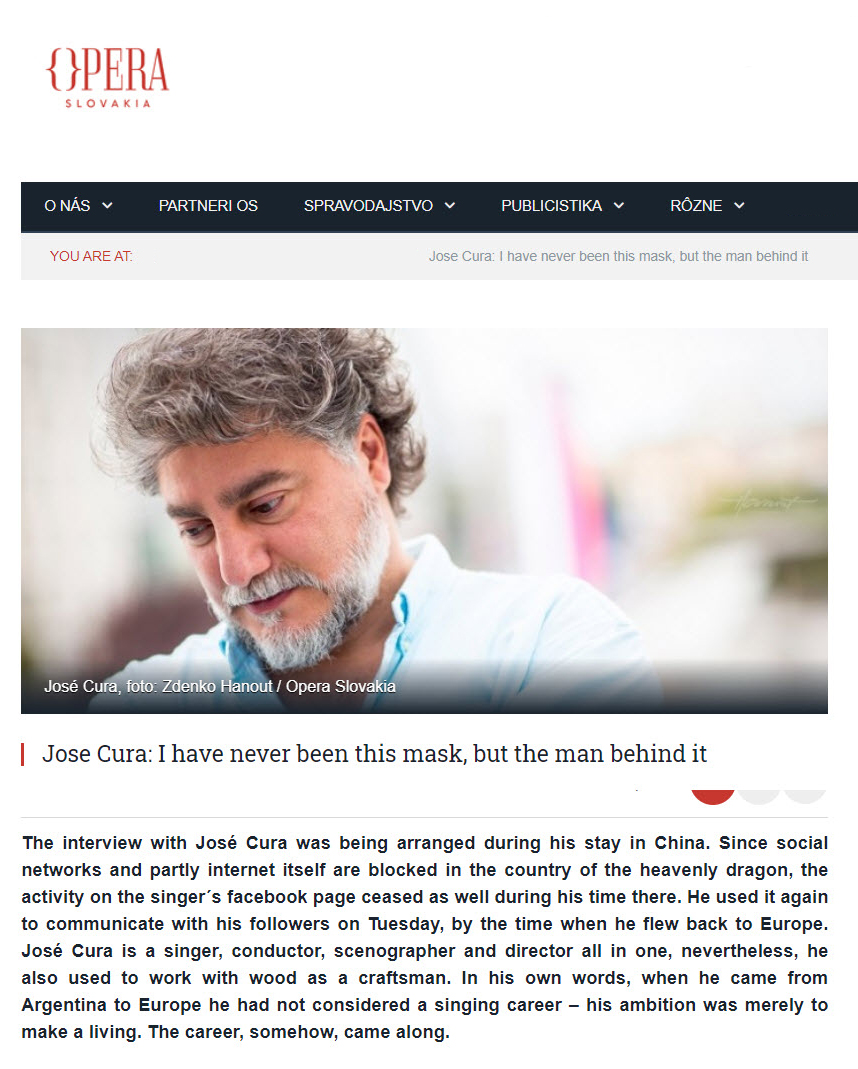
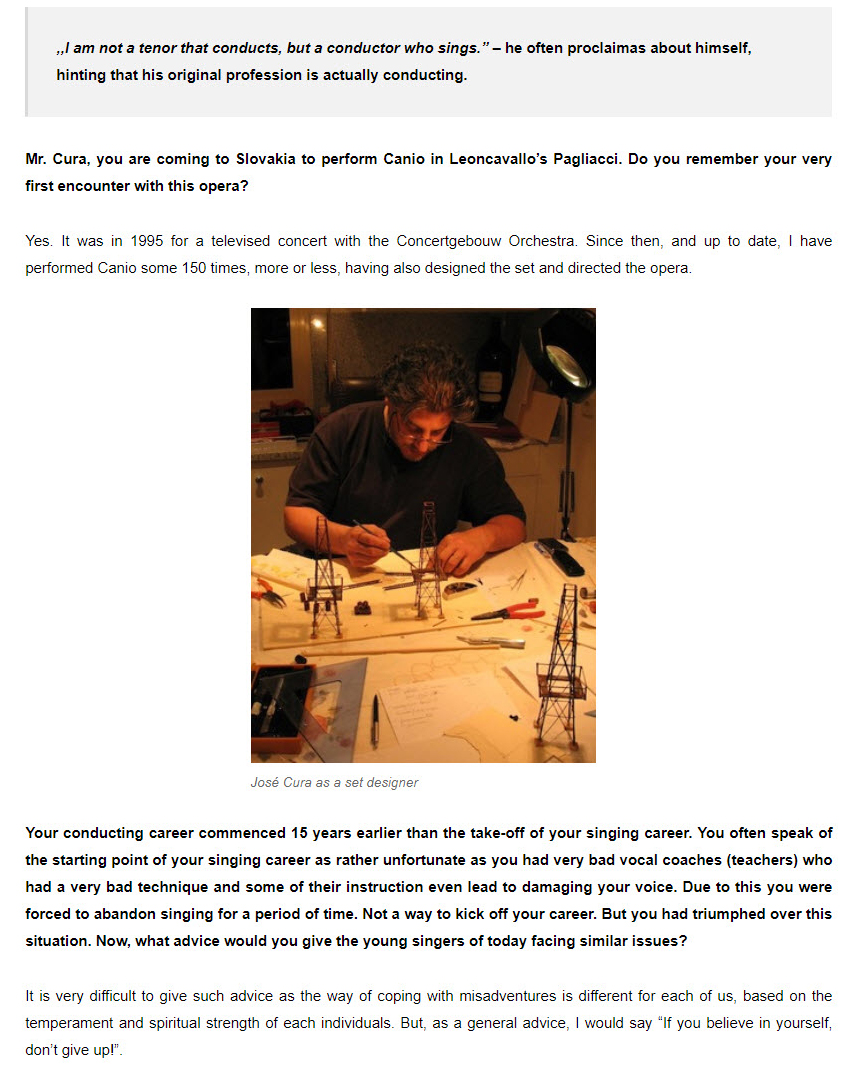
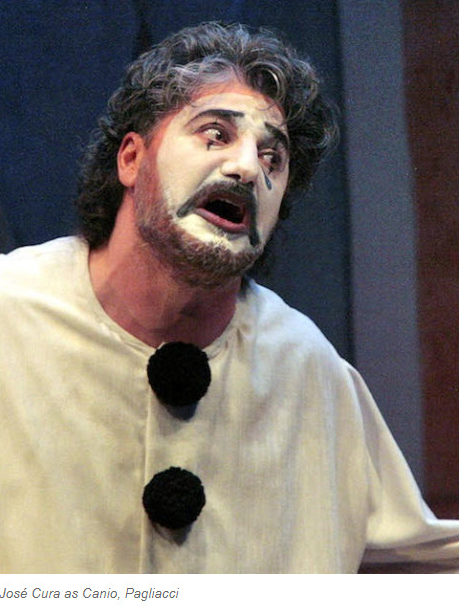
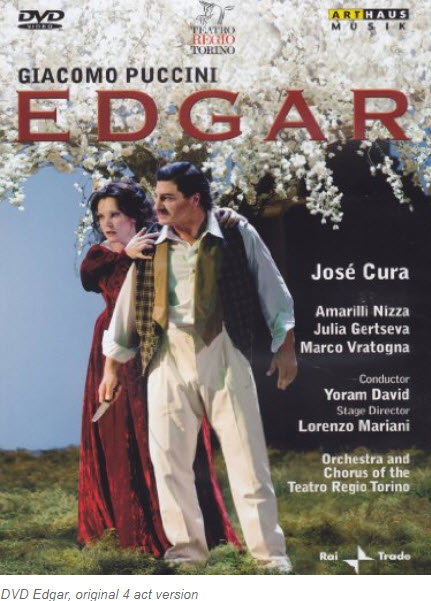
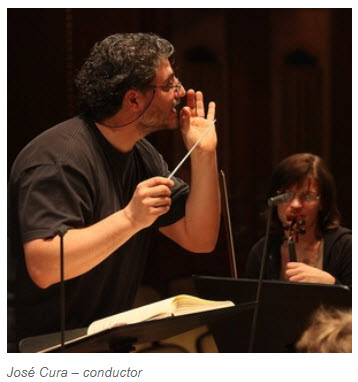
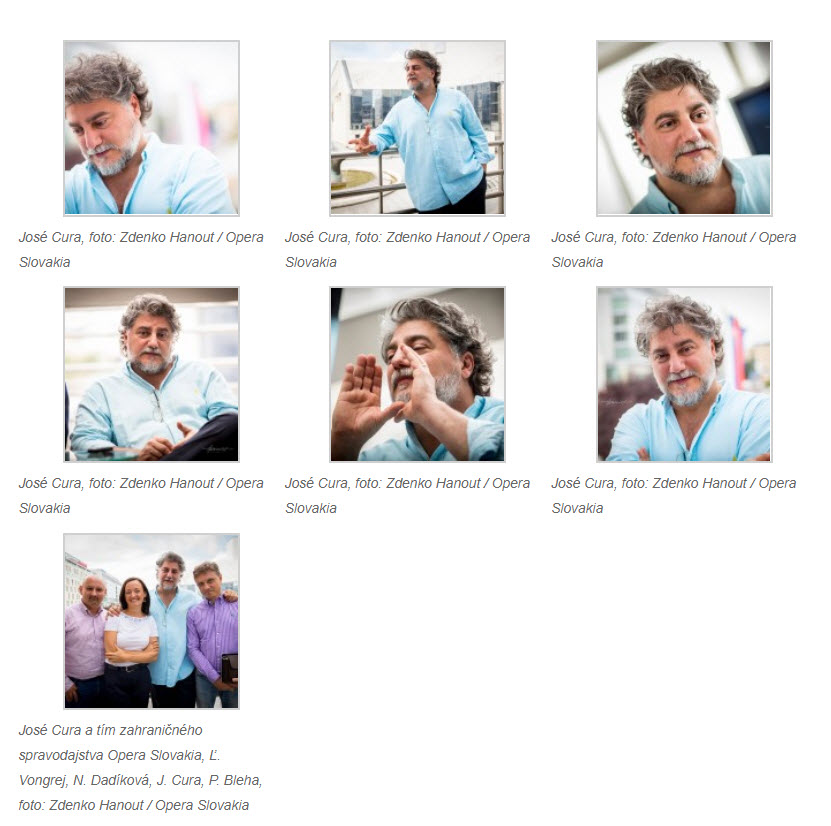
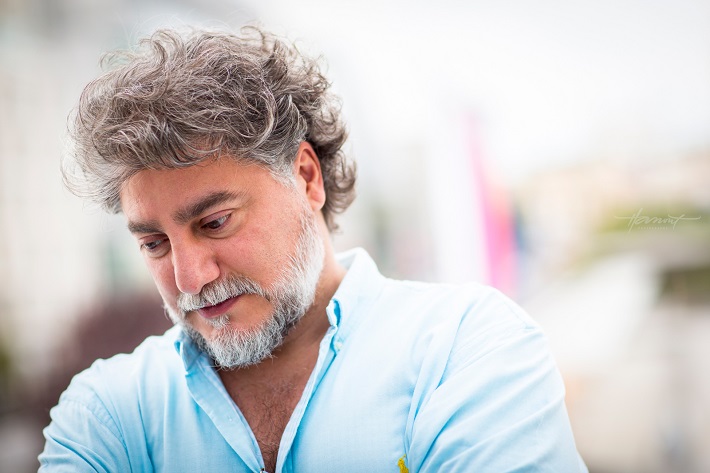
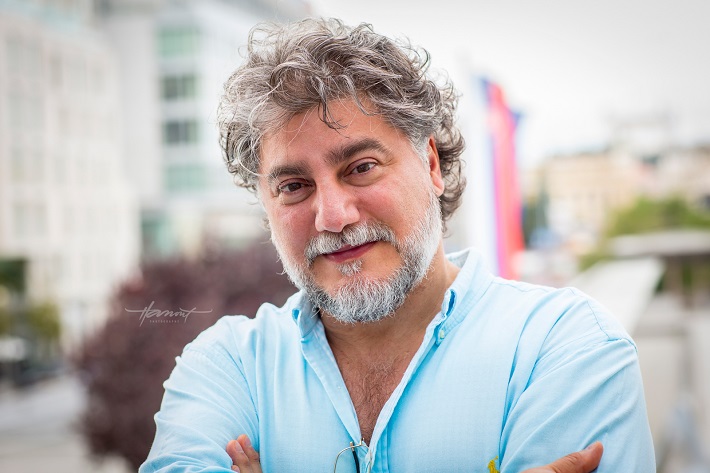
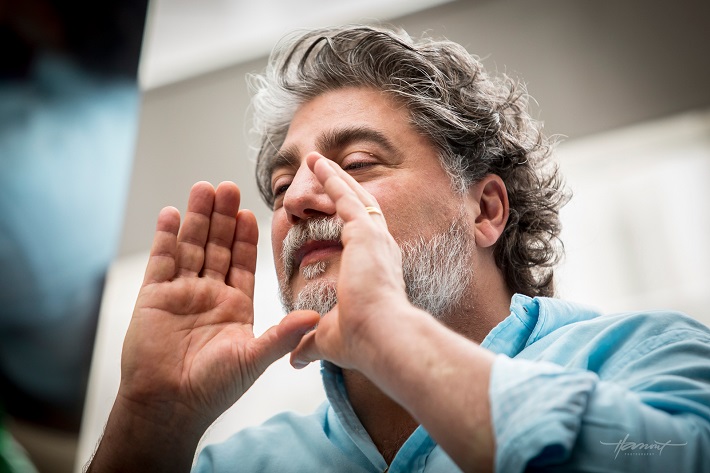
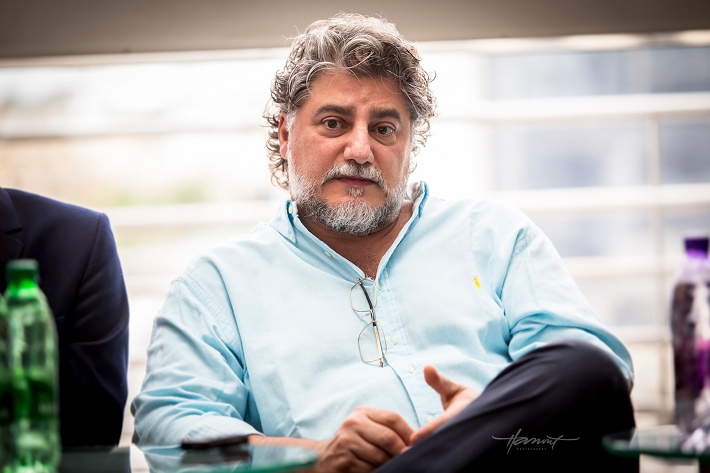
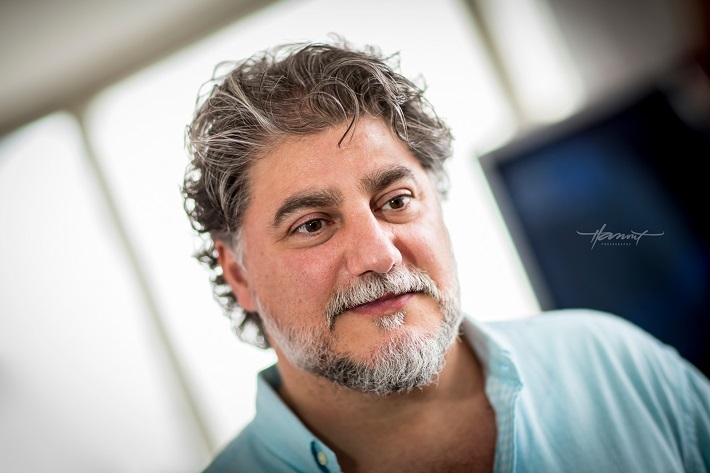
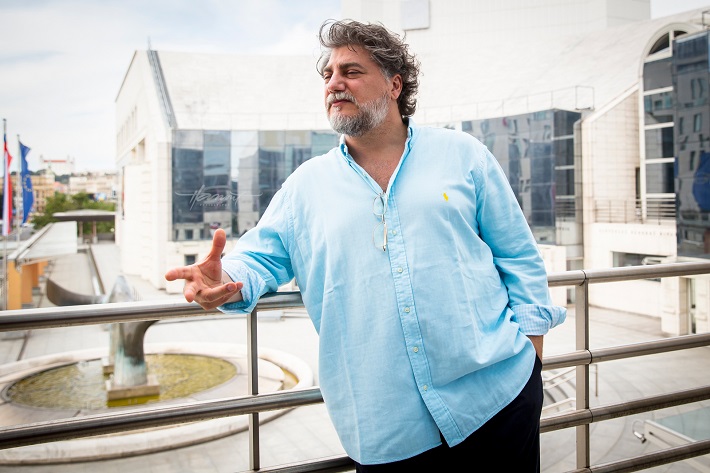
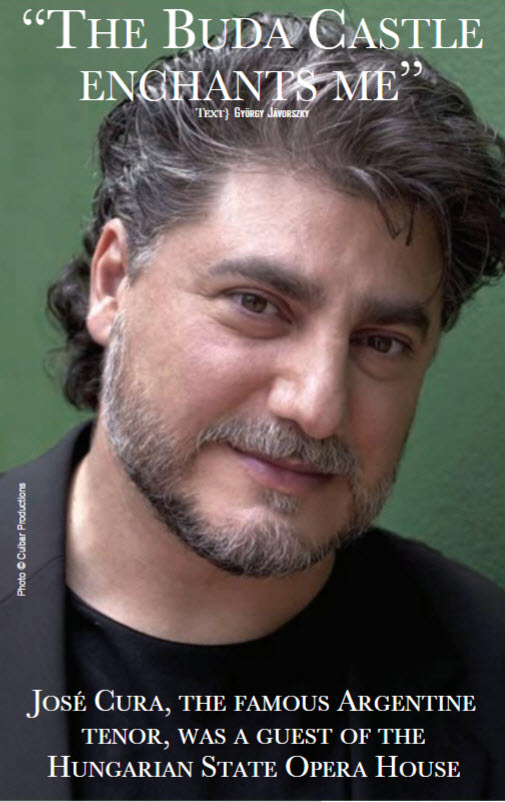
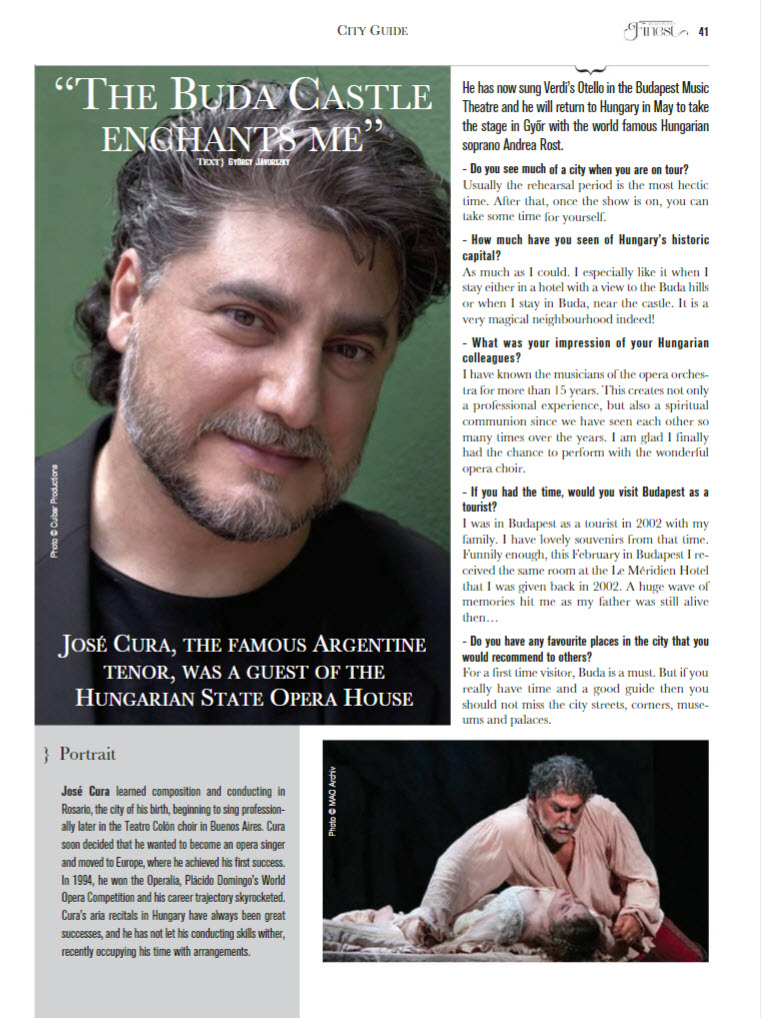
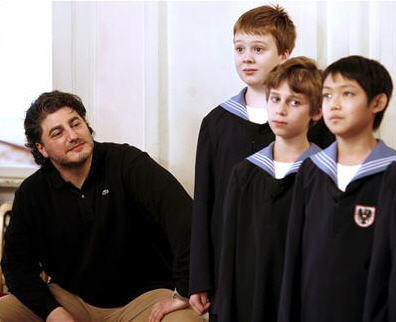
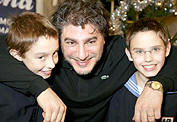
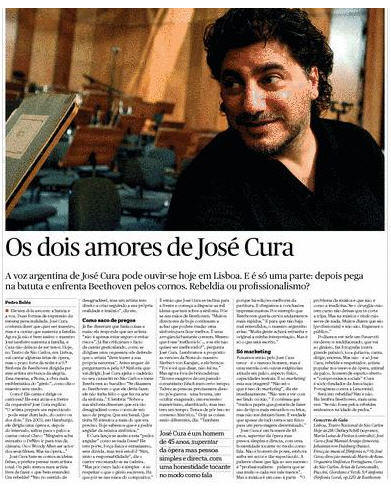
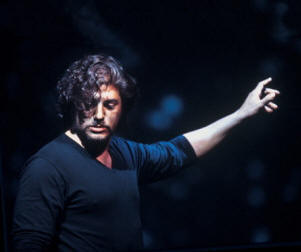
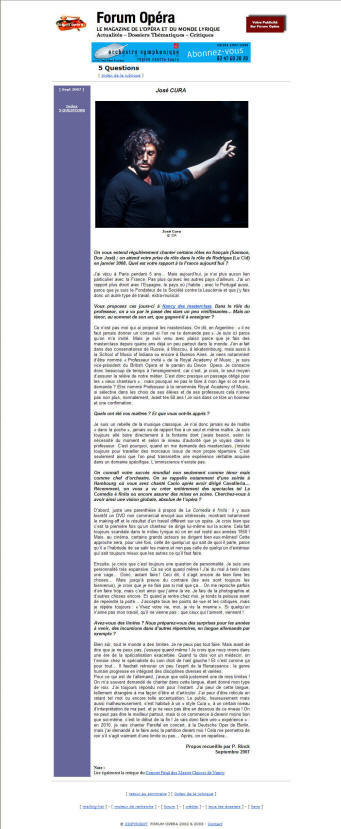
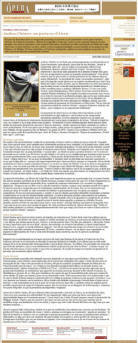
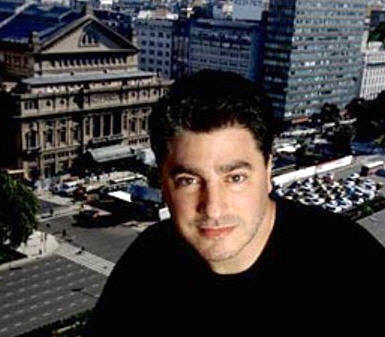
.jpg) José
Cura (44) traveled to Argentina to attend the golden
anniversary of his parents (the celebration is on
Saturday 7 July in Rosario, his hometown). He is
accompanied by his wife, Silvia, and their three
children: José (19), Yazmín (14) and Nicolás (11).
The visit, at first a secret, was quickly divulged
and the family plan was subsequently interrupted by
five performances of Samson et Dalila (by Camille
Saint-Saëns) in the Teatro Coliseo, with the
artistic support of the Teatro Colón, and in Rosario
with the festival of the 50 years of the Monument to
the Flag and a chamber concert in commemoration of
the 25th anniversary of Mozarteum, (8
July) where he will present the world premier of the
José
Cura (44) traveled to Argentina to attend the golden
anniversary of his parents (the celebration is on
Saturday 7 July in Rosario, his hometown). He is
accompanied by his wife, Silvia, and their three
children: José (19), Yazmín (14) and Nicolás (11).
The visit, at first a secret, was quickly divulged
and the family plan was subsequently interrupted by
five performances of Samson et Dalila (by Camille
Saint-Saëns) in the Teatro Coliseo, with the
artistic support of the Teatro Colón, and in Rosario
with the festival of the 50 years of the Monument to
the Flag and a chamber concert in commemoration of
the 25th anniversary of Mozarteum, (8
July) where he will present the world premier of the
.jpg) -
I was always very stubborn. Like young children,
each time they get up in the morning it is not
important to them what happened the previous day,
just that they are going to play again. I believe I
am like that. I was always convinced I had
something to say, I was prepared to say it, and was
going to keep on saying it until I finally found
someone who would listen to what I had to say and
then this person would pass it on to others. It is
being eternally young beyond all mistakes and
objections. It causes one to want to continue
forward with the same thing.
-
I was always very stubborn. Like young children,
each time they get up in the morning it is not
important to them what happened the previous day,
just that they are going to play again. I believe I
am like that. I was always convinced I had
something to say, I was prepared to say it, and was
going to keep on saying it until I finally found
someone who would listen to what I had to say and
then this person would pass it on to others. It is
being eternally young beyond all mistakes and
objections. It causes one to want to continue
forward with the same thing.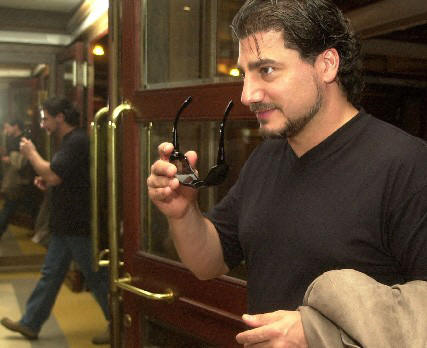 With
his performances in Samson et Dalila
presented by the Teatro Colón, José Cura gave ample
evidence to the Argentine public of why his name is
where it is in the world of opera. Nevertheless, and
not to lose the habit of being pleasantly surprised,
an important moment still remains on his agenda
before the tenor returns to Europe. It is a
question this time of the world premiere of his
Sonnets, based on the poems of Pablo Neruda,
that take place tomorrow in the program for the
Mozarteum of Rosario, which is celebrating its
Silver Anniversary with a concert by José Cura and
pianist Eduardo Delgado in the Foundation Astengo.
The two, acquainted through the CD of Argentine
music Anhelo, will offer a chamber
recital, including songs from the recording, works
for solo piano, and the pieces composed by Cura.
With
his performances in Samson et Dalila
presented by the Teatro Colón, José Cura gave ample
evidence to the Argentine public of why his name is
where it is in the world of opera. Nevertheless, and
not to lose the habit of being pleasantly surprised,
an important moment still remains on his agenda
before the tenor returns to Europe. It is a
question this time of the world premiere of his
Sonnets, based on the poems of Pablo Neruda,
that take place tomorrow in the program for the
Mozarteum of Rosario, which is celebrating its
Silver Anniversary with a concert by José Cura and
pianist Eduardo Delgado in the Foundation Astengo.
The two, acquainted through the CD of Argentine
music Anhelo, will offer a chamber
recital, including songs from the recording, works
for solo piano, and the pieces composed by Cura.
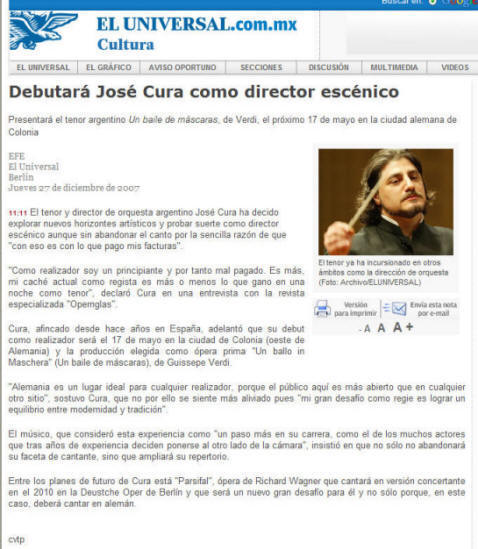
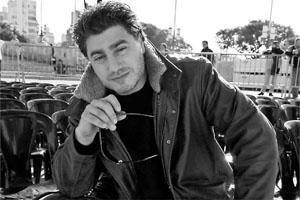 Applauded
by the critics for his interpretations
of Giuseppe Verdi’s “Otello” and
Saint-Saens’ “Samson”, Cura is also
recognized for being the first artist to
have sung and conducted the same work
simultaneously as well as being the
first to combine vocal with symphonic
performances in the same concert.
Applauded
by the critics for his interpretations
of Giuseppe Verdi’s “Otello” and
Saint-Saens’ “Samson”, Cura is also
recognized for being the first artist to
have sung and conducted the same work
simultaneously as well as being the
first to combine vocal with symphonic
performances in the same concert.

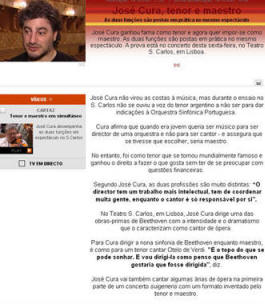
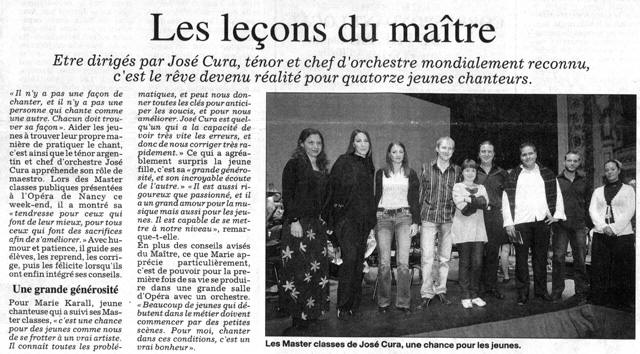
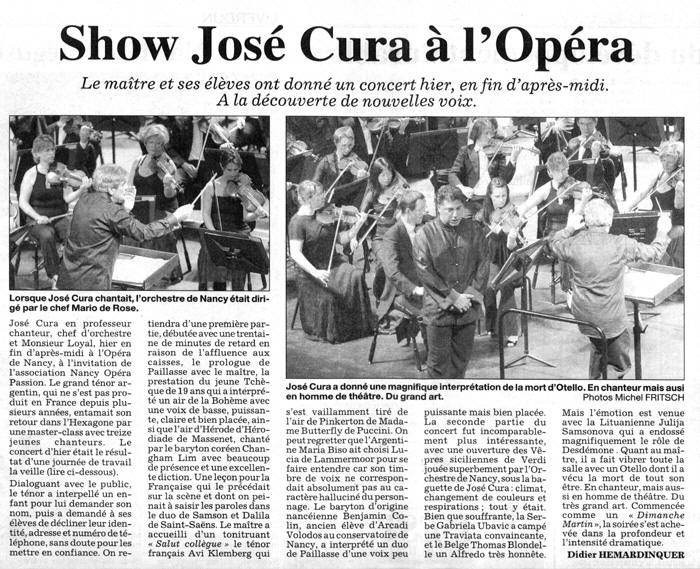
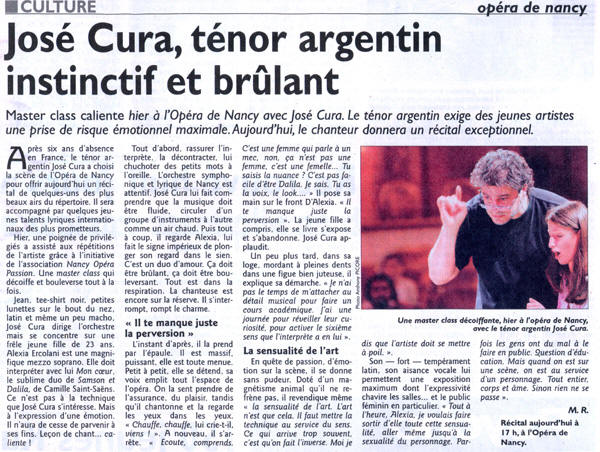
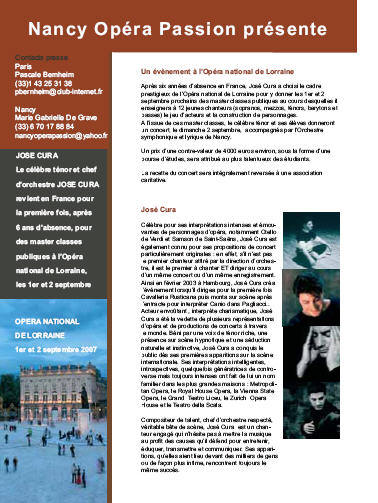
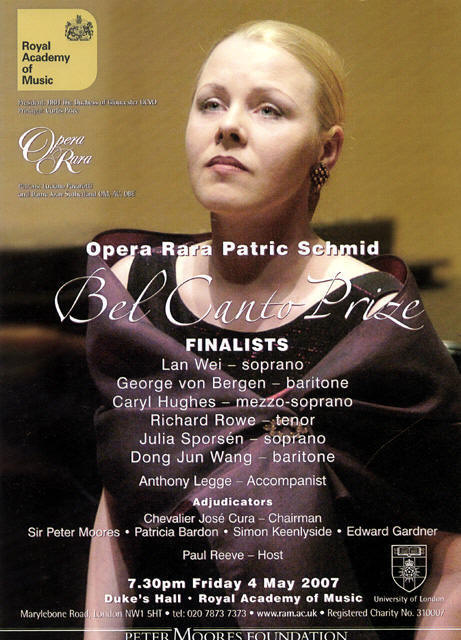
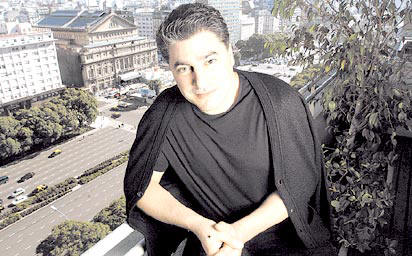
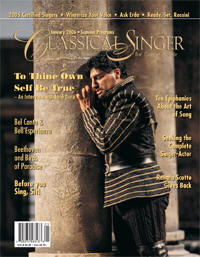
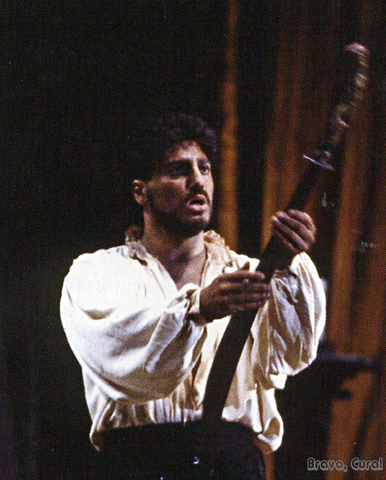 Well,
we worked for a year. I have always been a rebel in
my life, self-taught in almost everything I do. I
always wanted to carve my way, in my own style. But
this teacher helped me discover and understand my
instrument. He didn’t change it; he didn’t try to
shape what was the rough prototype of my voice into
an artist. So, from there on, I took charge of my
own instrument, and kept asking myself: “Now that I
understand how it feels, what do I have to do, what
do I have to keep feeling? How do I have to mold my
understanding of the voice into the musician that I
am, in order to continue on my own path?”
Well,
we worked for a year. I have always been a rebel in
my life, self-taught in almost everything I do. I
always wanted to carve my way, in my own style. But
this teacher helped me discover and understand my
instrument. He didn’t change it; he didn’t try to
shape what was the rough prototype of my voice into
an artist. So, from there on, I took charge of my
own instrument, and kept asking myself: “Now that I
understand how it feels, what do I have to do, what
do I have to keep feeling? How do I have to mold my
understanding of the voice into the musician that I
am, in order to continue on my own path?”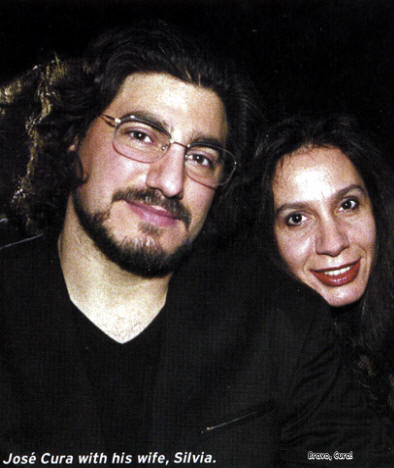 It’s
not about when you start … it’s about what you have
inside your head to deal with your life and your
career, which has nothing to do with when you start,
or with age. This is like getting married. If you
feel that you have to get married at 22, even if
everybody says that you are too young, then you get
married at 22. I got married at 22! I’ve been
married for 20 years—I have three kids and I am the
happiest man. So, it worked!
It’s
not about when you start … it’s about what you have
inside your head to deal with your life and your
career, which has nothing to do with when you start,
or with age. This is like getting married. If you
feel that you have to get married at 22, even if
everybody says that you are too young, then you get
married at 22. I got married at 22! I’ve been
married for 20 years—I have three kids and I am the
happiest man. So, it worked!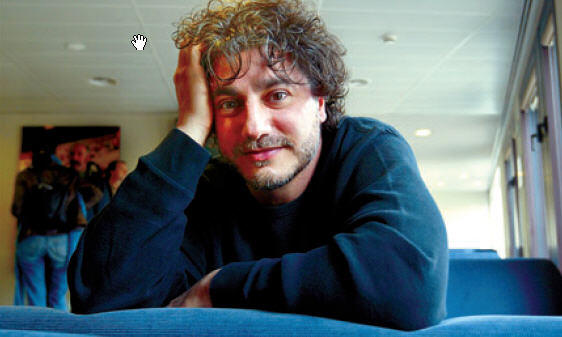
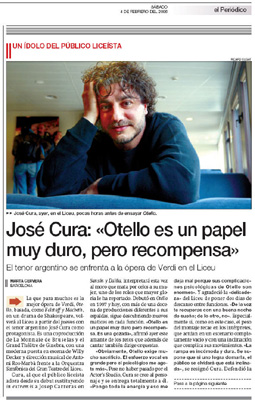 “Obvious,
Otello demands much sacrifice. The vocal effort is
great but the psychological effort is even more
exhausting to me.”
“Obvious,
Otello demands much sacrifice. The vocal effort is
great but the psychological effort is even more
exhausting to me.”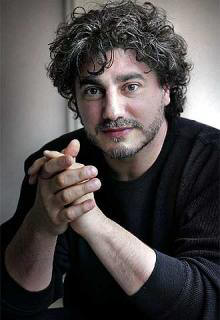
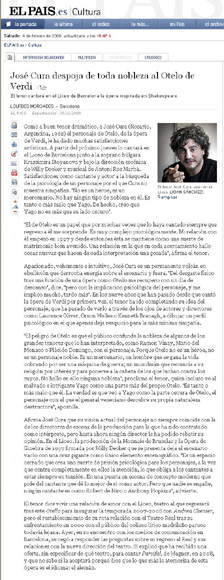 "The
role of Otello is one I have sung many times and yet
it always surprises me when I return to it. He is
very complex psychologically. My relation with him
began in 1997 and since then this character stays
with me with the luck of a well-made marriage. It
is a relationship in which I find new delights in
interpretation with each production," says the
tenor.
"The
role of Otello is one I have sung many times and yet
it always surprises me when I return to it. He is
very complex psychologically. My relation with him
began in 1997 and since then this character stays
with me with the luck of a well-made marriage. It
is a relationship in which I find new delights in
interpretation with each production," says the
tenor.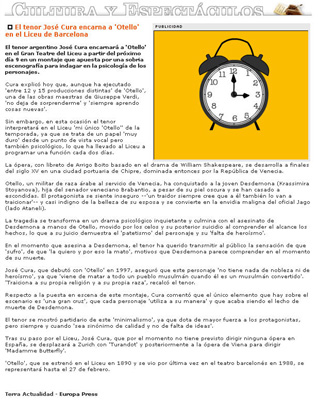 The
Argentine tenor José Cura will portray Otello in the
The
Argentine tenor José Cura will portray Otello in the
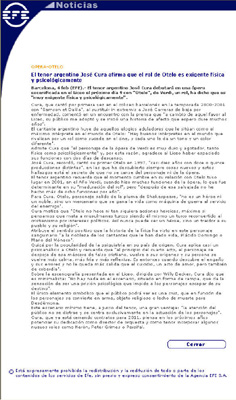 Cura,
who first sang in the Barcelonan theater in
Samson et Dalila in season 2000-2001 when he
replaced José Carreras at the last minute when
Carreras fell ill, commented during his press
conference that “in exchange for that favor to the
Liceu, the public here adopted me and a history of
affection began which I hope lasts many years.”
Cura,
who first sang in the Barcelonan theater in
Samson et Dalila in season 2000-2001 when he
replaced José Carreras at the last minute when
Carreras fell ill, commented during his press
conference that “in exchange for that favor to the
Liceu, the public here adopted me and a history of
affection began which I hope lasts many years.”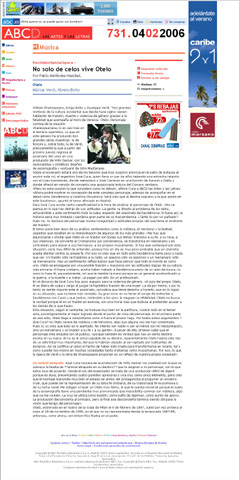 On
stage will be Argentinean José Cura, a tenor who may
cause many sighs in the stalls when he assumes this
role. It has taken him several years to build a
strong relationship with Liceu since his first,
brief appearance when he replaced José Carreras in a
production of Samson et Dalila until [last year]
when he presented a passionate reading of Corsaro in
a concert version of the Verdi opera.
On
stage will be Argentinean José Cura, a tenor who may
cause many sighs in the stalls when he assumes this
role. It has taken him several years to build a
strong relationship with Liceu since his first,
brief appearance when he replaced José Carreras in a
production of Samson et Dalila until [last year]
when he presented a passionate reading of Corsaro in
a concert version of the Verdi opera. 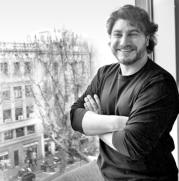 BARCELONA.
Promoting the best Otello of the moment was a
marketing ploy the Liceu could not let pass, and in
introducing José Cura, Joan Matabosch, the Liceu’s
artistic director, said: "We are very proud to have
with us the best interpreter of this role at this
time.”
BARCELONA.
Promoting the best Otello of the moment was a
marketing ploy the Liceu could not let pass, and in
introducing José Cura, Joan Matabosch, the Liceu’s
artistic director, said: "We are very proud to have
with us the best interpreter of this role at this
time.”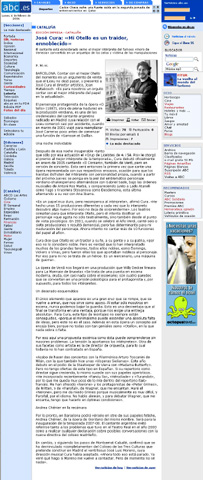 "It
is a very difficult role, but it rewards the
interpreter," Cura said. "I have been in 15
different productions and whenever I play the role I
discover something new. That is why I am not
surprised.” Theaters compete to sign him for the
role but he tries to take a rational approach to
accepting offers for a character "who exhausts not
only physically but also psychologically. In 2001,
when the Verdi Year was celebrated, I sang in six or
seven different productions and that was insane, but
it helped me matured in the role. Now I try to sing
no more than ten performances a year."
"It
is a very difficult role, but it rewards the
interpreter," Cura said. "I have been in 15
different productions and whenever I play the role I
discover something new. That is why I am not
surprised.” Theaters compete to sign him for the
role but he tries to take a rational approach to
accepting offers for a character "who exhausts not
only physically but also psychologically. In 2001,
when the Verdi Year was celebrated, I sang in six or
seven different productions and that was insane, but
it helped me matured in the role. Now I try to sing
no more than ten performances a year."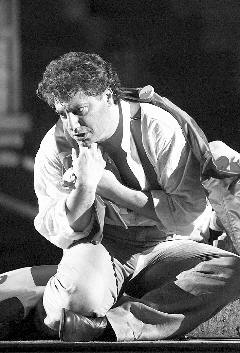
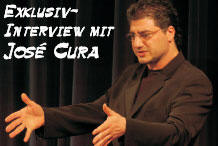
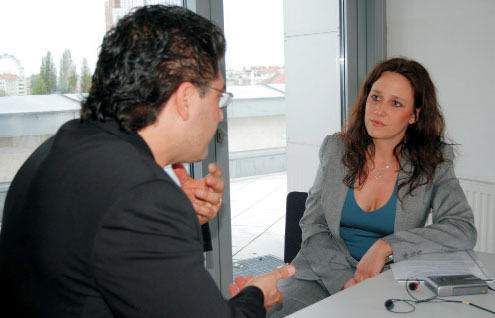 Question
from Réjane Suttheimer: Dear Maestro Cura,
first of all I would like to thank you for this
interview. It is a big honour for me and our
readers will be very pleased to read it.
Question
from Réjane Suttheimer: Dear Maestro Cura,
first of all I would like to thank you for this
interview. It is a big honour for me and our
readers will be very pleased to read it. 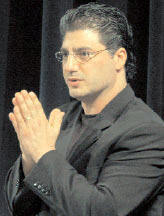 R-S:
Your occupation affects your private and family
life. As you have already mentioned before, you are
lot on the way. How do you and your wife deal with
it?
R-S:
Your occupation affects your private and family
life. As you have already mentioned before, you are
lot on the way. How do you and your wife deal with
it?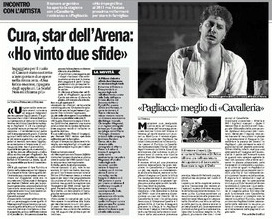 “The
great heat: I spent all evening getting water
and integrators to recover the lost liquids.”
“The
great heat: I spent all evening getting water
and integrators to recover the lost liquids.”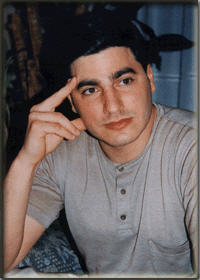
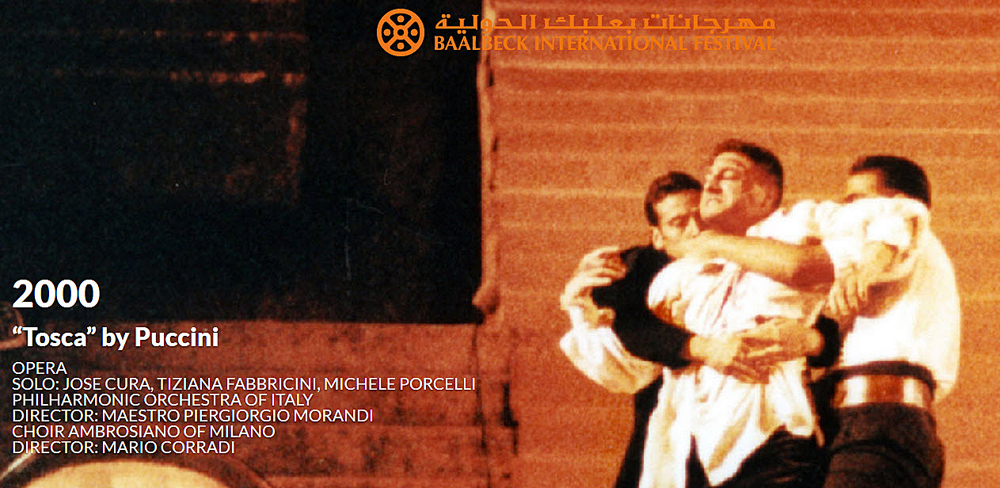
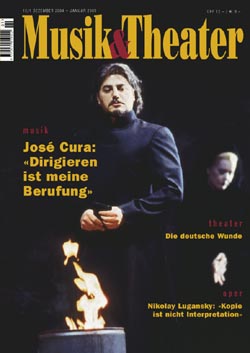 M&T:
What makes you special?
M&T:
What makes you special?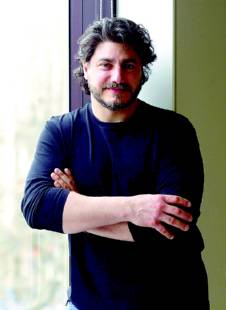 José
Cura ( Rosario 1962) could be reproached for many
things, but never for being a tame tenor. On the
contrary. He is one of those artists who leave their
mark on everything they do. This he demonstrated in
December 2000, when after having been booed by part of
the audience in stalls at Teatro Real, he stopped the
performance and stood up to them.
José
Cura ( Rosario 1962) could be reproached for many
things, but never for being a tame tenor. On the
contrary. He is one of those artists who leave their
mark on everything they do. This he demonstrated in
December 2000, when after having been booed by part of
the audience in stalls at Teatro Real, he stopped the
performance and stood up to them.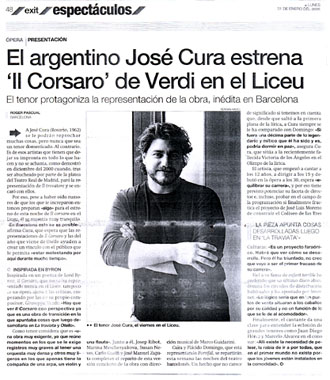
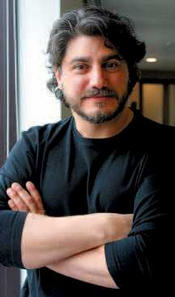 Inserted
between performances of Parsifal,
Inserted
between performances of Parsifal, 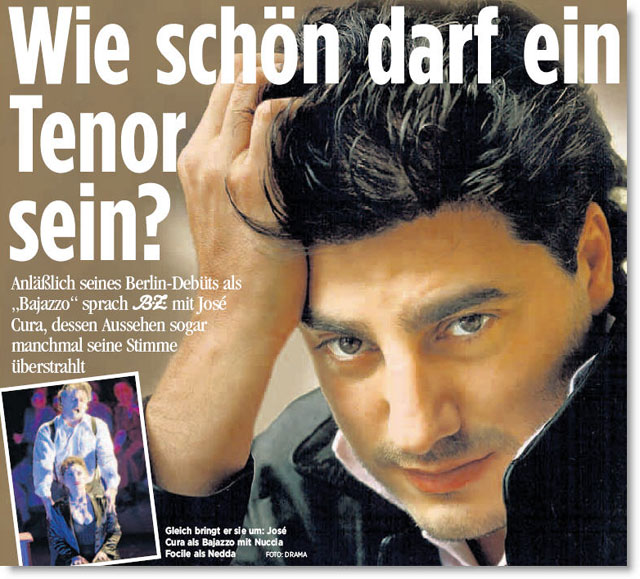
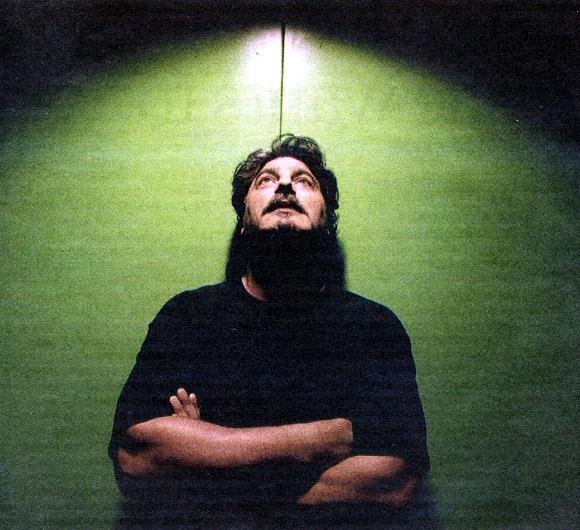 José
Cura breezes in from his rehearsal at the Royal Opera
House looking rather like an off-duty nightclub bouncer.
The dark-eyed Argentinian superstar, a former rugby
player and body-builder, could have been tailor-made for
the tenor lead in La Fanciulla del West, Puccini's take
on the gold rush, for which he received rave reviews
last week. His character, Johnson, aka Ramerrez, is an
escaped Latin bandit, by turns a "goody" and a "baddy"
in the best tradition of spaghetti westerns, but - in
the best tradition of romantic opera - ultimately
redeemed by love. Cura has run the gamut of "goody" and
"baddy" in terms of critical opinion over the years, but
it's his passion that carries him beyond that. His
treacly, seductive, dangerous voice can knock you into
submission in seconds.
José
Cura breezes in from his rehearsal at the Royal Opera
House looking rather like an off-duty nightclub bouncer.
The dark-eyed Argentinian superstar, a former rugby
player and body-builder, could have been tailor-made for
the tenor lead in La Fanciulla del West, Puccini's take
on the gold rush, for which he received rave reviews
last week. His character, Johnson, aka Ramerrez, is an
escaped Latin bandit, by turns a "goody" and a "baddy"
in the best tradition of spaghetti westerns, but - in
the best tradition of romantic opera - ultimately
redeemed by love. Cura has run the gamut of "goody" and
"baddy" in terms of critical opinion over the years, but
it's his passion that carries him beyond that. His
treacly, seductive, dangerous voice can knock you into
submission in seconds. 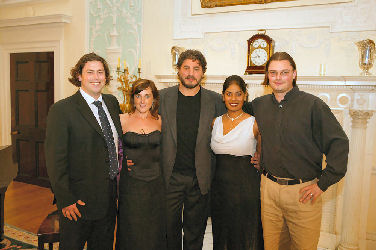
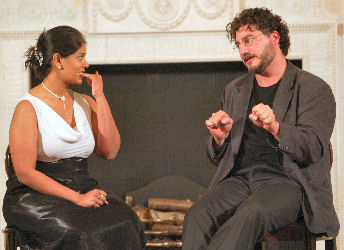
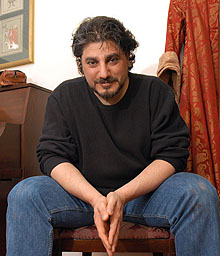
.jpg) They
say that José Cura does too many things; that he does
not concentrate on any one thing; that he is a human
octopus who wants to embrace everything, wants to do it
all. After singing ‘Samson’ in London, he conducted
‘Butterfly’ in Warsaw, besides having directed ‘Un ballo
in maschera’ earlier at Piacenza. In London, they call
him “The Renaissance Man”, but who is José Cura really?
A singer? A conductor? An impresario?
They
say that José Cura does too many things; that he does
not concentrate on any one thing; that he is a human
octopus who wants to embrace everything, wants to do it
all. After singing ‘Samson’ in London, he conducted
‘Butterfly’ in Warsaw, besides having directed ‘Un ballo
in maschera’ earlier at Piacenza. In London, they call
him “The Renaissance Man”, but who is José Cura really?
A singer? A conductor? An impresario?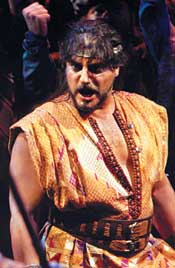
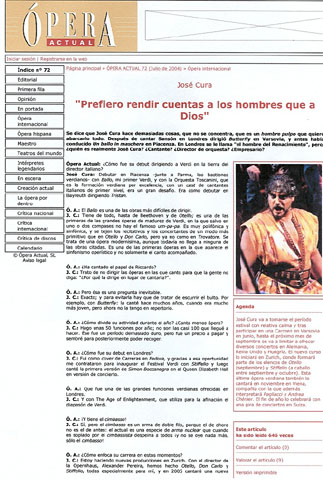 Ó.A.:
What are you planning for the upcoming seasons?
Ó.A.:
What are you planning for the upcoming seasons?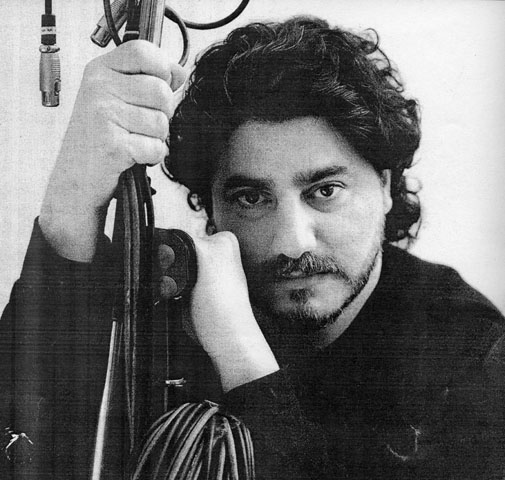 You’ve
been described as the “Fourth Tenor”. Is it difficult to
always hit the high notes?
You’ve
been described as the “Fourth Tenor”. Is it difficult to
always hit the high notes?
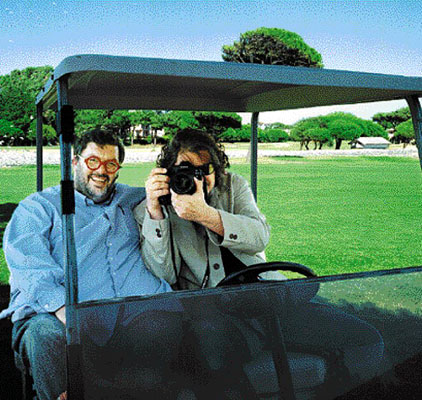
.jpg) “No.
I don’t like ruptures. They are too drastic. And let’s not
forget that when something breaks, someone always suffers.
Those kinds of revolutions are usually the social ones,
where suddenly one day people revolt and cut heads. In art,
the revolution is made by doing your job by letting your own
art slowly imbue the environment intoxicatingly. Maybe two
people get imbued by it and transmit this intoxication to
two others. And these two to another two. And this develops
into a chain reaction. It is not possible [for an artist] to
wake up one morning and say: ‘Stop, from now on you paint
this way!’. It is both impossible and wrong. I
personally learn, change and adjust as time passes. The good
thing in this kind of revolution is that people can get the
idea and develop its positive elements. In this case it is
something more than a revolution. It is a vaccine. You do
the vaccination and you expect the body to reproduce the
antibodies”.
“No.
I don’t like ruptures. They are too drastic. And let’s not
forget that when something breaks, someone always suffers.
Those kinds of revolutions are usually the social ones,
where suddenly one day people revolt and cut heads. In art,
the revolution is made by doing your job by letting your own
art slowly imbue the environment intoxicatingly. Maybe two
people get imbued by it and transmit this intoxication to
two others. And these two to another two. And this develops
into a chain reaction. It is not possible [for an artist] to
wake up one morning and say: ‘Stop, from now on you paint
this way!’. It is both impossible and wrong. I
personally learn, change and adjust as time passes. The good
thing in this kind of revolution is that people can get the
idea and develop its positive elements. In this case it is
something more than a revolution. It is a vaccine. You do
the vaccination and you expect the body to reproduce the
antibodies”.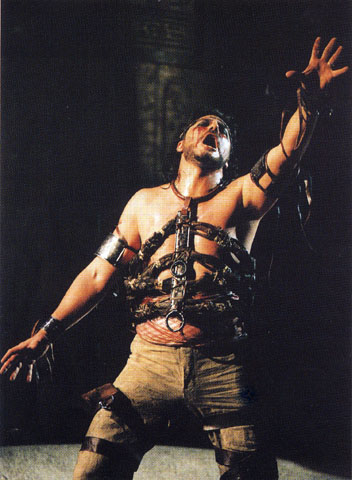
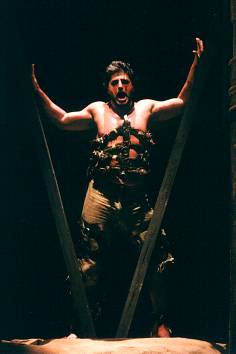
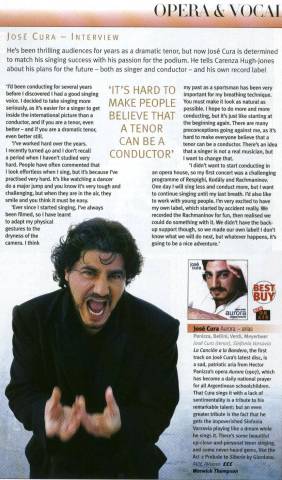 He’s
been thrilling audiences for years as a dramatic tenor,
but now José Cura is determined to match his singing
success with his passion for the podium. He tells
Carenza Hugh-Jones about his plans for the future - -
both as singer and conductor - - and his own record
label
He’s
been thrilling audiences for years as a dramatic tenor,
but now José Cura is determined to match his singing
success with his passion for the podium. He tells
Carenza Hugh-Jones about his plans for the future - -
both as singer and conductor - - and his own record
label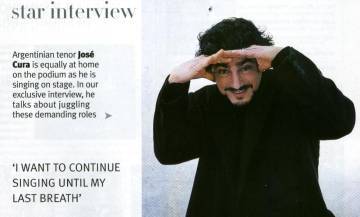
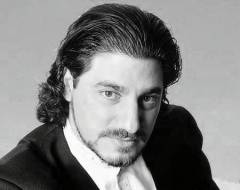
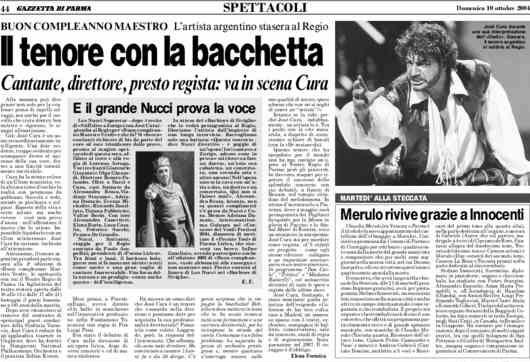 To
his Mom he ought to say thank you not only for the head
of “wild” hair, but also for the brain that’s inside: a
brain well nourished and powerfully energetic, the
synaptic connectors highly trained. Of course, José Cura
is a man of extraordinary intelligence, an obvious gift,
too evident to take a backseat to the success of his
voice or to hide behind a physicality made for the
stage. Cura has the quick mind of a Ulysses-like
musician; he flies high but keeps an eye on reality with
the readiness of a gull. He passes over (a target),
spots it, descends in a nose dive and strikes. He is
experienced at life and certainly shrewd, but also
“true, genuine”—that is to say, not without anxiety—in
confronting new things that attract him. It’s impossible
to settle him down with a “That doesn’t interest me”.
Cura has charisma: he nails you to attention.
To
his Mom he ought to say thank you not only for the head
of “wild” hair, but also for the brain that’s inside: a
brain well nourished and powerfully energetic, the
synaptic connectors highly trained. Of course, José Cura
is a man of extraordinary intelligence, an obvious gift,
too evident to take a backseat to the success of his
voice or to hide behind a physicality made for the
stage. Cura has the quick mind of a Ulysses-like
musician; he flies high but keeps an eye on reality with
the readiness of a gull. He passes over (a target),
spots it, descends in a nose dive and strikes. He is
experienced at life and certainly shrewd, but also
“true, genuine”—that is to say, not without anxiety—in
confronting new things that attract him. It’s impossible
to settle him down with a “That doesn’t interest me”.
Cura has charisma: he nails you to attention.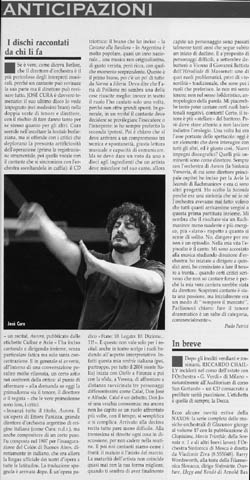 ertion--on
being asked whether the tenor, the conductor or the producer was
the prima donna today- that the critics themselves are the real
prima donnas, one becomes aware of a definite resentment toward
the confrontations of the critics right in the middle of an
otherwise very relaxed conversation.
ertion--on
being asked whether the tenor, the conductor or the producer was
the prima donna today- that the critics themselves are the real
prima donnas, one becomes aware of a definite resentment toward
the confrontations of the critics right in the middle of an
otherwise very relaxed conversation.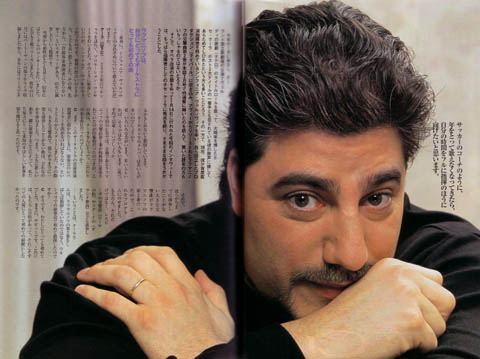 NM--
When the orchestra increased the number of performances
conducted by José Cura, does the performance itself change too?
NM--
When the orchestra increased the number of performances
conducted by José Cura, does the performance itself change too?
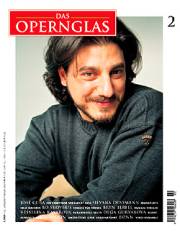 "Very
hot heart and very cold mind!"
"Very
hot heart and very cold mind!"
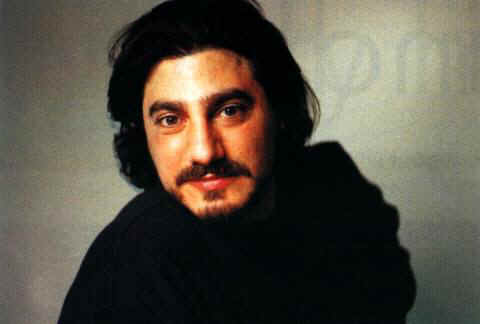 This
is true - but only partly. I also moved to Europe
because of the substantial economic crisis we were
experiencing already at that time in Argentina. Of
course, as a tenor - lyrico-spinto - it was much easier
for me to get into the business. I abandoned conducting
for 6 or 7 years and have only slowly taken it up
again since 1998. It increased in 2001 when I was
appointed Principal Guest Conductor of Sinfonia Varsovia.
This
is true - but only partly. I also moved to Europe
because of the substantial economic crisis we were
experiencing already at that time in Argentina. Of
course, as a tenor - lyrico-spinto - it was much easier
for me to get into the business. I abandoned conducting
for 6 or 7 years and have only slowly taken it up
again since 1998. It increased in 2001 when I was
appointed Principal Guest Conductor of Sinfonia Varsovia.
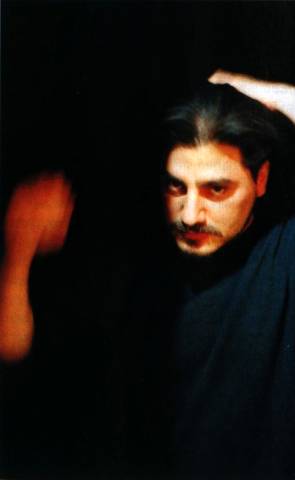 It
was, in fact, a very pragmatic solution that
allows me to do both - singing and conducting -
in the same evening.
It
was, in fact, a very pragmatic solution that
allows me to do both - singing and conducting -
in the same evening.
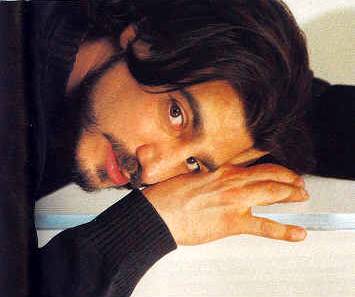 I
think it important during rehearsal to bring out all the
emotions that will later be interpreted vocally and
musically. In some cases [it's important] even to
exaggerate the emotions, to force extremes to know how
far one can go. During the performance, the art is not
to cross that border but stop just at the limit. When I
conduct, I have already given so much of my physical
energy during rehearsals that the orchestra understands
my intentions. During the concert, my gestures are
noticeably less. The formula is then "very hot heart and
very cold mind."
I
think it important during rehearsal to bring out all the
emotions that will later be interpreted vocally and
musically. In some cases [it's important] even to
exaggerate the emotions, to force extremes to know how
far one can go. During the performance, the art is not
to cross that border but stop just at the limit. When I
conduct, I have already given so much of my physical
energy during rehearsals that the orchestra understands
my intentions. During the concert, my gestures are
noticeably less. The formula is then "very hot heart and
very cold mind." 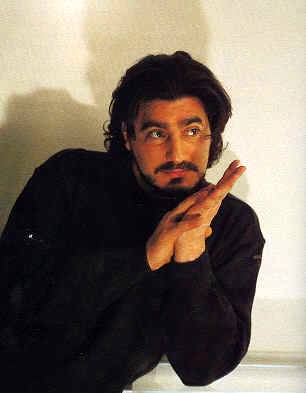 This
orchestra does not have a principal conductor. It
is a free-lance orchestra. It also has no "season,"
no regular concert series, etc... So it would not
make sense to have a principal conductor. As the
"Principal Guest Conductor" I am holding the highest
conducting function and am conducting concerts as
they are scheduled. If they had a fixed season, it
would be impossible for me to act as principal
conductor - my tight schedule would not allow it.
This
orchestra does not have a principal conductor. It
is a free-lance orchestra. It also has no "season,"
no regular concert series, etc... So it would not
make sense to have a principal conductor. As the
"Principal Guest Conductor" I am holding the highest
conducting function and am conducting concerts as
they are scheduled. If they had a fixed season, it
would be impossible for me to act as principal
conductor - my tight schedule would not allow it.
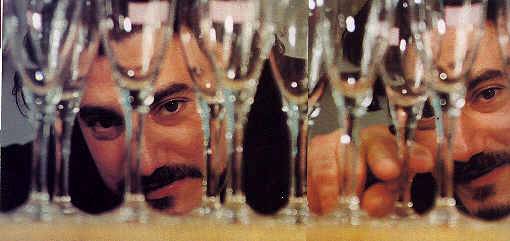
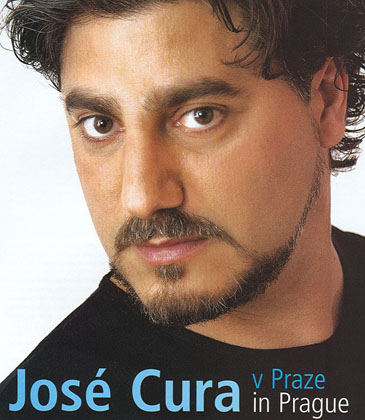 The
year 2003 was extraordinarily kind to the fans of José Cura who
visited Prague twice in his double role as conductor and tenor.
Both concerts took place at the Smetana Hall of the Municipal
House, the first at the end of January with the accompaniment of
the Prague Symphony Orchestra, the second on 23 October with the
Prague Philharmonia. The concerts were organized by Panart
agency and our hotels became the official partners. It is no
longer a secret, that during his second time in Prague, José
Cura spent most of his time in the recording studio with the
pianist Irina Kondratenko, recording Dvorak’s “Love Songs”.
Despite his busy schedule, José Cura found some time to answer
few of our questions.
The
year 2003 was extraordinarily kind to the fans of José Cura who
visited Prague twice in his double role as conductor and tenor.
Both concerts took place at the Smetana Hall of the Municipal
House, the first at the end of January with the accompaniment of
the Prague Symphony Orchestra, the second on 23 October with the
Prague Philharmonia. The concerts were organized by Panart
agency and our hotels became the official partners. It is no
longer a secret, that during his second time in Prague, José
Cura spent most of his time in the recording studio with the
pianist Irina Kondratenko, recording Dvorak’s “Love Songs”.
Despite his busy schedule, José Cura found some time to answer
few of our questions. 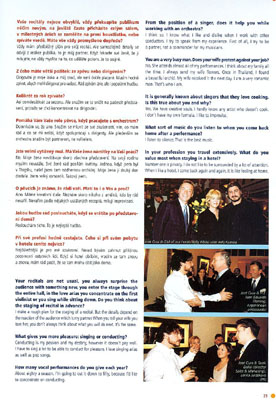 I
think so. I know what I like and dislike when I work with other
conductors. I try to speak from my experience. First of all, I
try to be a partner, not a commander for my musicians.
I
think so. I know what I like and dislike when I work with other
conductors. I try to speak from my experience. First of all, I
try to be a partner, not a commander for my musicians.
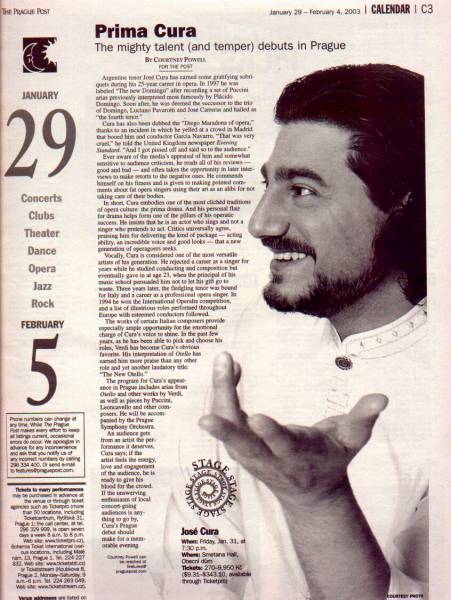 Argentine
tenor Jose Cura has earned some gratifying nicknames during his
25-year career in opera. In 1997 he was labeled “The new
Domingo” after recording the Puccini Arias, previously
interpreted most famously by Placido Domingo. Soon after, he was
deemed the successor to the trio of Domingo, Luciano Pavarotti
and Jose Carreras and hailed as “the fourth tenor.”
Argentine
tenor Jose Cura has earned some gratifying nicknames during his
25-year career in opera. In 1997 he was labeled “The new
Domingo” after recording the Puccini Arias, previously
interpreted most famously by Placido Domingo. Soon after, he was
deemed the successor to the trio of Domingo, Luciano Pavarotti
and Jose Carreras and hailed as “the fourth tenor.” 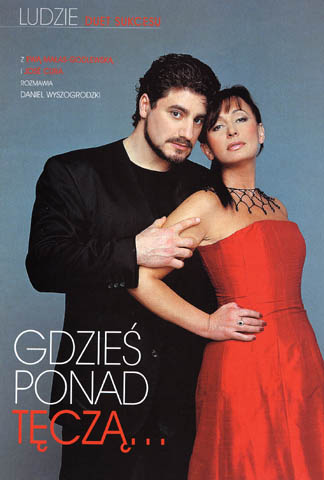
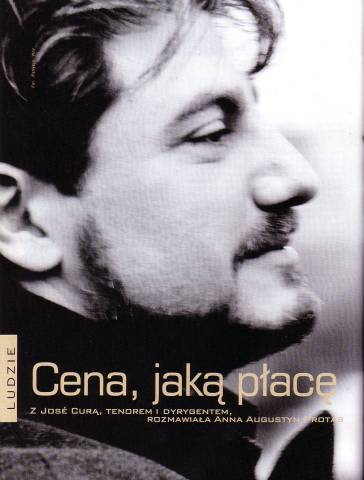 You
are a world famous tenor. You sing in the best opera houses. Why
did you become interested in Poland?
You
are a world famous tenor. You sing in the best opera houses. Why
did you become interested in Poland?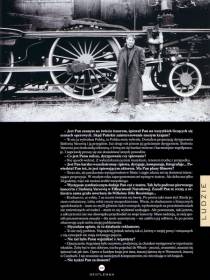 I
will not answer this question.
I
will not answer this question.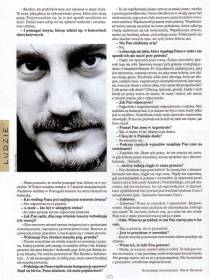 No.
I'm too busy. When I finish my work, I usually meet with
journalists...( laughter)
No.
I'm too busy. When I finish my work, I usually meet with
journalists...( laughter) 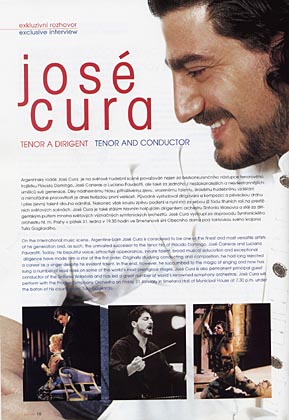 On
the international music scene, Argentine-born José Cura is
considered to be one of the finest and most versatile artists of
his generation and, as such, the unrivalled successor to the
tenor trio of Placido Domingo, José Carreras and Luciano
Pavarotti. Today, his beautiful voice, attractive appearance,
innate talent, broad musical education and exceptional diligence
have made him a star of the first order. Originally studying
conducting and composition, he had long rejected a career as a
singer despite his evident talent. In the end, however, he
succumbed to the magic of singing and now has sung a number of
lead roles on some of the world’s most prestigious stages. José
Cura is also permanent principal guest conductor of the Sinfonia
Warsovia and has led a great number of world’s renowned symphony
orchestras. José Cura will perform with the Prague Symphony
Orchestra on Friday 31 January in Smetana Hall of Municipal
House at 7:30 p.m. under the baton of his countryman, Tulio
Gagliardo.
On
the international music scene, Argentine-born José Cura is
considered to be one of the finest and most versatile artists of
his generation and, as such, the unrivalled successor to the
tenor trio of Placido Domingo, José Carreras and Luciano
Pavarotti. Today, his beautiful voice, attractive appearance,
innate talent, broad musical education and exceptional diligence
have made him a star of the first order. Originally studying
conducting and composition, he had long rejected a career as a
singer despite his evident talent. In the end, however, he
succumbed to the magic of singing and now has sung a number of
lead roles on some of the world’s most prestigious stages. José
Cura is also permanent principal guest conductor of the Sinfonia
Warsovia and has led a great number of world’s renowned symphony
orchestras. José Cura will perform with the Prague Symphony
Orchestra on Friday 31 January in Smetana Hall of Municipal
House at 7:30 p.m. under the baton of his countryman, Tulio
Gagliardo. 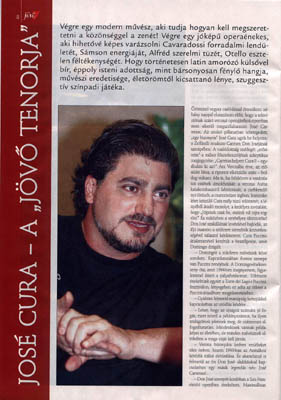 At
last a modern artist who knows how to make the audience get to
like music! At last a good-looking opera singer who is able to
make credible Cavaradossi’s revolutionary impulse, Samson’s
energy, Alfredo’s fiery love, Otello’s insane jealousy. That by
chance he happens to have the appearance of a Latin lover is a
gift of God as is his rich velvety voice, artistic originality,
his being of exuberant vitality, and his suggestive stage
acting.
At
last a modern artist who knows how to make the audience get to
like music! At last a good-looking opera singer who is able to
make credible Cavaradossi’s revolutionary impulse, Samson’s
energy, Alfredo’s fiery love, Otello’s insane jealousy. That by
chance he happens to have the appearance of a Latin lover is a
gift of God as is his rich velvety voice, artistic originality,
his being of exuberant vitality, and his suggestive stage
acting.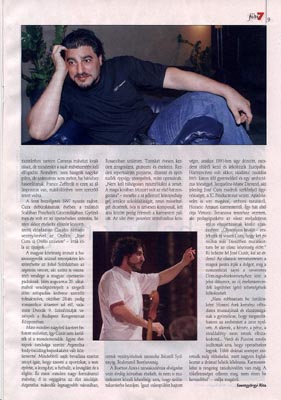 After
studying at the academy of music in Buenos Aires he sang in
chorus for years and no prospective opportunity showed itself to
start a career as a soloist. It was a real blind-flight when in
1991 he decided to start everything from the beginning again and
moved to Europe. He was thirty years old at that time and in
addition to this he had a family: with an infant in arms and a
supportive wife, Silvia, who currently manages JC Productions in
Madrid. He also took a reference with him from his teacher at
home, the conductor Horacio Amauri. So he found his way to the
tenor Vittorio Terranova, an excellent expert and teacher of the
Italian melodramatic style. “He is so excellent,” recalls Cura,
“that in two years’ time I debuted in front of the Italian
audience in Trieste.” Who discovered José Cura, whose is the
merit? The Italians of course say that it is theirs, while the
international press connects the illustrious date, the discovery
of the new singer generation's most promising talent, to the
Domingo singing competition.
After
studying at the academy of music in Buenos Aires he sang in
chorus for years and no prospective opportunity showed itself to
start a career as a soloist. It was a real blind-flight when in
1991 he decided to start everything from the beginning again and
moved to Europe. He was thirty years old at that time and in
addition to this he had a family: with an infant in arms and a
supportive wife, Silvia, who currently manages JC Productions in
Madrid. He also took a reference with him from his teacher at
home, the conductor Horacio Amauri. So he found his way to the
tenor Vittorio Terranova, an excellent expert and teacher of the
Italian melodramatic style. “He is so excellent,” recalls Cura,
“that in two years’ time I debuted in front of the Italian
audience in Trieste.” Who discovered José Cura, whose is the
merit? The Italians of course say that it is theirs, while the
international press connects the illustrious date, the discovery
of the new singer generation's most promising talent, to the
Domingo singing competition. 
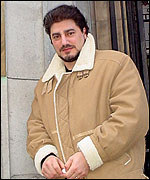 Why
do you include the "Song of the Flag" on your new CD?
Why
do you include the "Song of the Flag" on your new CD?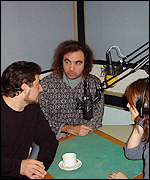 At
the end of the new CD, you include a track illustrating what
goes on behind the scenes, which humanizes your work a lot.
At
the end of the new CD, you include a track illustrating what
goes on behind the scenes, which humanizes your work a lot.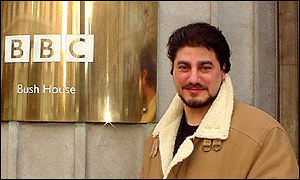 Besides
the guitar, you play various instruments...
Besides
the guitar, you play various instruments...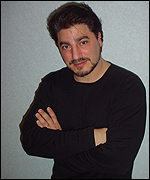
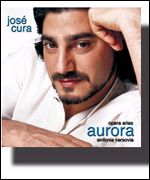

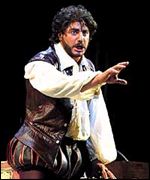
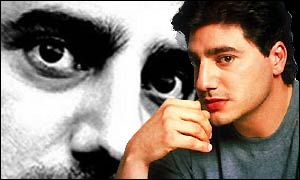
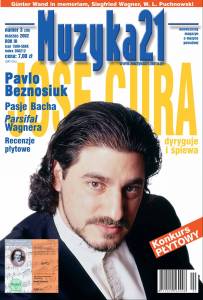 Aneta
Swider: What gives you more pleasure: singing or conducting?
Aneta
Swider: What gives you more pleasure: singing or conducting?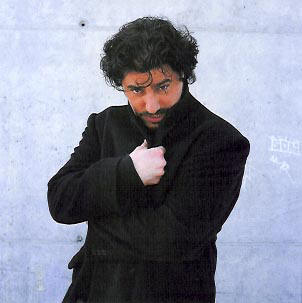 José
Cura reckons he's got the measure of journalists. As one of
opera's biggest and most glamorous stars, he's met hundreds in
his time and thinks they're only interested in one thing -
giving him a label. So as the man who's been variously dubbed
The Fourth Tenor, opera's Superman, The New Domingo, Argentinian
beefcake and sex object, he's ready to help out with one or two
of his own.
José
Cura reckons he's got the measure of journalists. As one of
opera's biggest and most glamorous stars, he's met hundreds in
his time and thinks they're only interested in one thing -
giving him a label. So as the man who's been variously dubbed
The Fourth Tenor, opera's Superman, The New Domingo, Argentinian
beefcake and sex object, he's ready to help out with one or two
of his own. 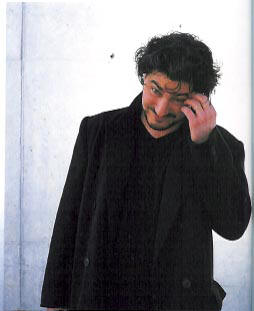 Though
not as close as the mentor-protégé relationship some have
portrayed, it's been a connection that has been useful to Cura,
not least in planting the idea of the conducting tenor. But
while Domingo was in his 30s when he first picked up the baton,
Cura was appointed principal guest conductor last year, at just
38, of the Polish Sinfonia Varsovia - inaugurated by the
Rachmaninov performance. It thrusts him into a serious second
career in parallel with his singing, at an age where conductors
are still deemed to be in first gear, while tenors should be in
overdrive. But he's now clearing his diary of singing dates to
make way for the conducting, aiming for a 50:50 balance. Far
from harming his singing, he says this dilution will be all for
the good.
Though
not as close as the mentor-protégé relationship some have
portrayed, it's been a connection that has been useful to Cura,
not least in planting the idea of the conducting tenor. But
while Domingo was in his 30s when he first picked up the baton,
Cura was appointed principal guest conductor last year, at just
38, of the Polish Sinfonia Varsovia - inaugurated by the
Rachmaninov performance. It thrusts him into a serious second
career in parallel with his singing, at an age where conductors
are still deemed to be in first gear, while tenors should be in
overdrive. But he's now clearing his diary of singing dates to
make way for the conducting, aiming for a 50:50 balance. Far
from harming his singing, he says this dilution will be all for
the good. 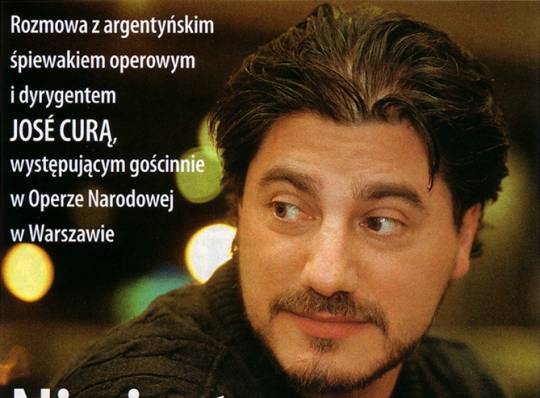 Dorota
Szwarcman: You work with Polish artists such as
Dorota
Szwarcman: You work with Polish artists such as
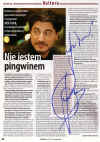 D.
S.: That's just your style.
D.
S.: That's just your style. 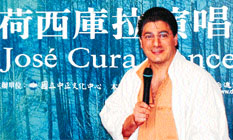
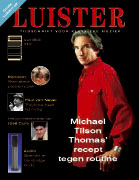
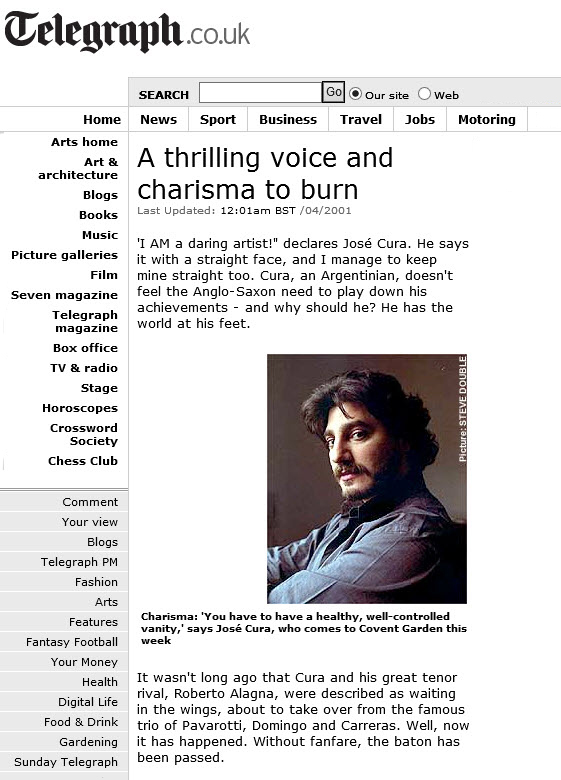

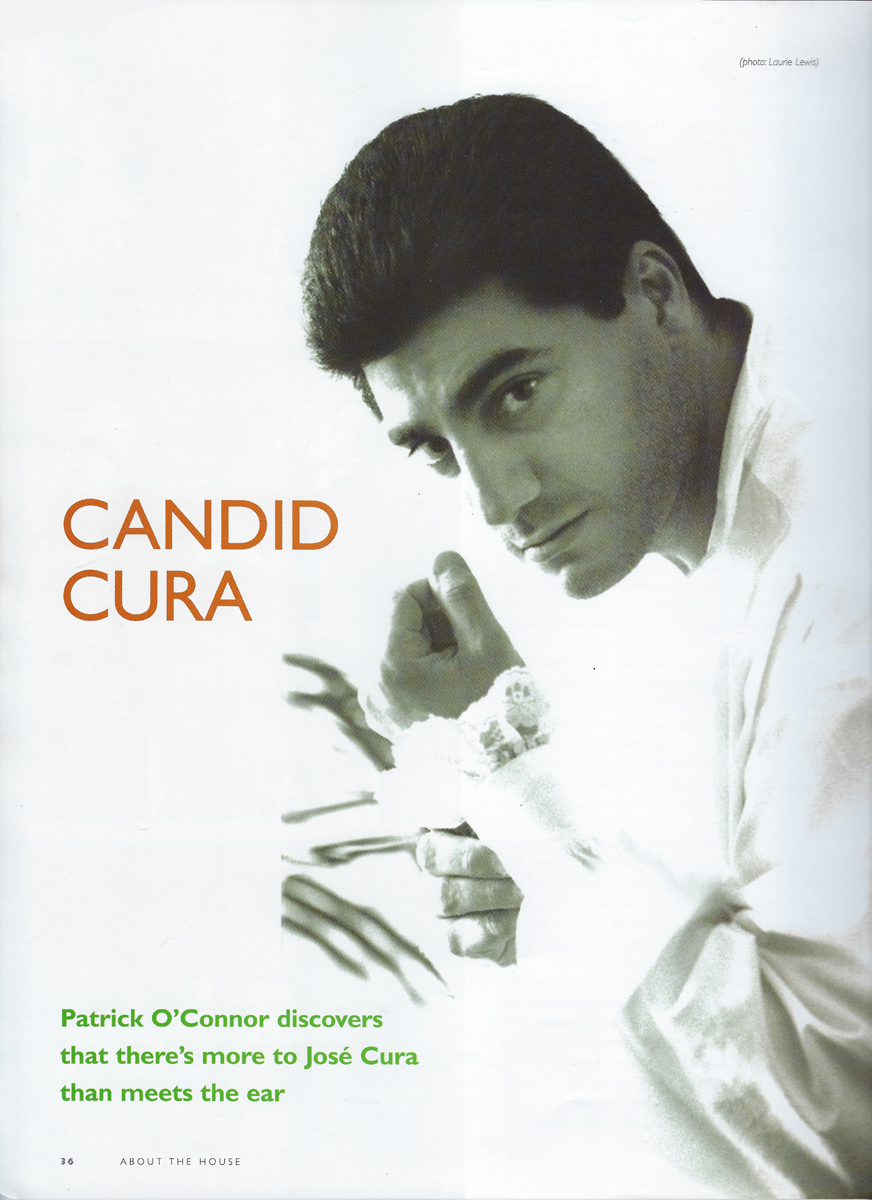
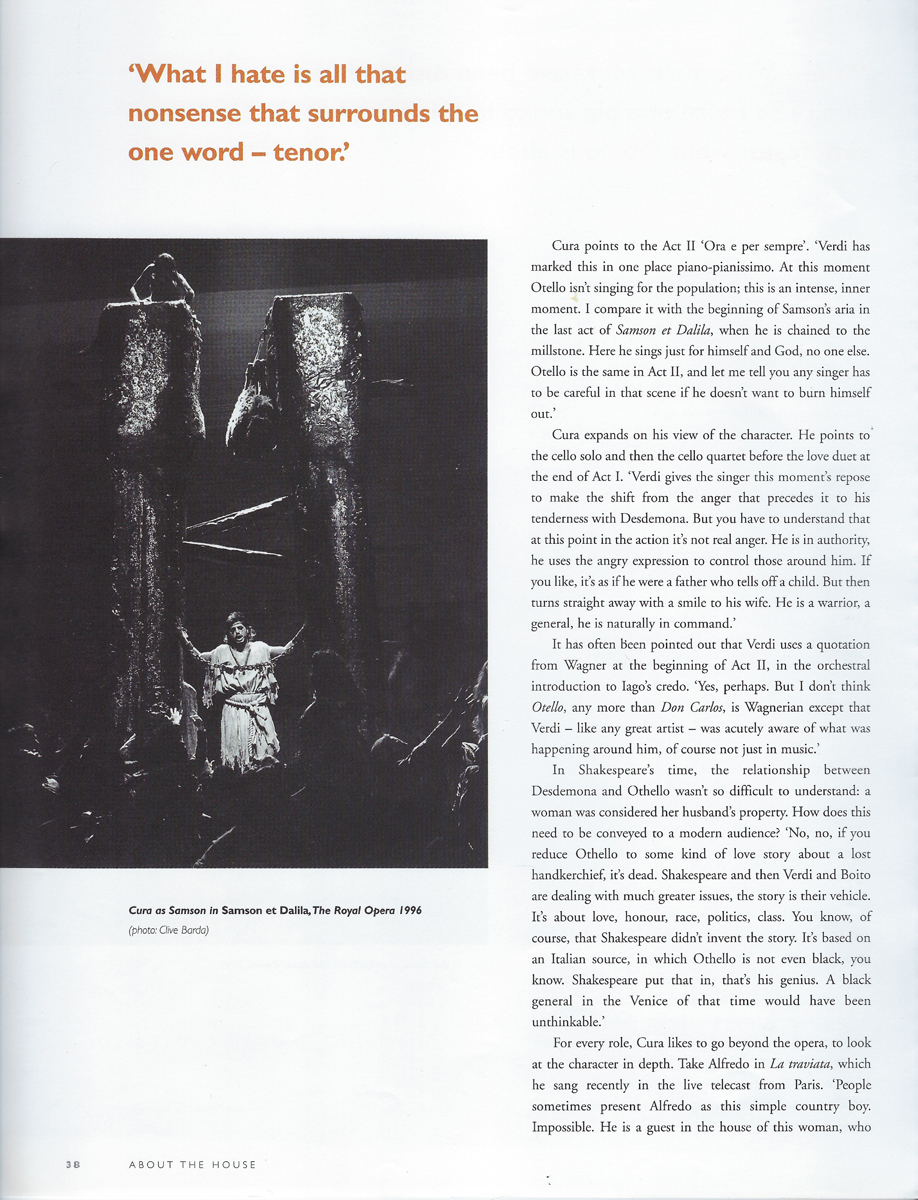
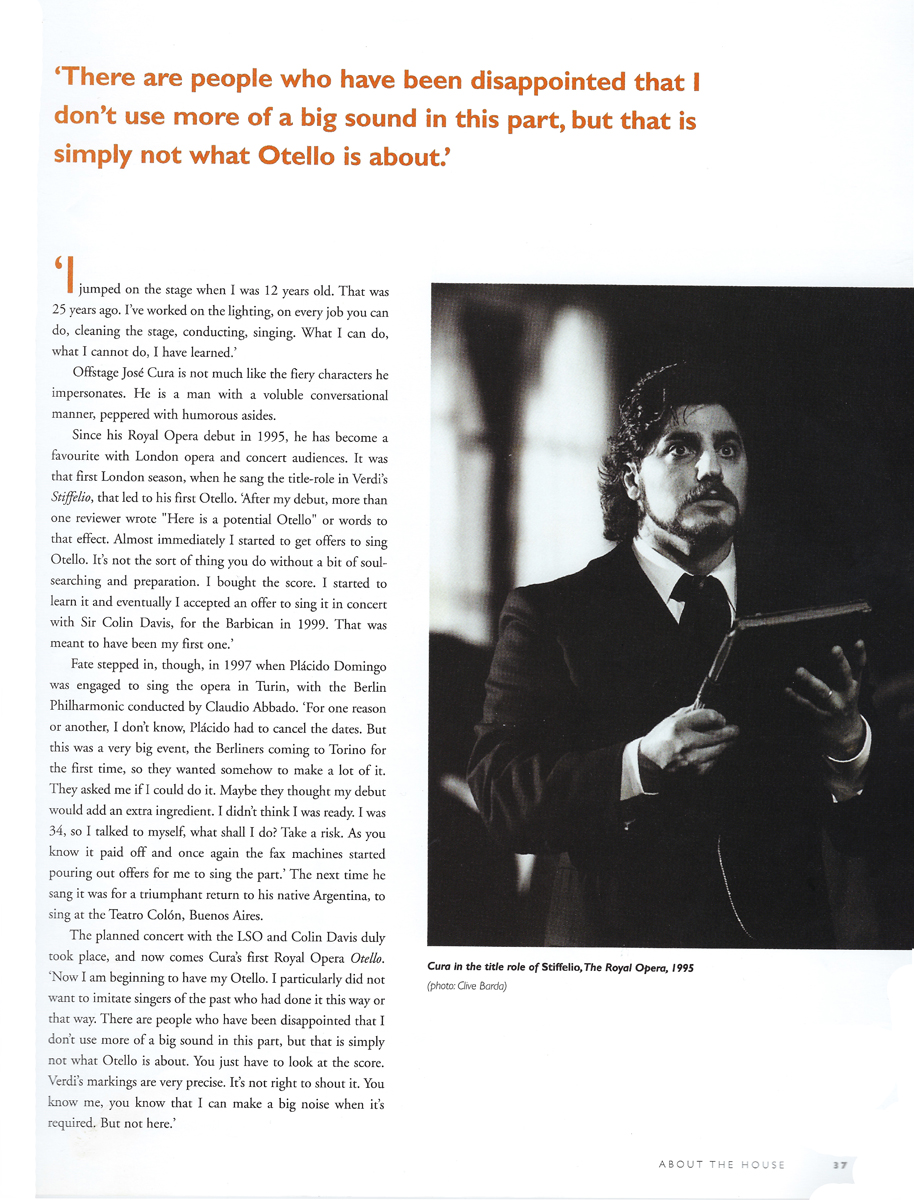
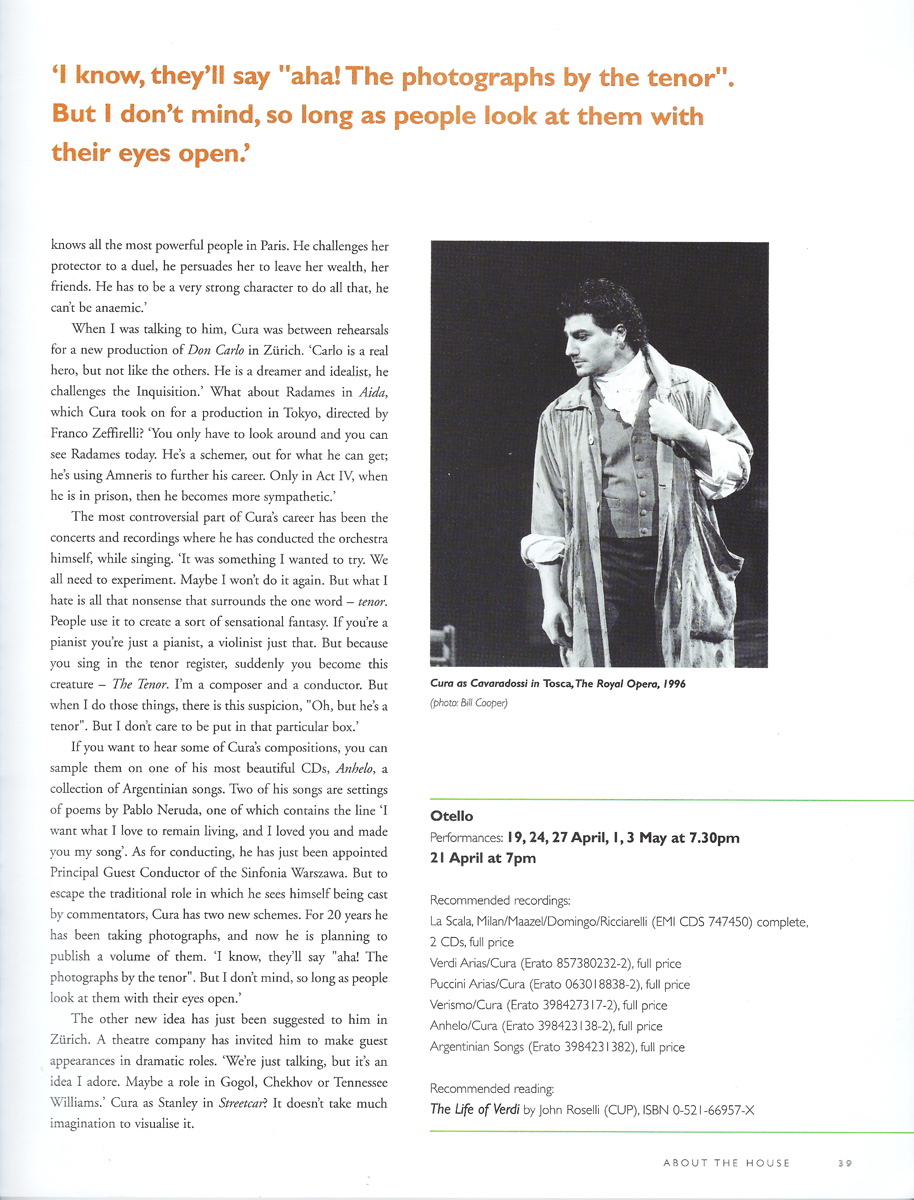
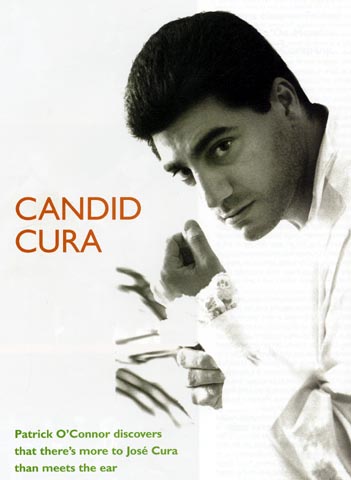 ‘I
jumped on the stage when I was 12 years old. That was
25 years ago. I’ve worked on the lighting, on every job
you can do, cleaning the stage, conducting, singing.
What I can do, what I cannot do, I have learned.’
‘I
jumped on the stage when I was 12 years old. That was
25 years ago. I’ve worked on the lighting, on every job
you can do, cleaning the stage, conducting, singing.
What I can do, what I cannot do, I have learned.’
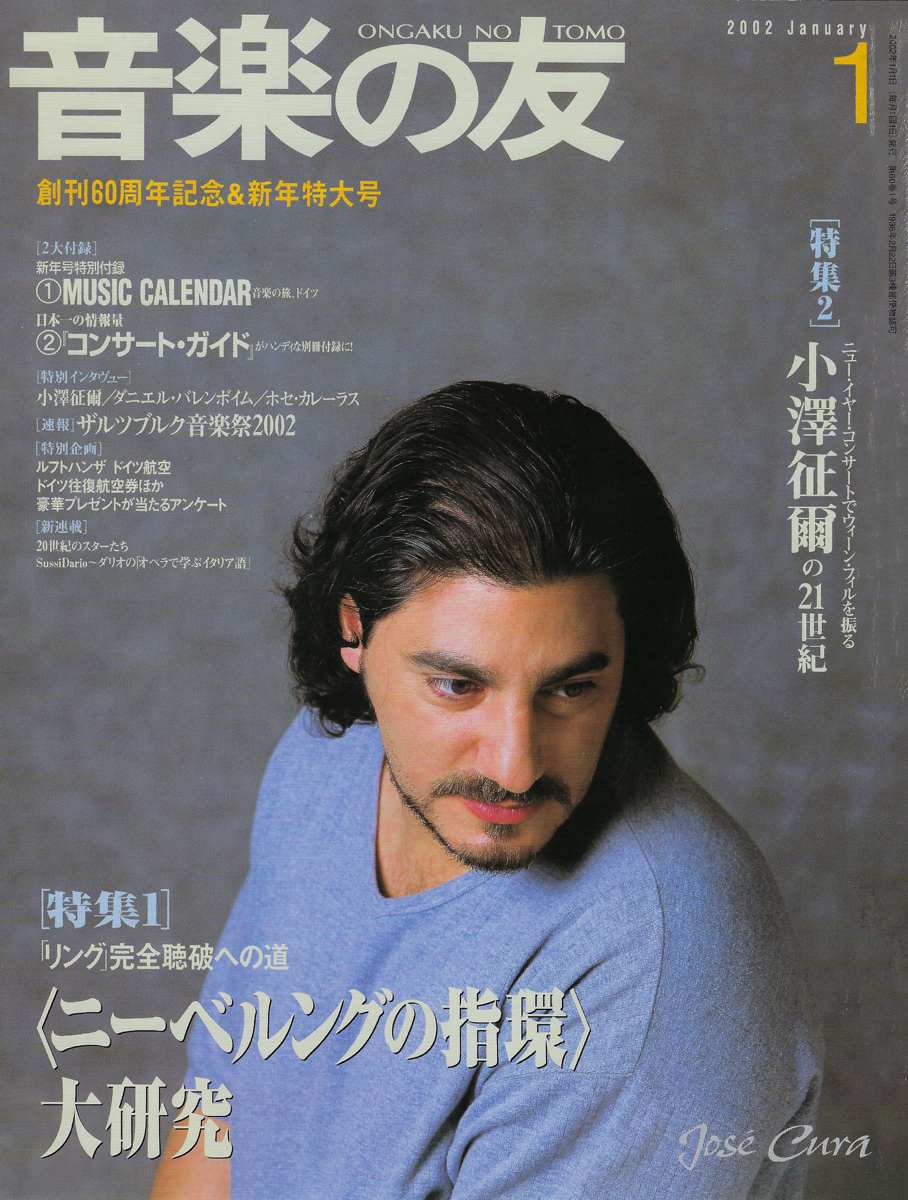
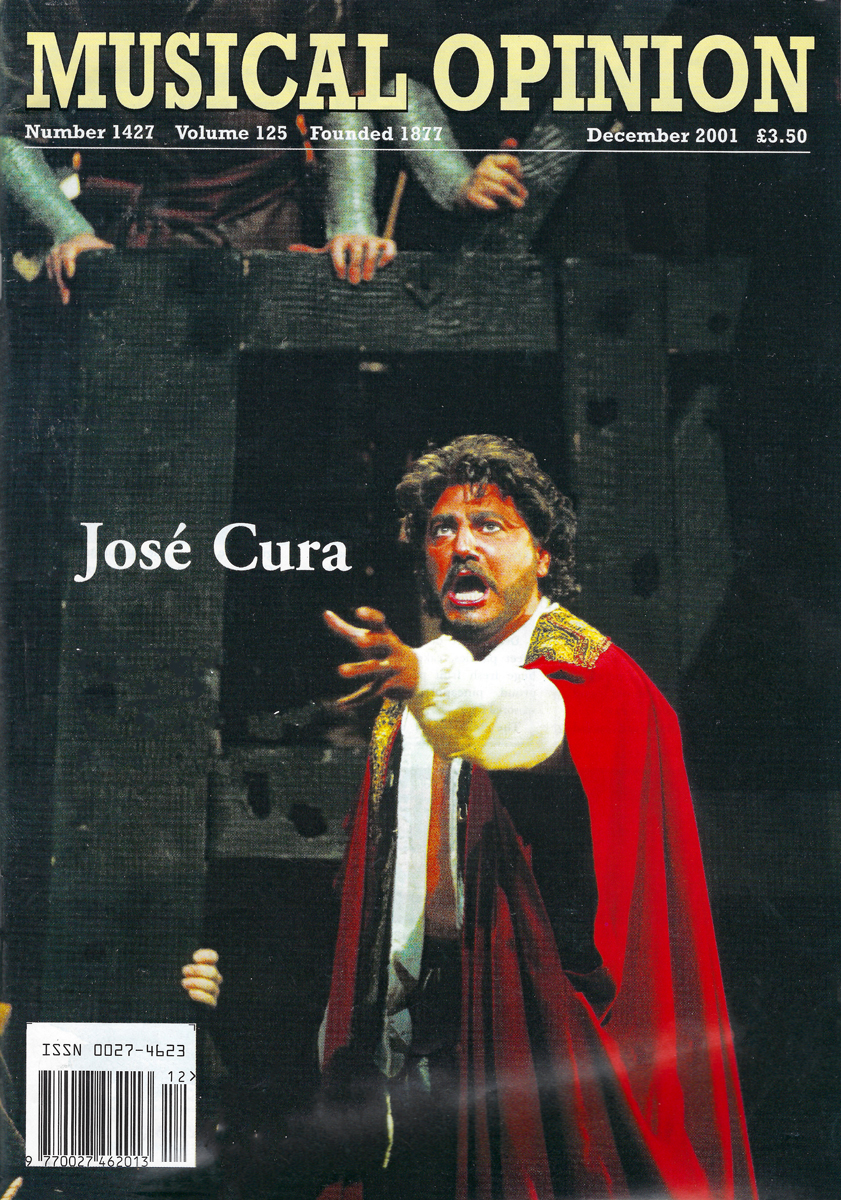
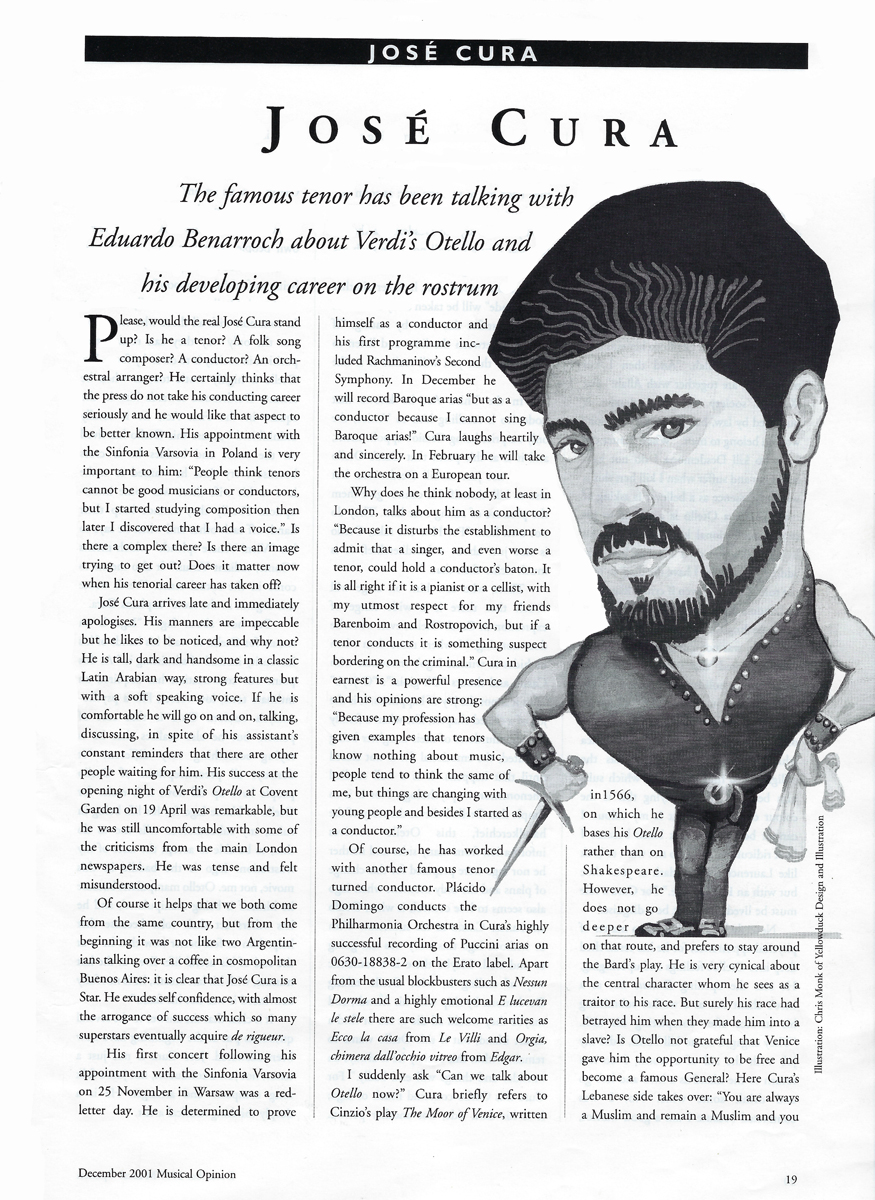
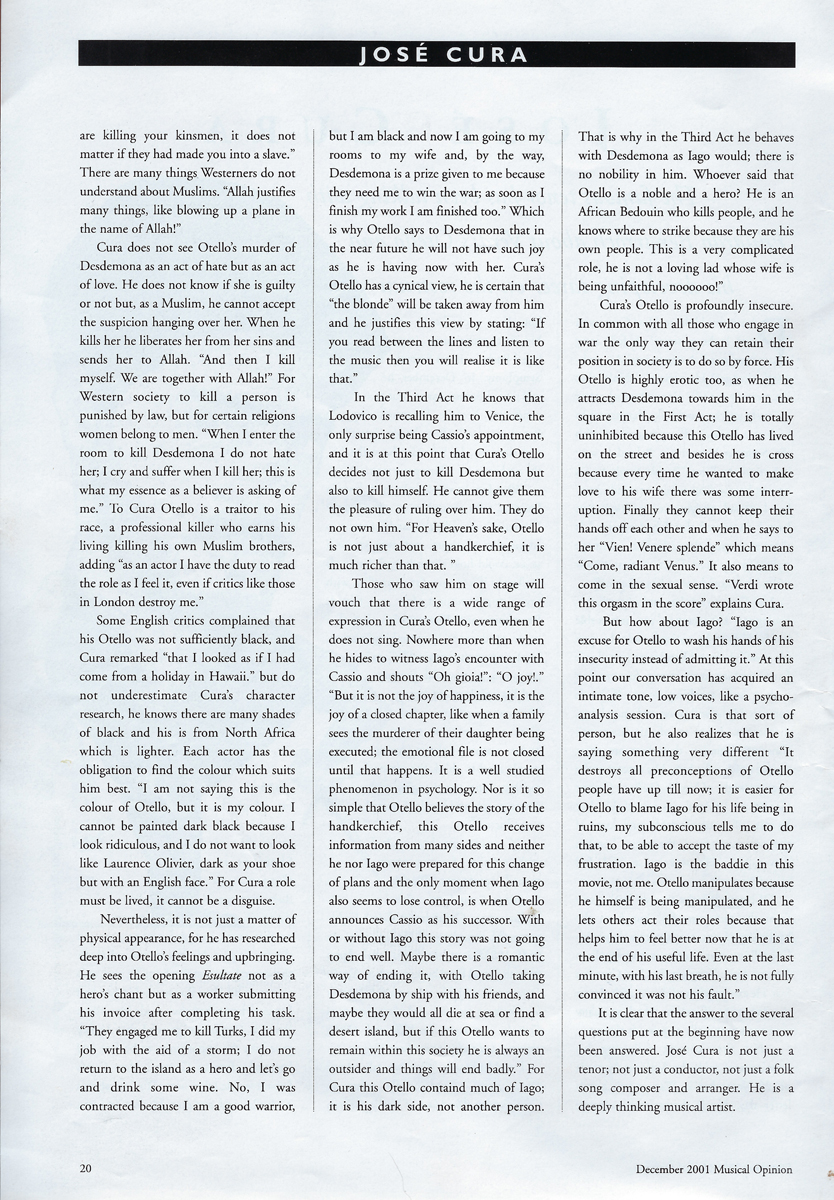
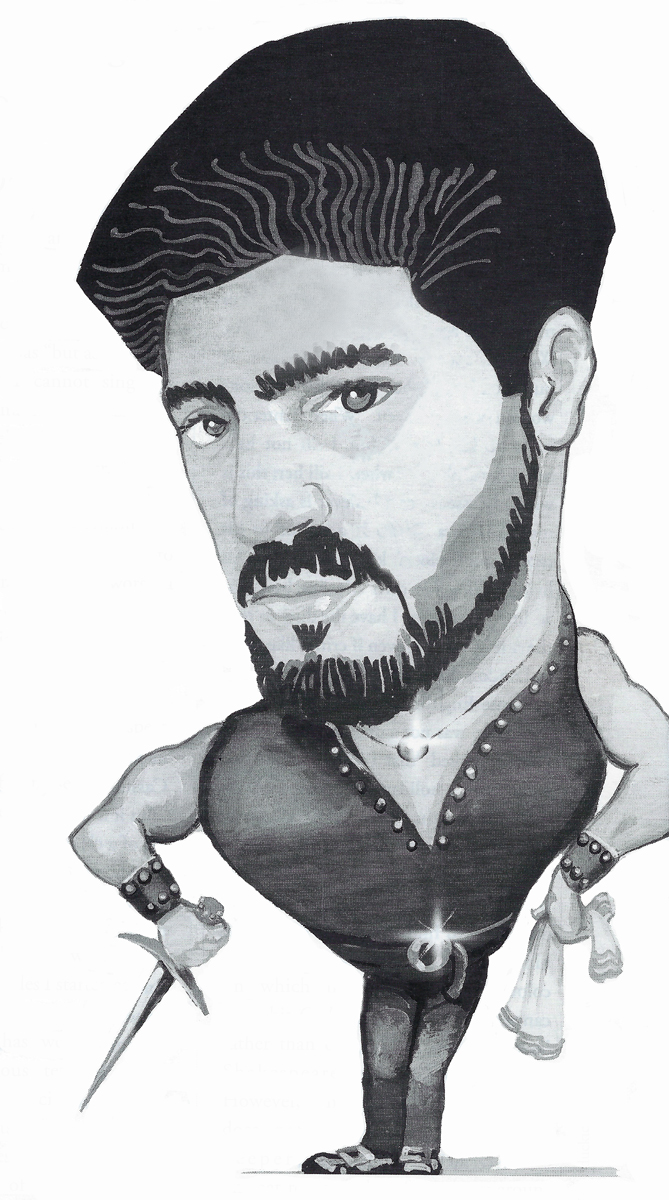
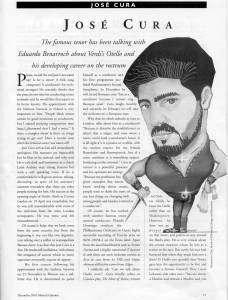 Please,
would the real José Cura stand up? Is he a tenor? A folk
song composer? A conductor? An orchestral arranger? He
certainly thinks that the press do not take his
conducting career seriously and he would like that
aspect to be better known. His appointment with the SV
in Poland is very important to him: "People think
tenors cannot be good musicians or conductors, but I
started studying composition then later I discovered
that I had a voice." Is there a complex there? Is there
image trying to get out? Does it matter now when his
tenorial career has taken off?
Please,
would the real José Cura stand up? Is he a tenor? A folk
song composer? A conductor? An orchestral arranger? He
certainly thinks that the press do not take his
conducting career seriously and he would like that
aspect to be better known. His appointment with the SV
in Poland is very important to him: "People think
tenors cannot be good musicians or conductors, but I
started studying composition then later I discovered
that I had a voice." Is there a complex there? Is there
image trying to get out? Does it matter now when his
tenorial career has taken off? 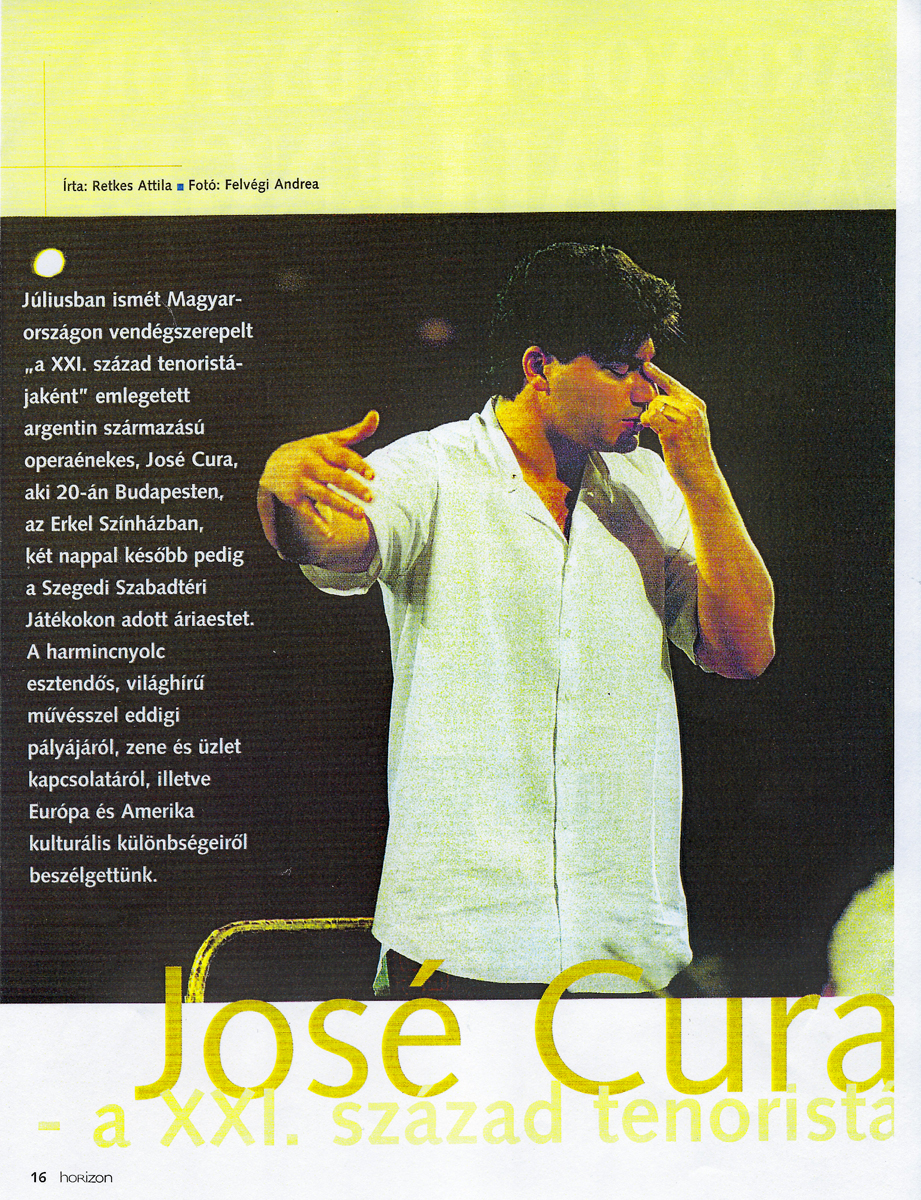
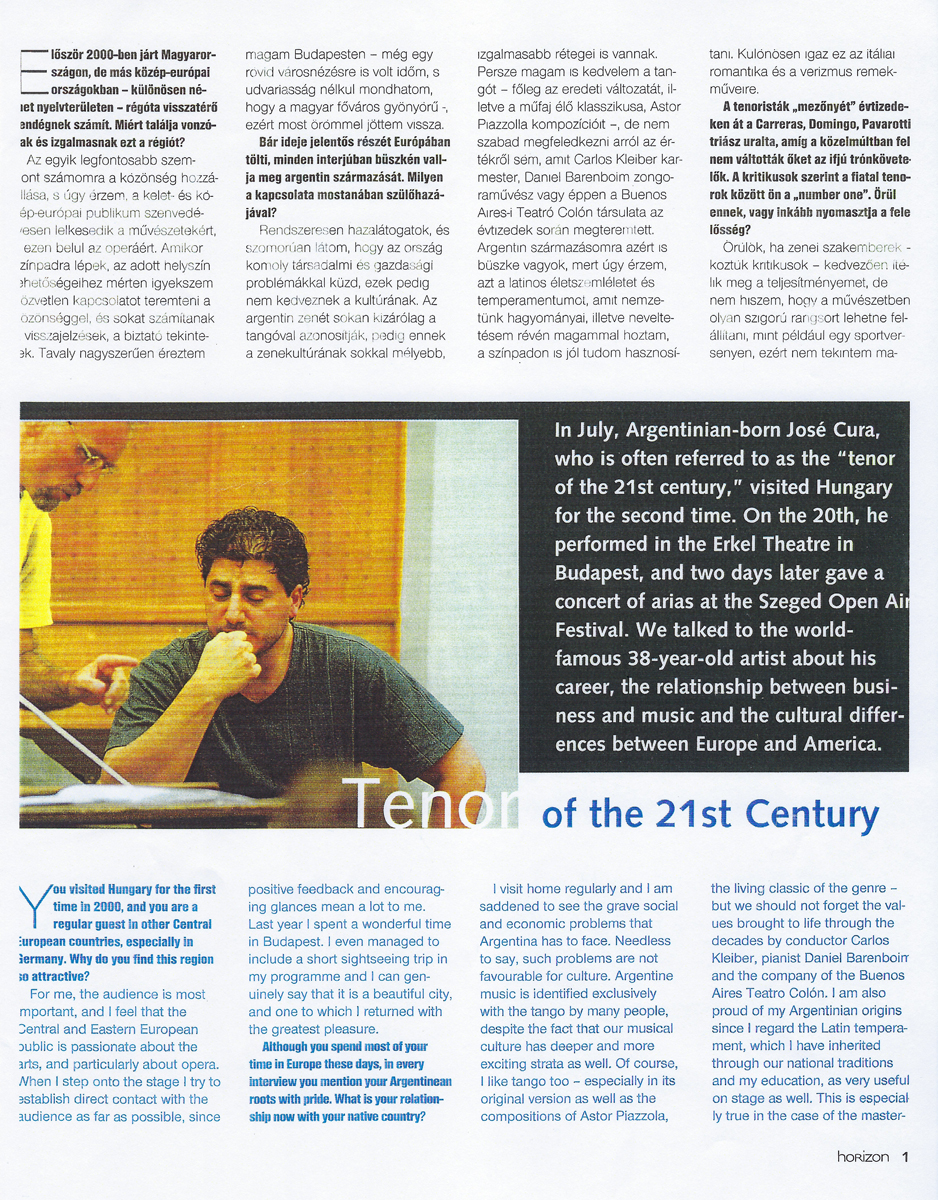
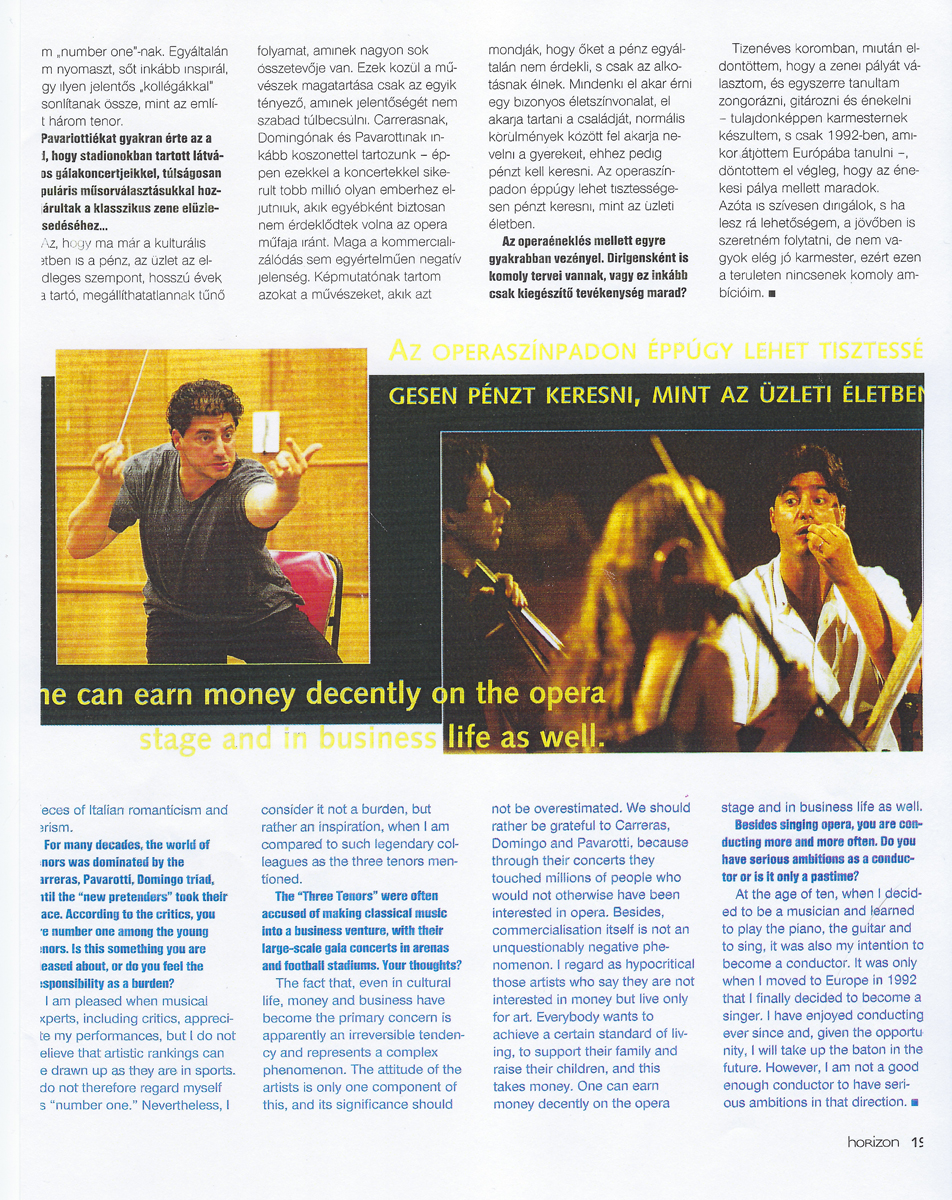
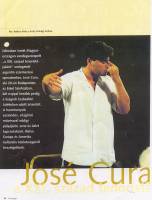
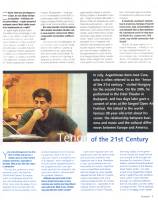
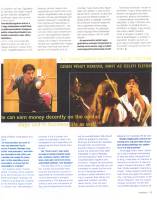
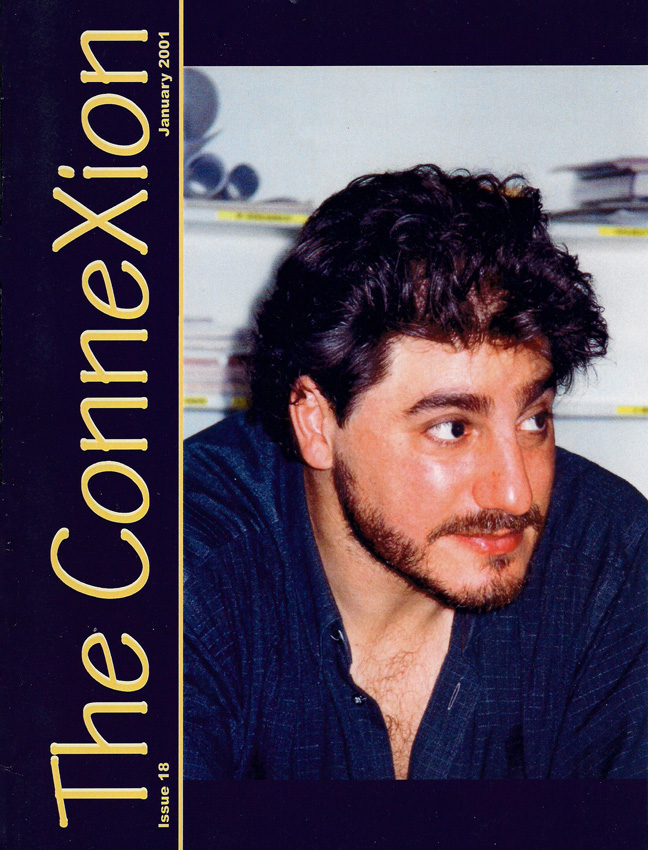 JA:
We start now with a question from Kira Carlton (way
to go, Kira!) What Kira is interested to know
is how you remember all the lyrics in an opera. How do
you manage not to get confused? Have you ever forgotten
where you are and what opera you’re in and what you’re
supposed to sing next? If it does happen what do you
do?
JA:
We start now with a question from Kira Carlton (way
to go, Kira!) What Kira is interested to know
is how you remember all the lyrics in an opera. How do
you manage not to get confused? Have you ever forgotten
where you are and what opera you’re in and what you’re
supposed to sing next? If it does happen what do you
do?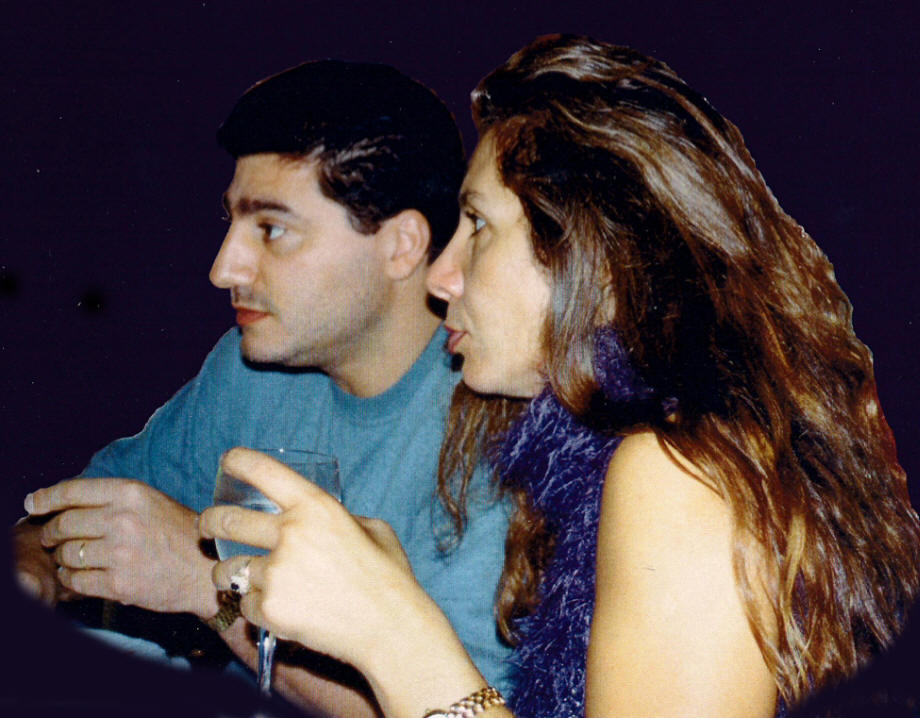
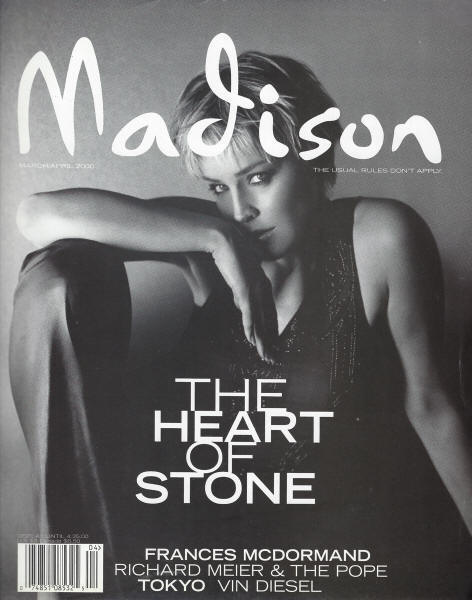
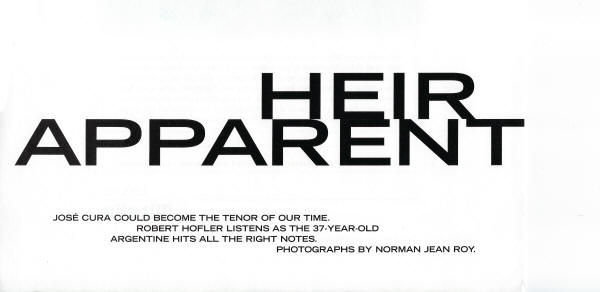
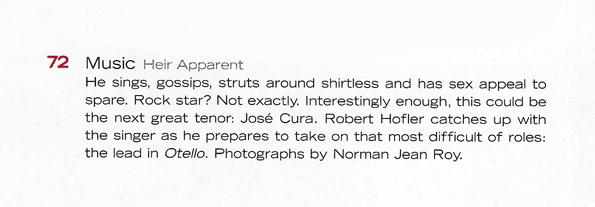
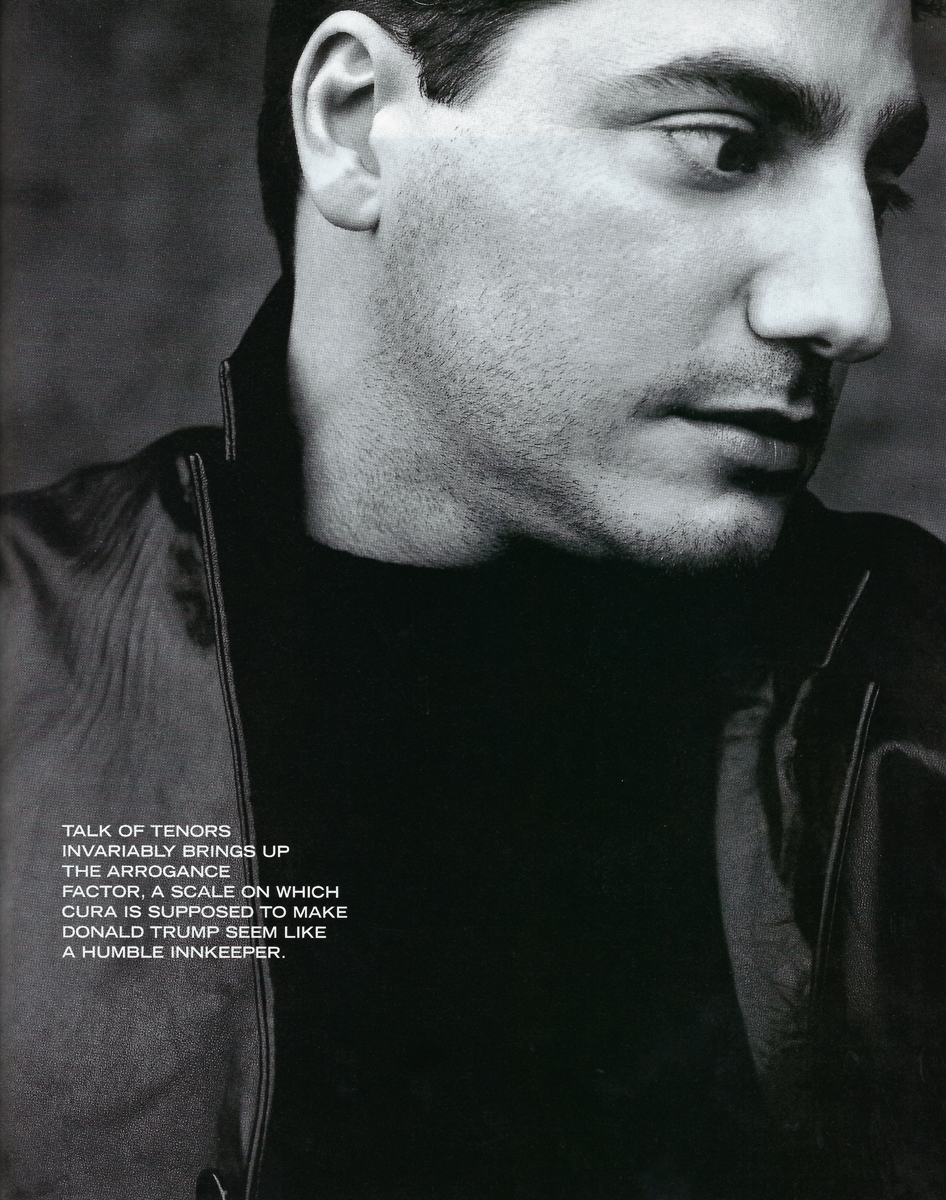
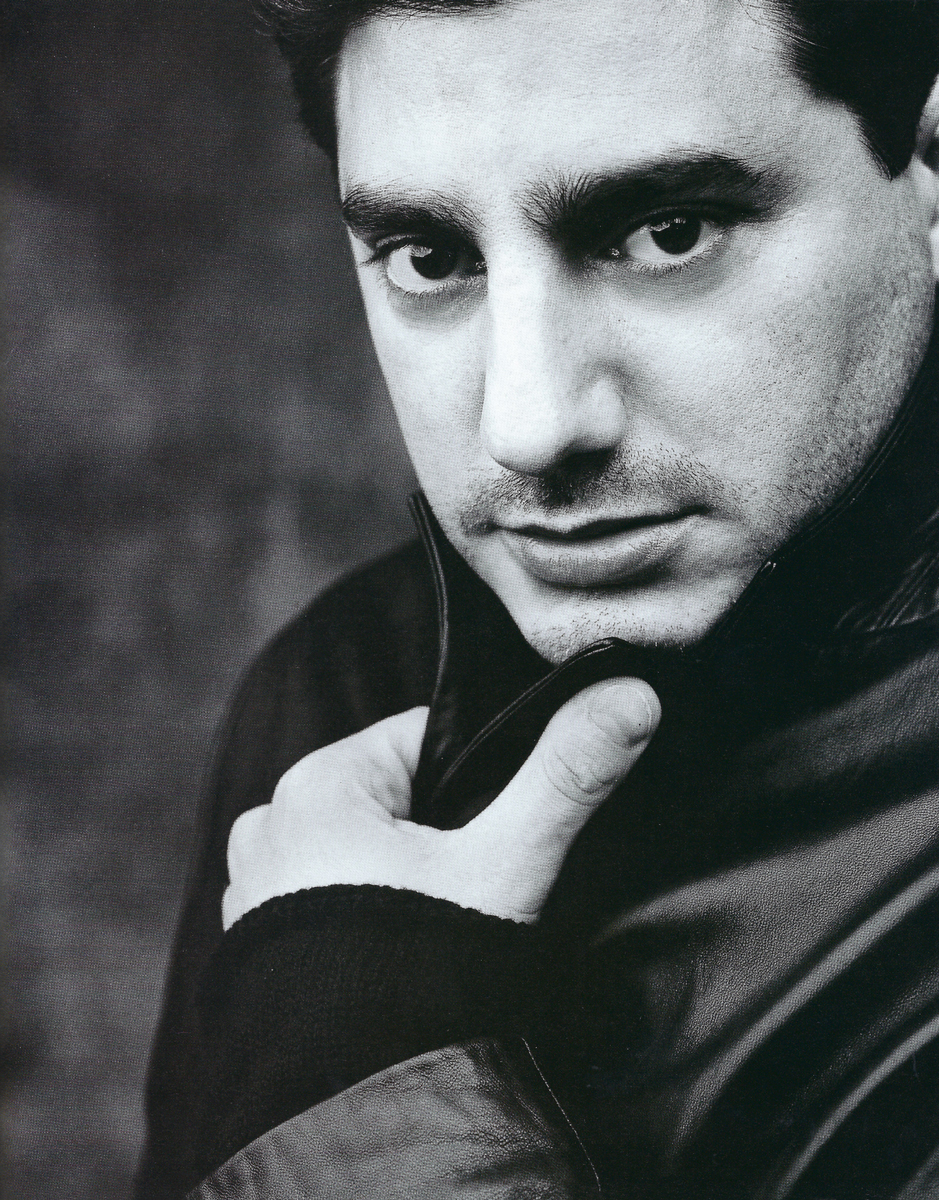
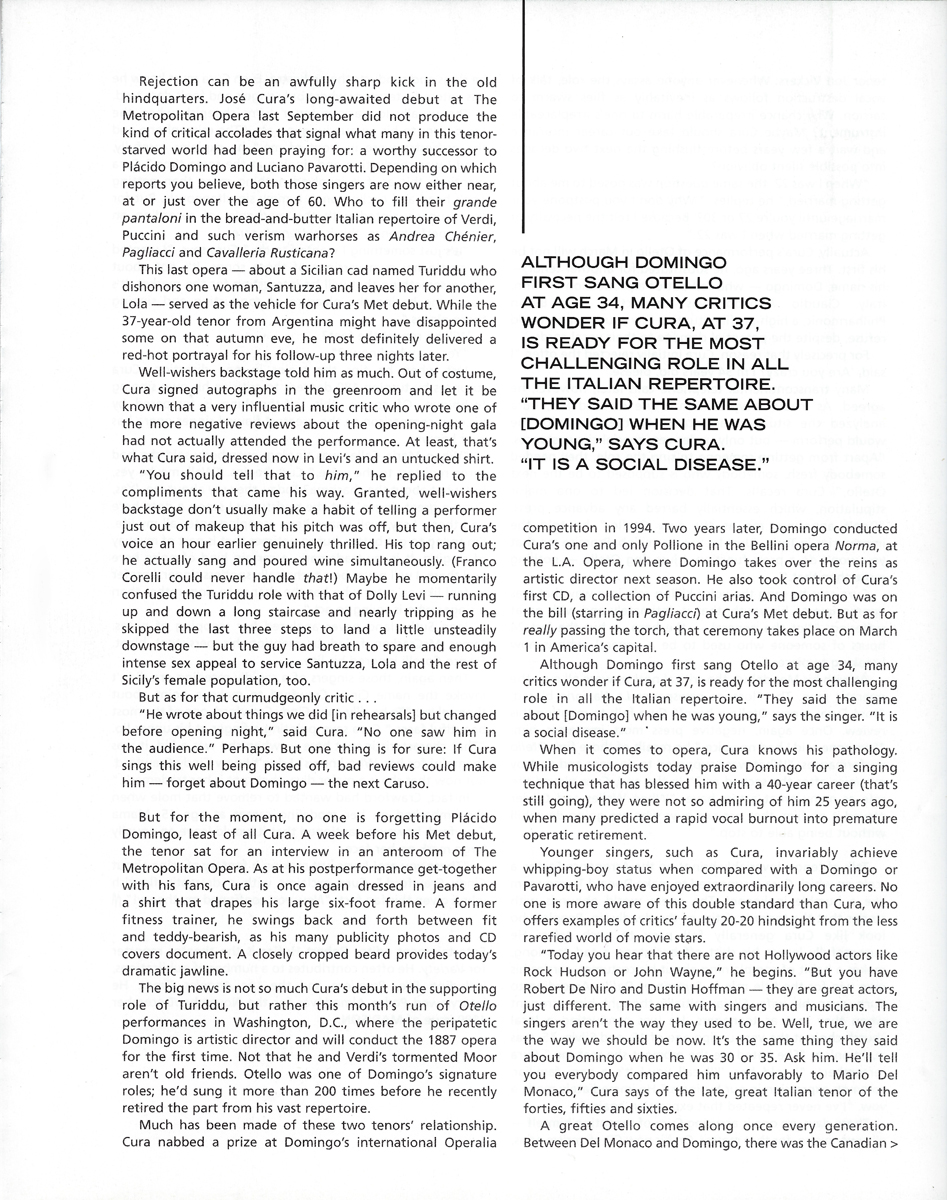
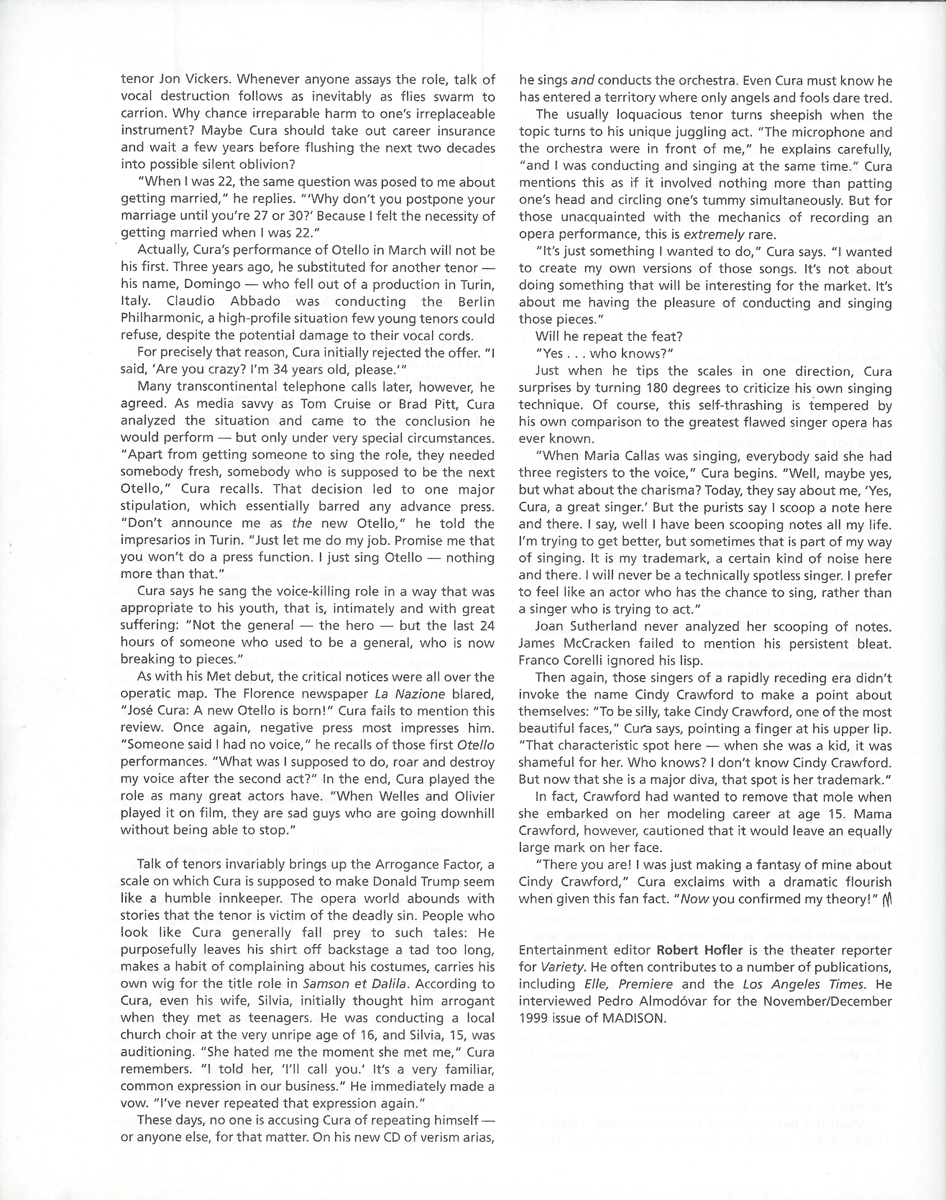
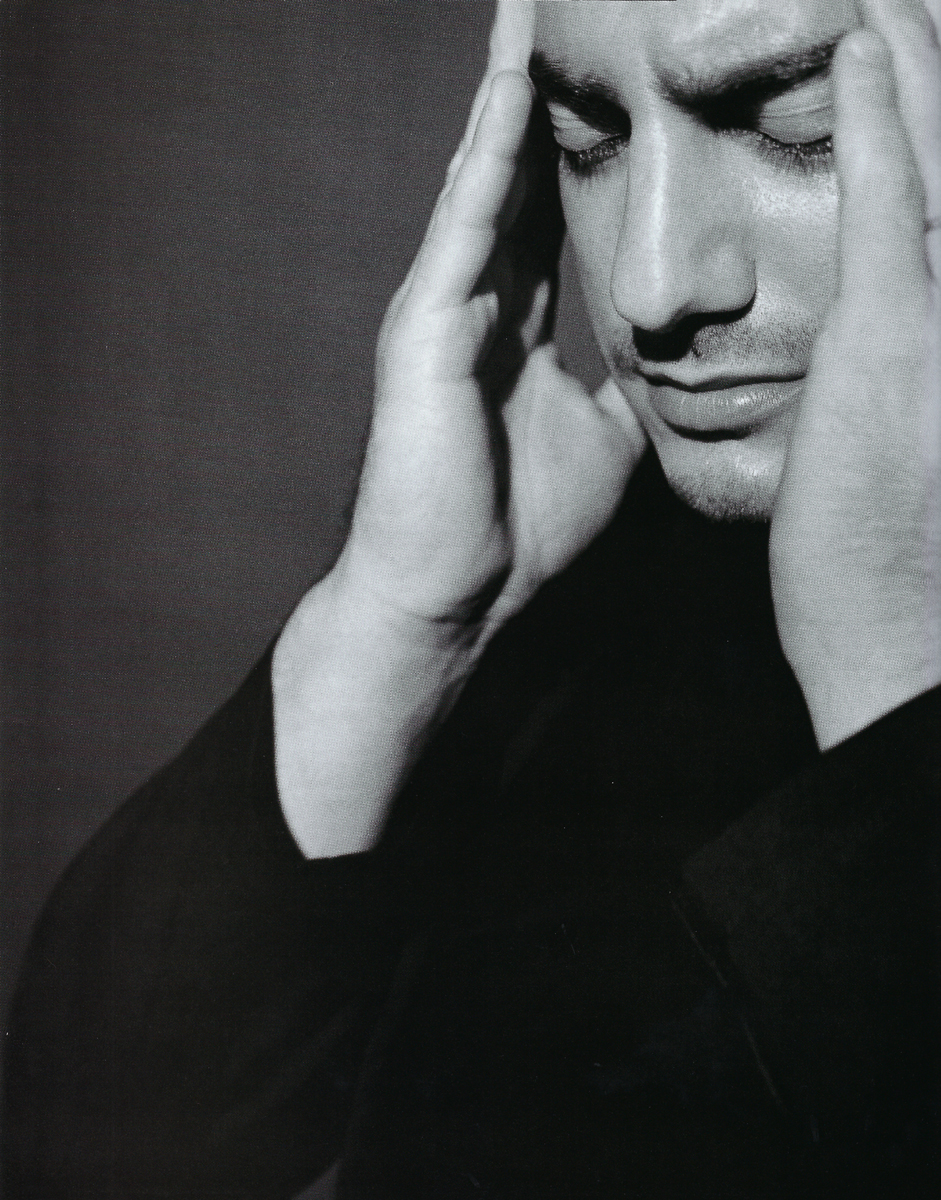
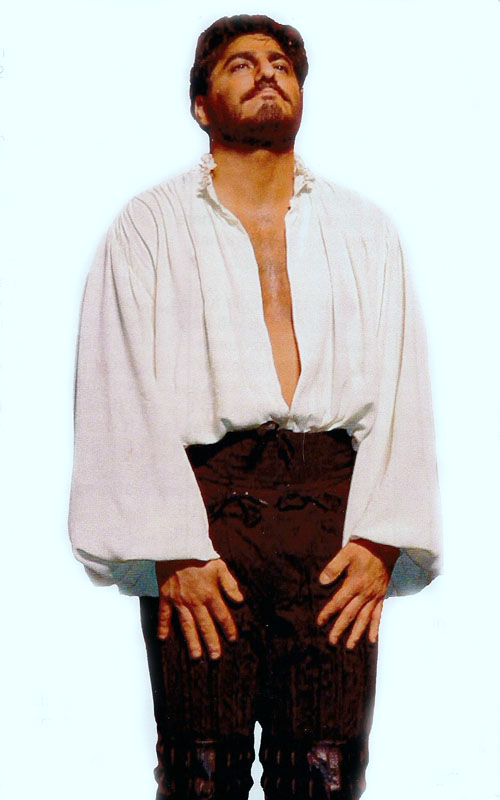
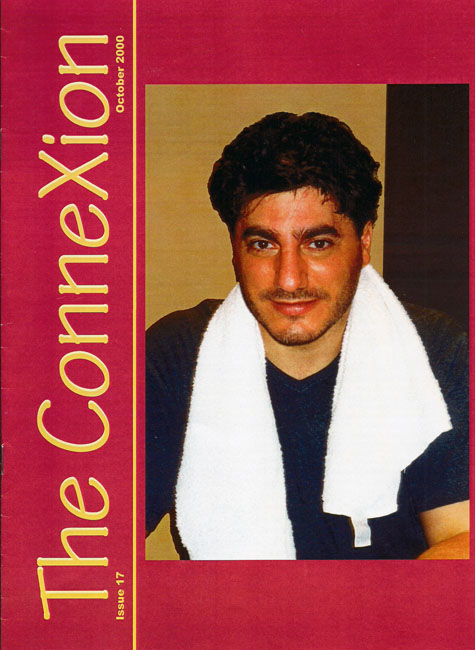 JA:
Would you like to conduct a live opera performance?
JA:
Would you like to conduct a live opera performance?
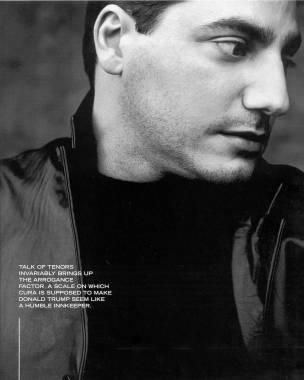 Rejection
can be an awfully sharp kick in the old hindquarters. José Cura’s
long-awaited debut at The Metropolitan Opera last September did not
produce the kind of critical accolades that signal what many in this
tenor-starved world had been praying for: a worthy successor to Placido
Domingo and Luciano Pavarotti. Depending on which reports you believe,
both those singers are now either near, at, or just over the age of 60.
Who to fill their grande pantaloni in the bread-and-butter
Italian repertoire of Verdi, Puccini and such verism warhorses as
Andrea Chenier, Pagliacci, and Cavalleria Rusticana?
Rejection
can be an awfully sharp kick in the old hindquarters. José Cura’s
long-awaited debut at The Metropolitan Opera last September did not
produce the kind of critical accolades that signal what many in this
tenor-starved world had been praying for: a worthy successor to Placido
Domingo and Luciano Pavarotti. Depending on which reports you believe,
both those singers are now either near, at, or just over the age of 60.
Who to fill their grande pantaloni in the bread-and-butter
Italian repertoire of Verdi, Puccini and such verism warhorses as
Andrea Chenier, Pagliacci, and Cavalleria Rusticana?
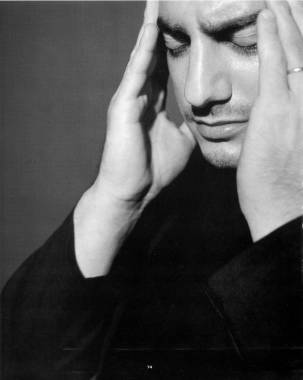 “When
I was 22, the same question was posed to me about getting married,” he
replies. “ ‘Why don’t you postpone your marriage until you’re 27 or 30?’
Because I felt the necessity of getting married when I was 22.”
“When
I was 22, the same question was posed to me about getting married,” he
replies. “ ‘Why don’t you postpone your marriage until you’re 27 or 30?’
Because I felt the necessity of getting married when I was 22.” 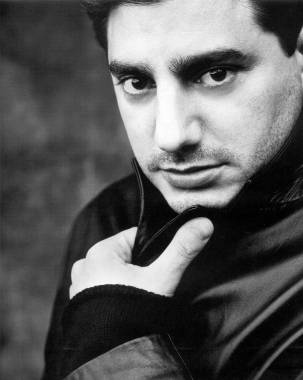 Will
he repeat the feat?
Will
he repeat the feat? 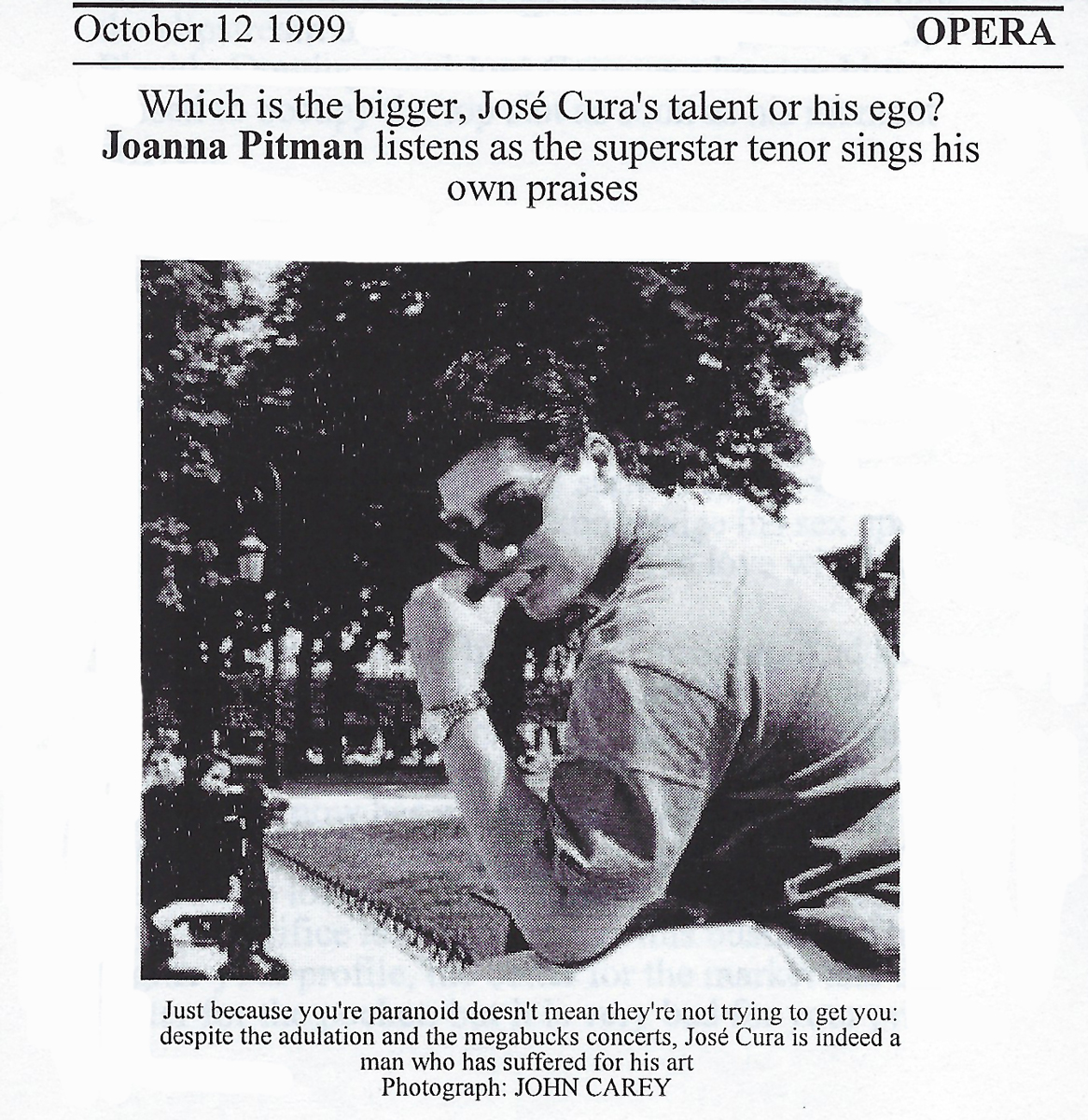
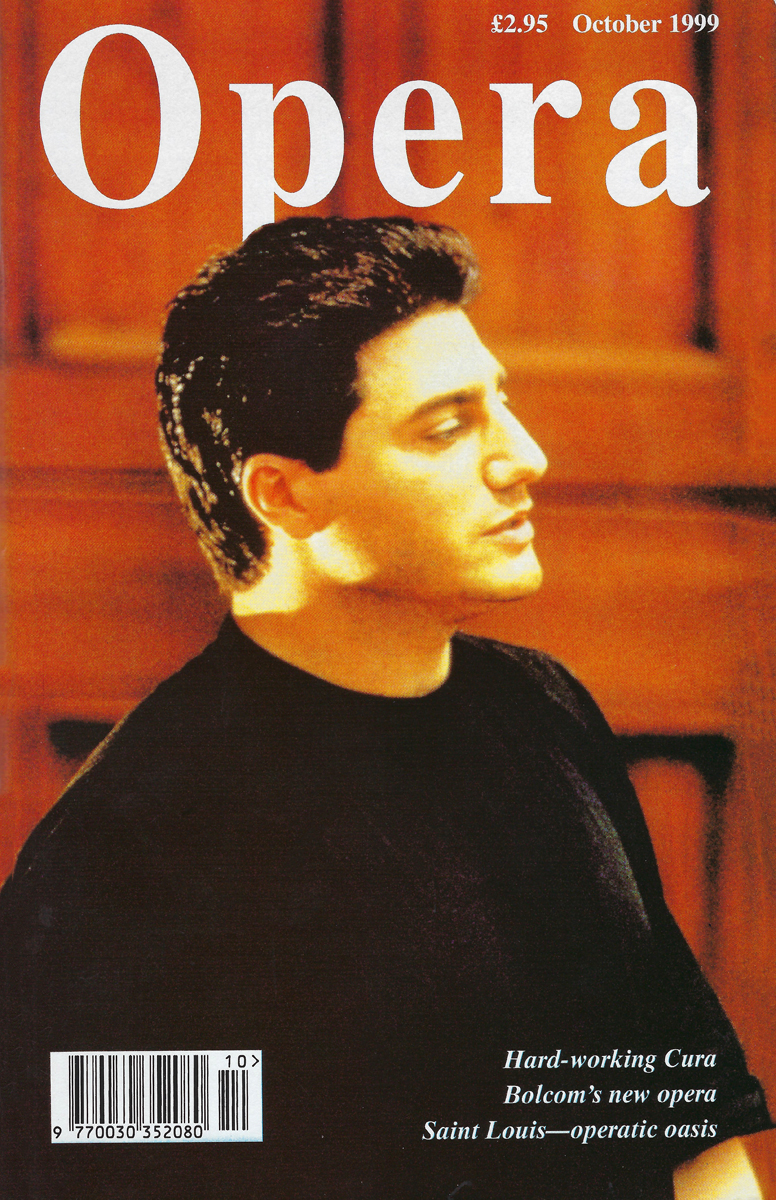
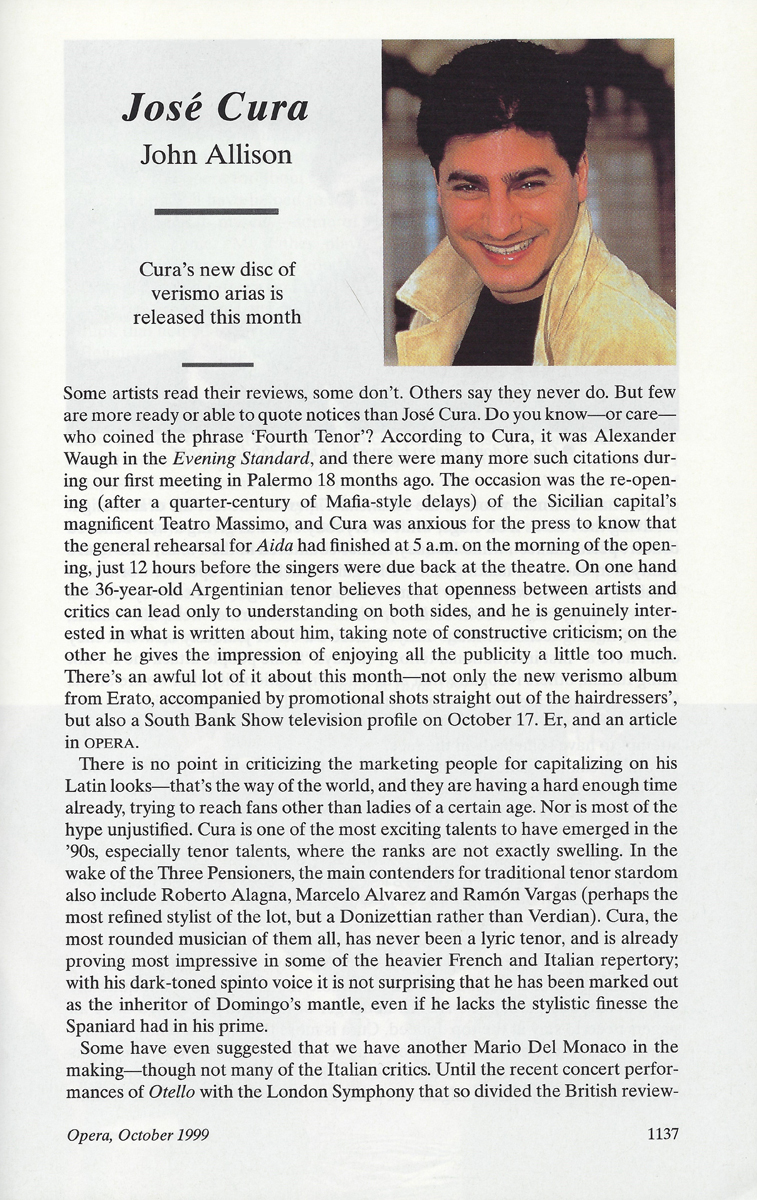
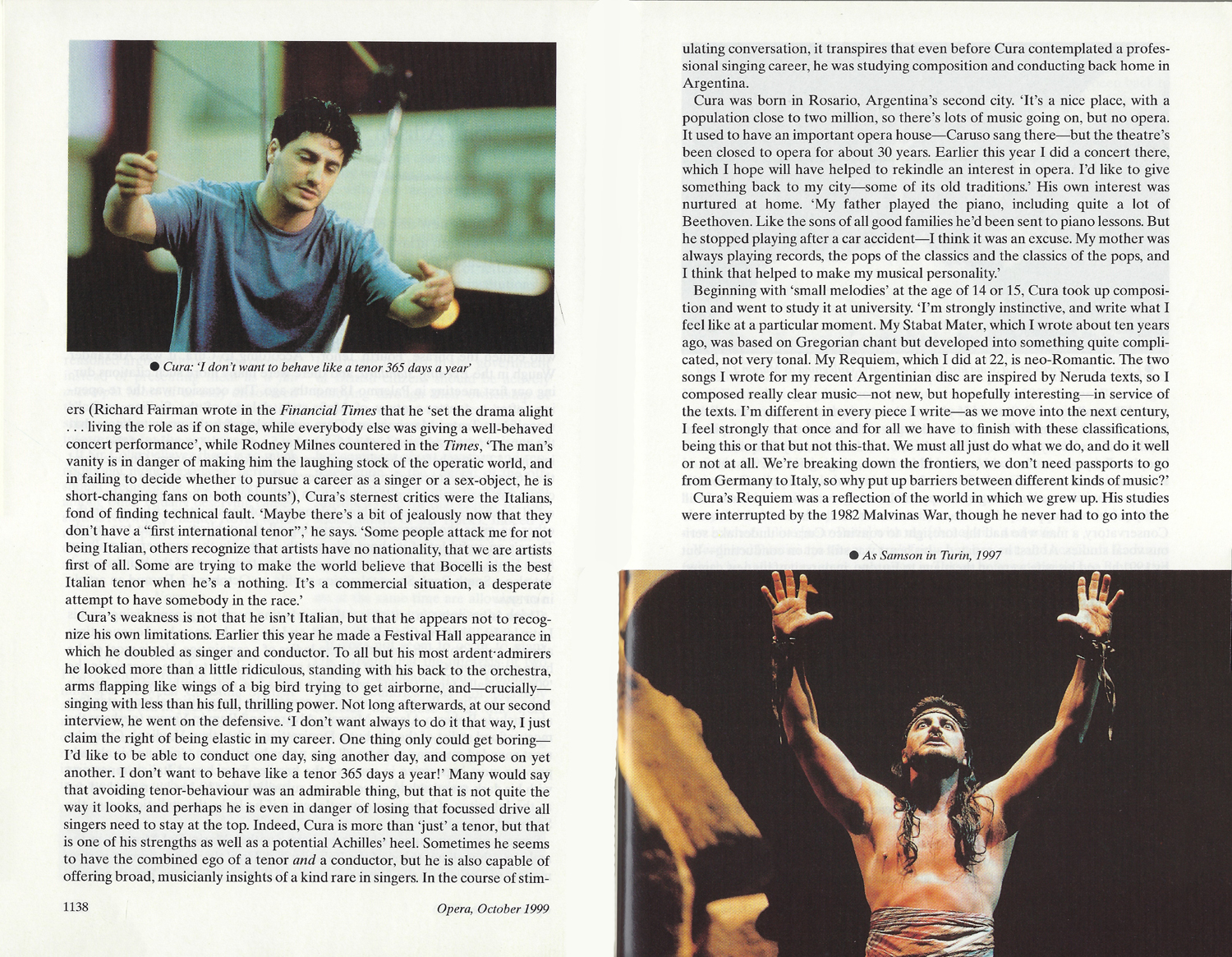
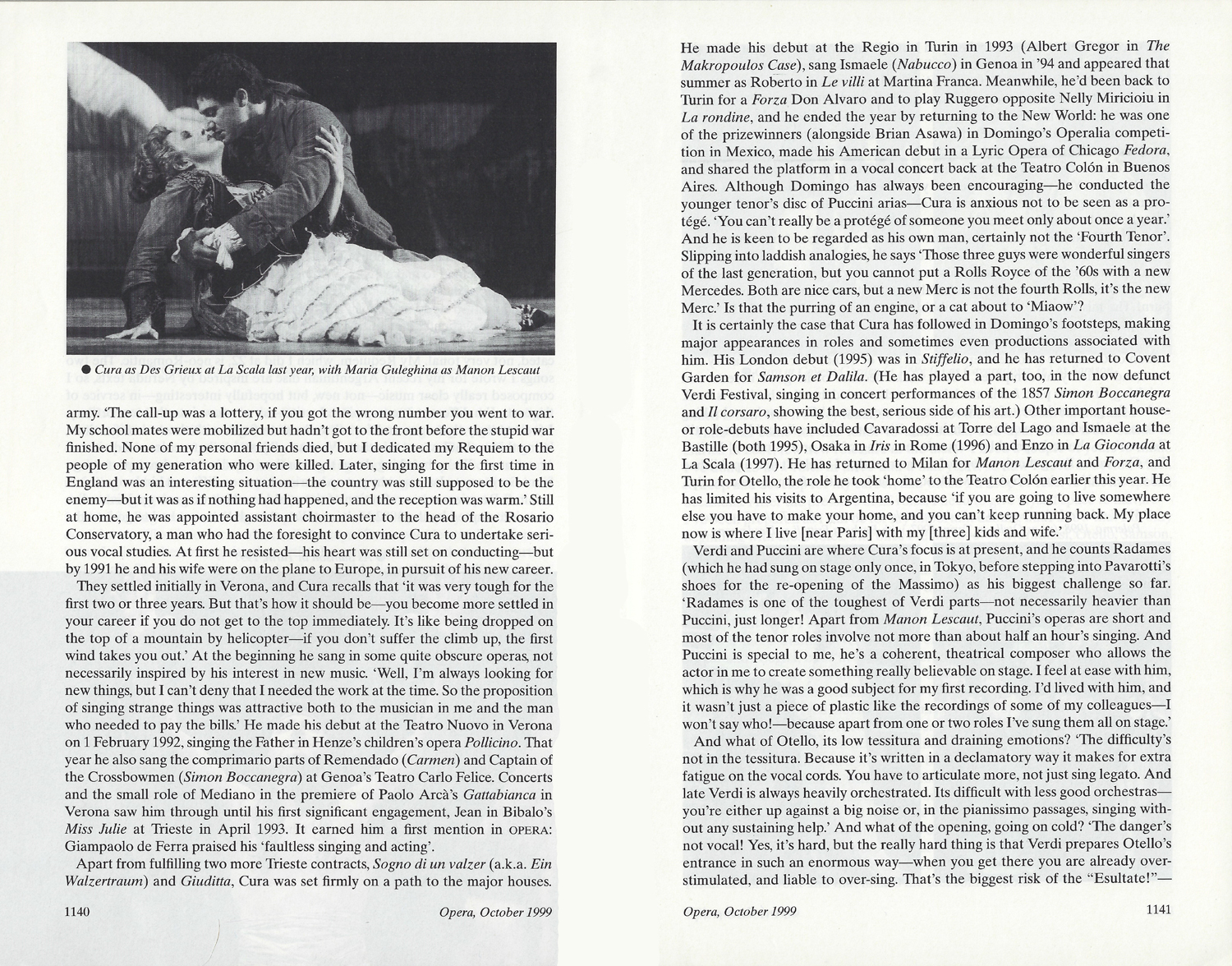
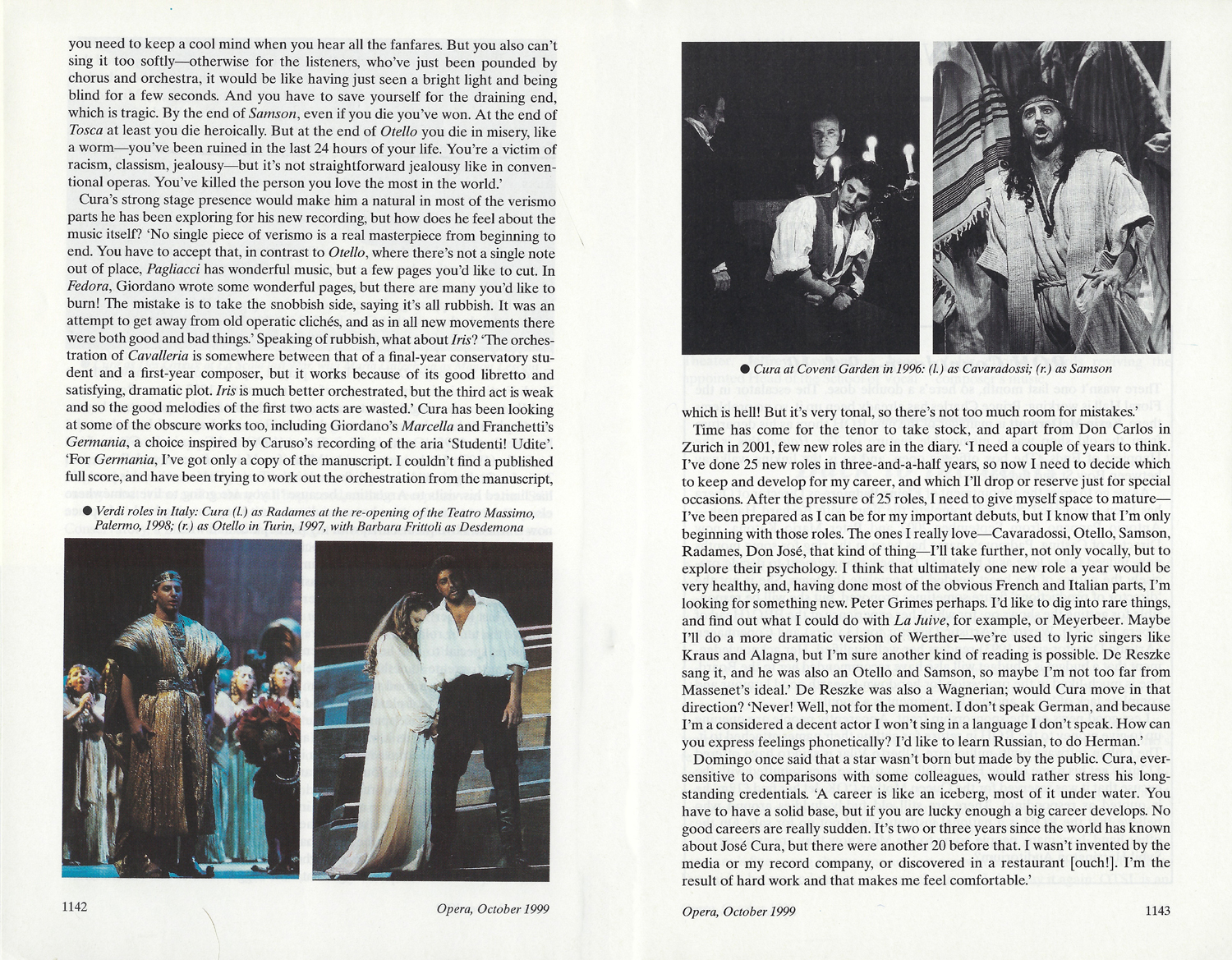
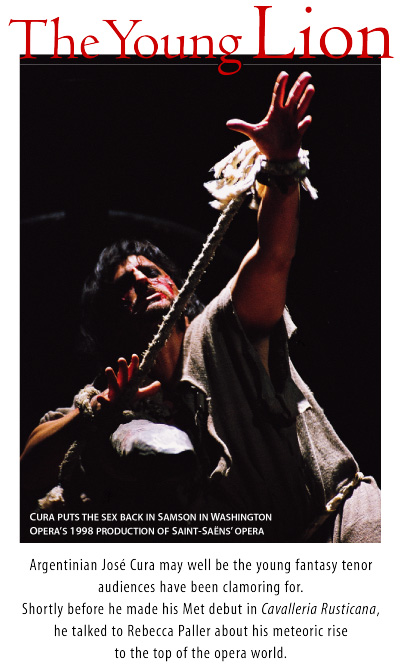 The
first time I saw José Cura was last November, in Washington. A new
production of Samson et Dalila at Washington Opera had begun with
the chorus lying flat on the raked stage, then turning over in unison
(like bacon self-turning in the frying pan), standing up and sitting
down again. When they sat, there he was -- a towering vision in
white, stunningly handsome, with a build like a Colossus, and exuding
that quality so rare on the opera stage today -- charisma.
The
first time I saw José Cura was last November, in Washington. A new
production of Samson et Dalila at Washington Opera had begun with
the chorus lying flat on the raked stage, then turning over in unison
(like bacon self-turning in the frying pan), standing up and sitting
down again. When they sat, there he was -- a towering vision in
white, stunningly handsome, with a build like a Colossus, and exuding
that quality so rare on the opera stage today -- charisma.